NFL Week 8 Recap: Immediate fantasy football takeaways from Sunday’s games

• Tight ends shine on National Tight End Day: Mark Andrews, Tyler Conklin, Tucker Kraft, Sam LaPorta, David Njoku and Brock Wright all scored touchdowns in the early window to celebrate, while Cade Otton and Kyle Pitts found the end zone twice each in the same game.
• Calvin Ridley rebounds: The Tennessee Titans wide receiver only caught five passes in his last four games but shined with 10 passes for 143 yards on Sunday. Most of his work came early in the game.
• Unlock your edge with a PFF+ subscription: Get full access to all of our in-season fantasy tools, including weekly rankings, the Start-Sit Optimizer and more. Sign up now!
PFF’s fantasy football recap focuses on player usage and stats, breaking down all the vital information you need to achieve fantasy success in 2024.
Philadelphia Eagles @ Cincinnati Bengals
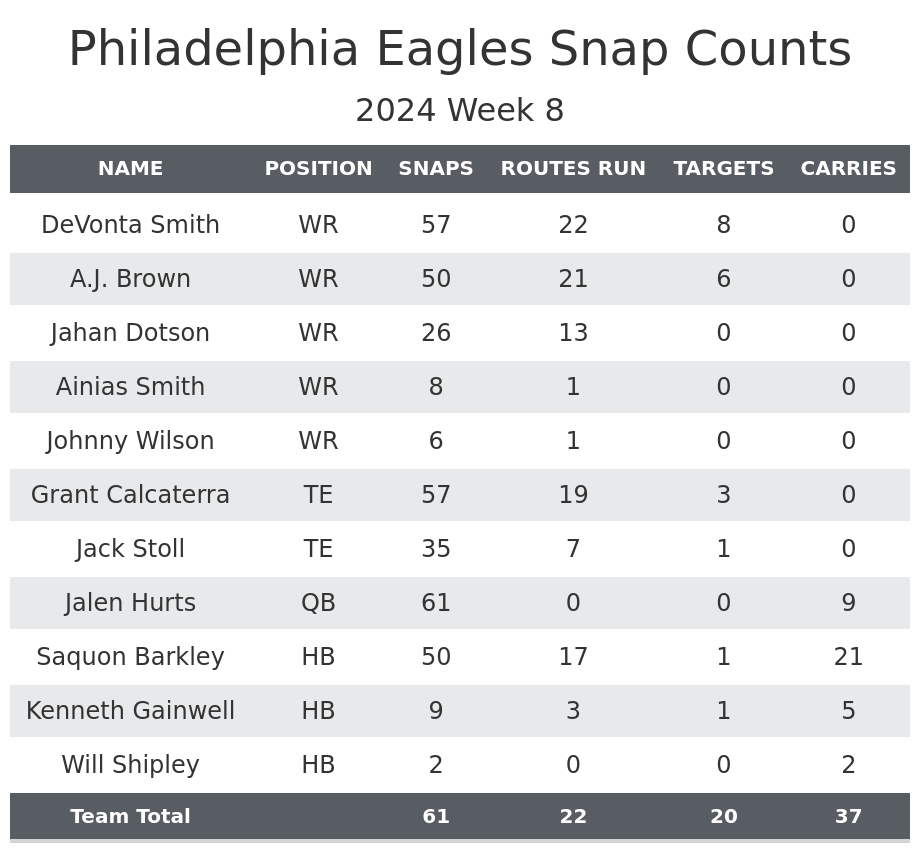
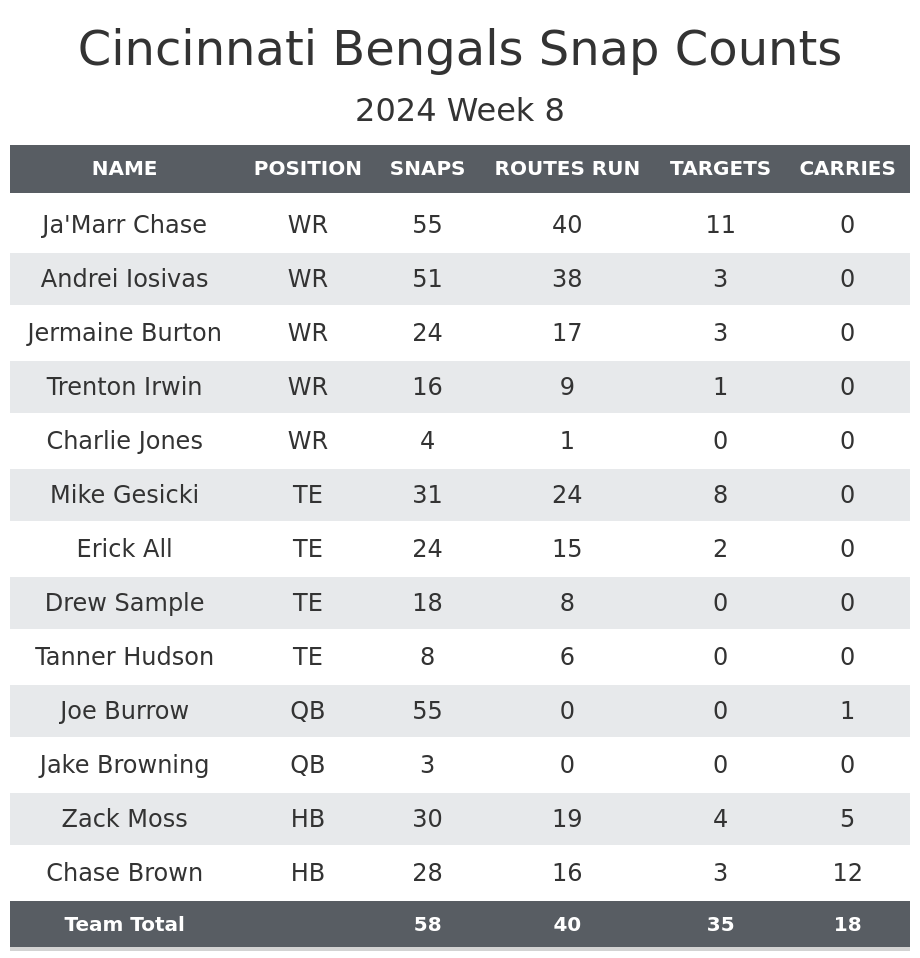
Bengals adjust without Tee Higgins: The Bengals star wide receiver suffered a quadricep injury on Friday during practice and was ultimately inactive.
The Bengals didn’t have Higgins during the season’s first two weeks. Ja’Marr Chase and Andrei Iosivas were the primary outside receivers, while Trenton Irwin was the slot receiver. Over the last five weeks, Iosivas moved into the slot over Irwin, while Higgins was an outside receiver.
This week, with Higgins out, the Bengals instead turned primarily to rookie Jermaine Burton for most three-receiver sets. Irwin still played significant snaps but with more run plays mixed in. Burton had only caught one pass for 47 yards over the first seven weeks and followed that up with a 41-yard reception in this game.
Chase had been playing more in the slot this year than in past years, and in this game, he was the primary slot receiver. Chase has generally had more production from the slot on a per-play basis in his career, which remains true this season. We may continue to see Chase lining up in the slot more often, regardless of whether Higgins is healthy or not.
The injury also meant more playing time for Mike Gesicki, as the Bengals used more 12 personnel snaps with Gesicki on the field than usual. Gesicki led the team in receiving yards with 73. He similarly had a great game in Week 2 with 91 yards without Higgins. Gesicki is probably not worth a waiver-wire add because he only gained 24 yards over the previous four games with Higgins in the lineup.
Burton can remain on the waiver wire in most leagues since it’s unlikely he will see a high target share at any point this season. If Higgins does miss time, Burton could be considered for DFS contests or prop bets since there is always the possibility he makes multiple big plays in some game.
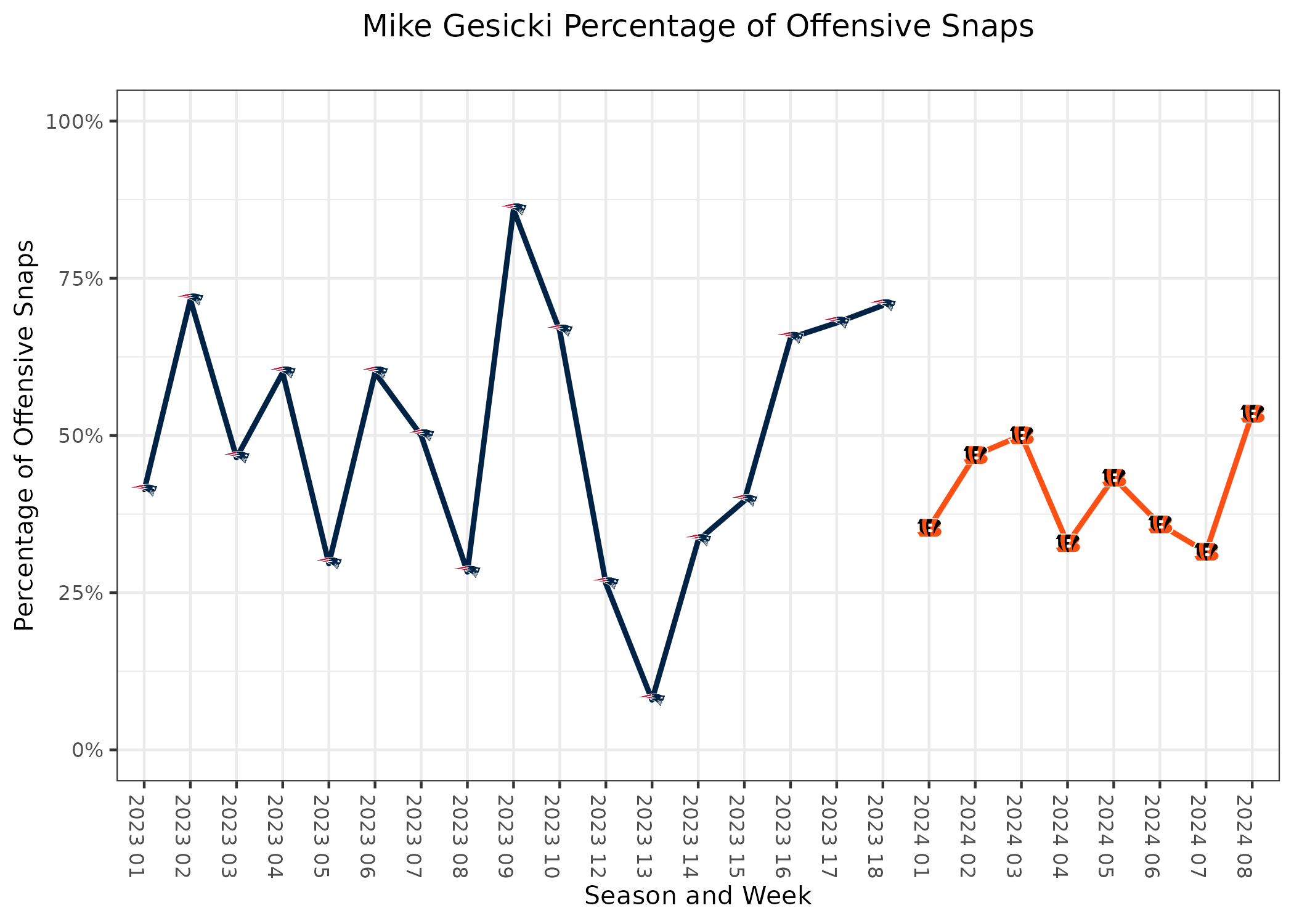
Ainias Smith makes his debut: The Eagles fifth-round rookie wide receiver was activated off injured reserve on Saturday.
He had suffered an ankle in training camp, so this was his first regular season game. DeVonta Smith and A.J. Brown remained the clear primary receivers, while Jahan Dotson joined in three-receiver sets. Ainias Smith was the primary backup slot option, while Johnny Wilson was the primary option out wide.
DeVonta Smith is the Eagles’ primary slot receiver, but so far this season, he’s played better out wide. He has 2.55 yards per route run out wide compared to 1.86 in the slot. In earlier seasons, he was better in the slot. It’s at least possible that Ainias Smith could play more snaps going forward simply to allow DeVonta Smith to play more snaps out wide. Dotson was not targeted in this game and hasn’t gained more than 11 yards in a game this season, so it’s also possible that Ainias Smith will start playing more if he becomes more effective than Dotson.
Miscellaneous Notes
- The Bengals continued their trend of using Chase Brown more on early downs, but because of the game script, they ended up using their receiving back Zack Moss for more snaps this game.
- Bengals fourth-string tight end Tanner Hudson played eight snaps in this game, and his playing time steadily increased after missing most of September and early October. His emergence also makes it less likely an effective fantasy tight end will emerge out of Cincinnati this season.
- Dallas Goedert missed another game due to a hamstring injury. Like the last two weeks, Grant Calcaterra was his clear replacement. He caught three passes for 58 yards and would be again worth considering if Goedert continues to miss time.
Baltimore Ravens @ Cleveland Browns
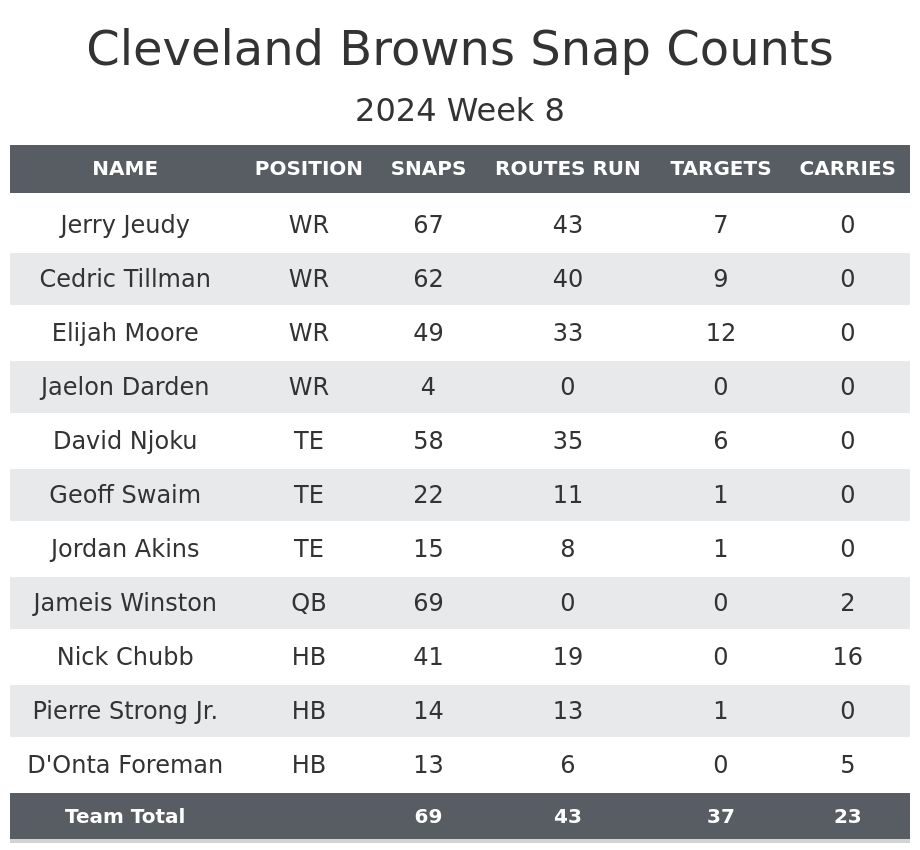
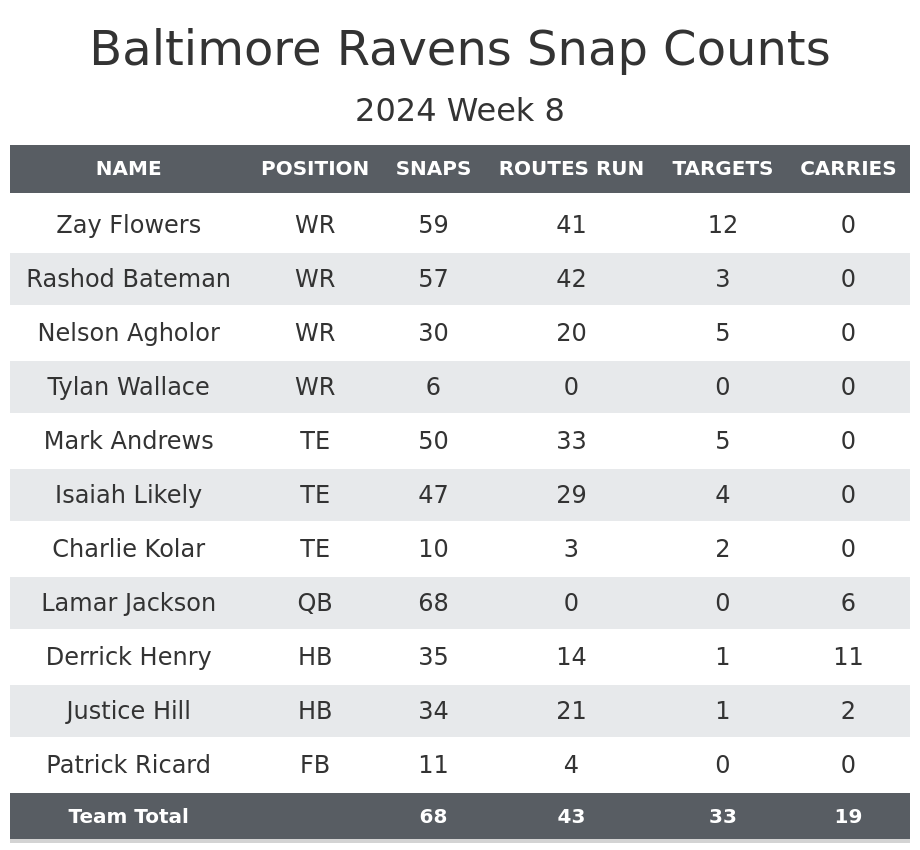
Nick Chubb takes a larger role in his second game back: Chubb ran the ball 16 times for 52 yards as the Browns’ clear lead running back.
Last week, Chubb split the early down snaps pretty evenly with Pierre Strong Jr. and Jerome Ford, but Chubb often ran the ball when he was on the field. This week, Chubb was on the field a lot more often. He played a clear majority of Cleveland’s early-down snaps. Most notably, he took the two-minute drill snaps, which hadn’t always been the case in Chubb’s career, even when he was 100%.
He wasn’t very effective in this game, but the Ravens had only allowed 3.3 yards per carry over the first seven weeks. Chubb also averaged 3.3, so he wasn’t different from the average running back facing Baltimore. The only concern is that Jerome Ford missed the last two games, and he may cut into Chubb’s playing time once he’s healthy again.
Chubb could be considered a buy-low candidate, but it might be worth waiting a week or two before trying to trade for him. The Browns face the Los Angeles Chargers, who have also been good against the run next week, and then Cleveland has its bye week. It might be easier to trade for him later, but his role suggests he should be a top-20 running back over the last third of the season.
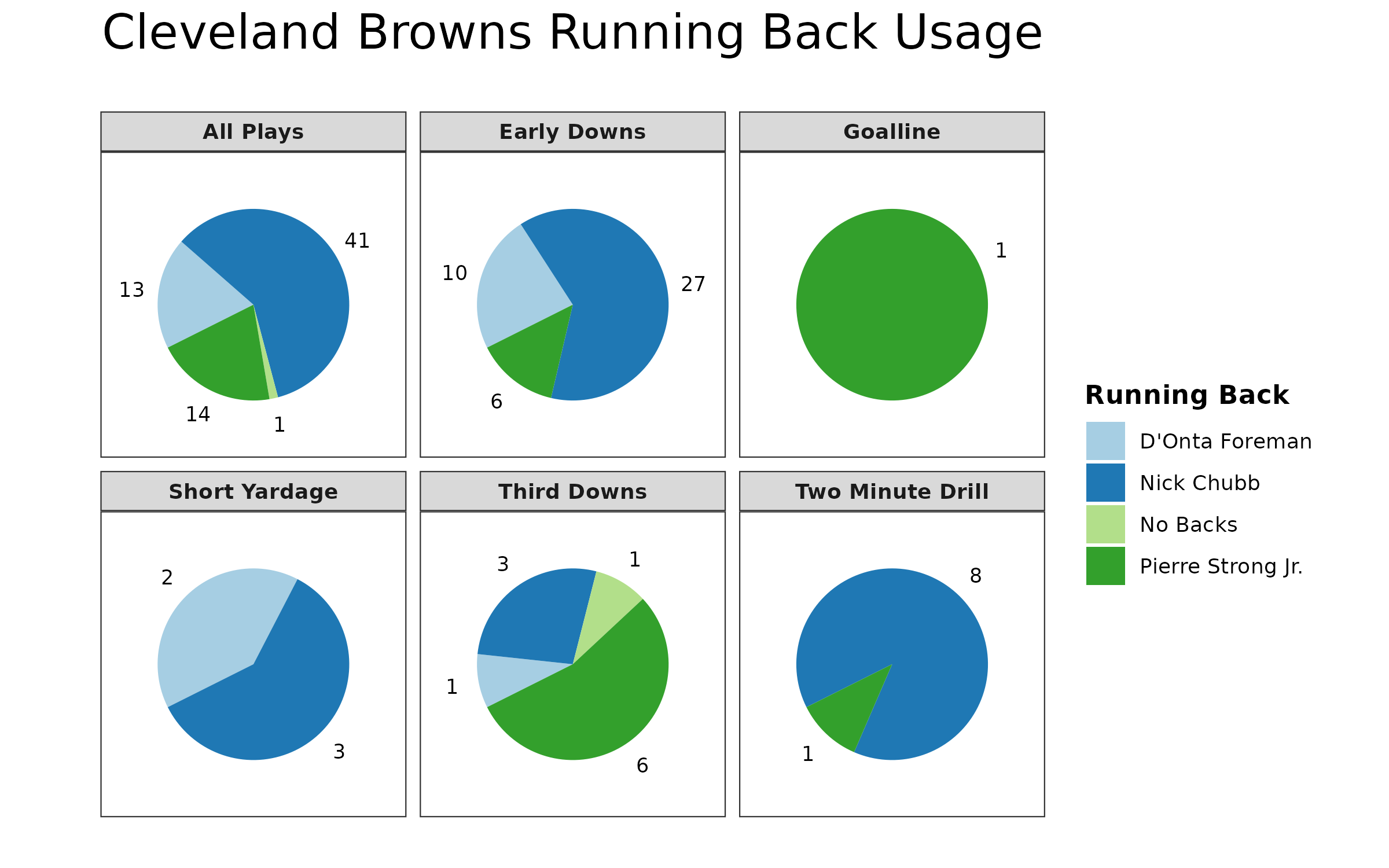
Cedric Tillman takes another step forward: The second-year receiver again led the Browns in receiving.
Tillman spent most of the season as the team’s clear fourth wide receiver, but that changed after the Amari Cooper trade. Last week, he was a clear starter but still rotated out on 11 pass plays. This week, he played an even higher percentage of the Browns’ offensive snaps and was only off the field for three pass plays. He has largely taken Cooper’s role as the clear X receiver.
All three Browns wide receivers had a high target share, but Tillman was the most effective thanks to two long touchdowns. The change at quarterback to Jameis Winston should help the Browns’ passing game play much better than it did earlier in the season. Tillman was a speculative waiver-wire target last week, but after back-to-back great games, he should be one of the top waiver-wire targets this week in any league where he’s still available.
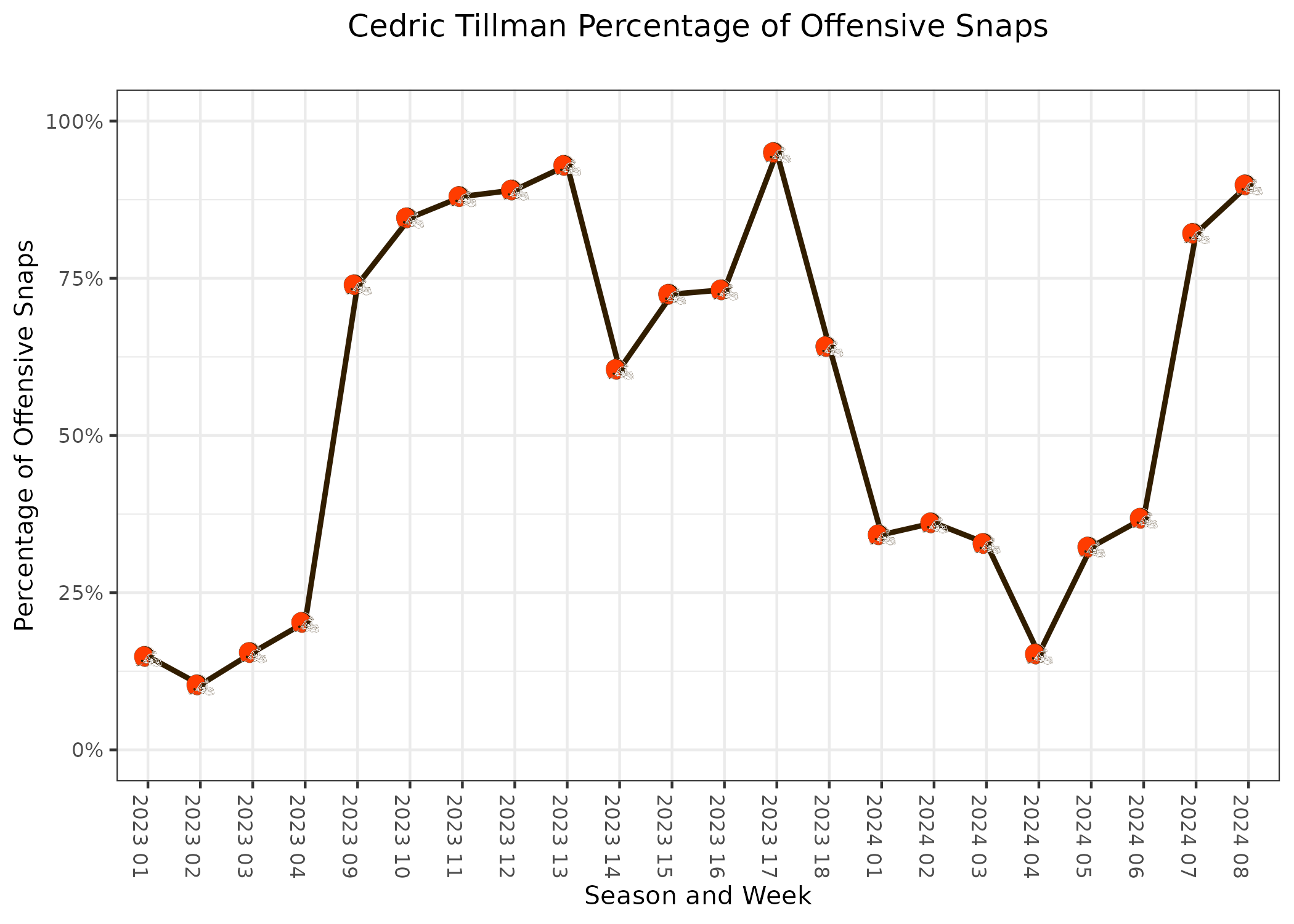
Mark Andrews’ increased usage tied to game script: The Ravens continued using their tight ends similarly to the rest of the season.
Andrews continued to play a majority of Baltimore’s 11 personnel snaps, all of the 12 personnel snaps, some of the 21 personnel snaps, and none of the 22 personnel snaps. This week, he played a slightly higher percentage of 11 personnel snaps than usual.
The Ravens defense, in general, hasn’t played well recently, which has meant more games recently where Baltimore didn’t have a lead very often, so Andrews’ playing time steadily increased. When accounting for the game script, the Ravens haven’t significantly changed how Andrews is being used.
The difference in this game is the Ravens never played an offensive snap with a lead. Typically, they are using 21 or 22 personnel on 47% of their snaps when they have a lead compared to 17% when they are playing from behind, and this is a game where they were consistently playing from behind, so Andrews was on the field.
The Ravens only face two more teams with a losing record during the fantasy season, one of them being the Cincinnati Bengals, who they beat in overtime earlier this season. Andrews’ fantasy value over the rest of the season will largely depend on if the defense improves or if it keeps allowing 23-plus points per game.
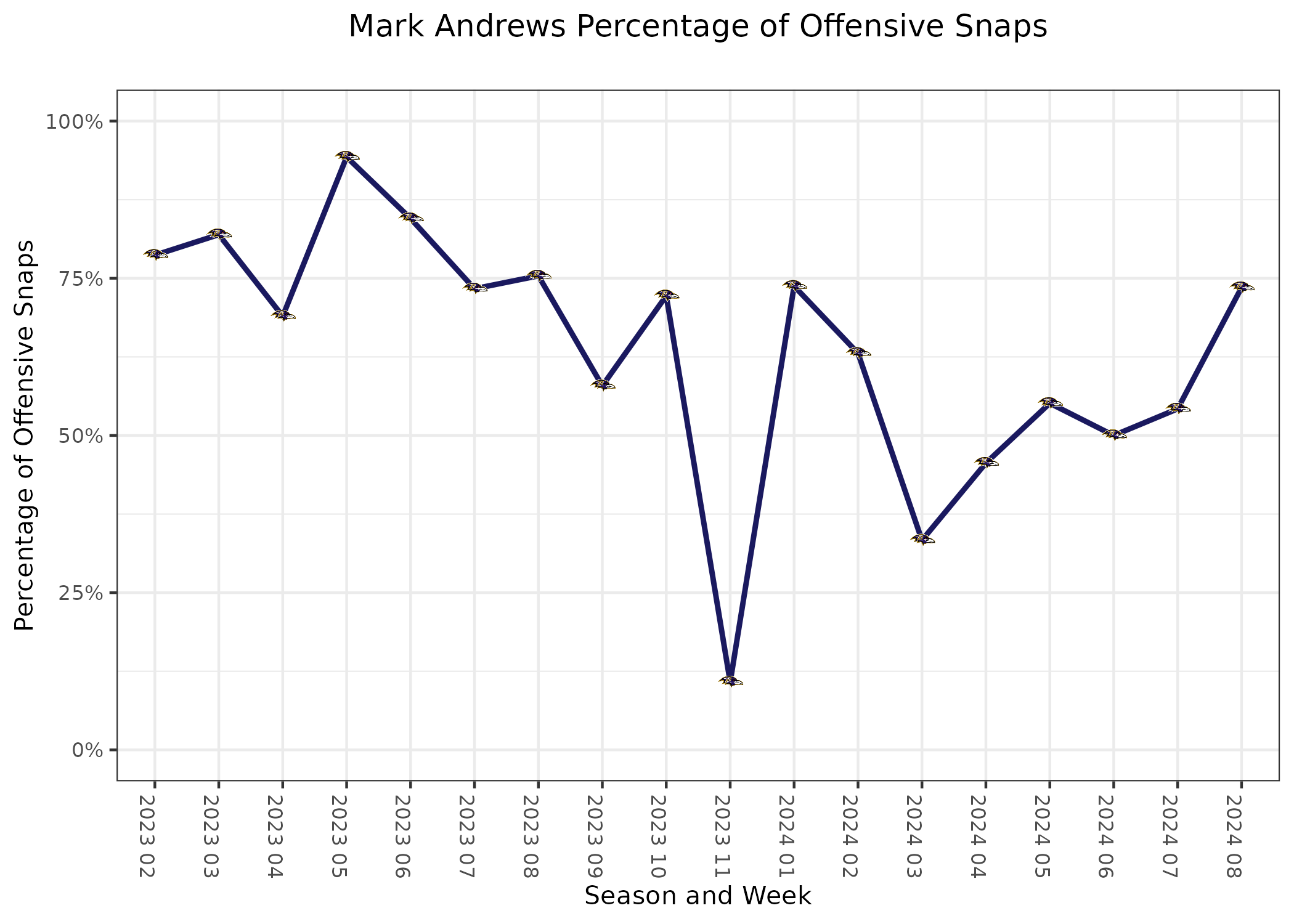
Miscellaneous Notes
- The Ravens opened the practice window for running back Keaton Mitchell. He was not activated for this game but should be in the next two weeks.
- Zay Flowers was questionable for this game due to an ankle injury, but that had no impact on his playing time or production.
- David Njoku had his second-straight game with over 60 receiving yards and a touchdown. For the third straight season, his per-game stats have been much better in games without Deshaun Watson than in games with him. This should make him one of the top few tight ends over the rest of the season.
Tennessee Titans @ Detroit Lions
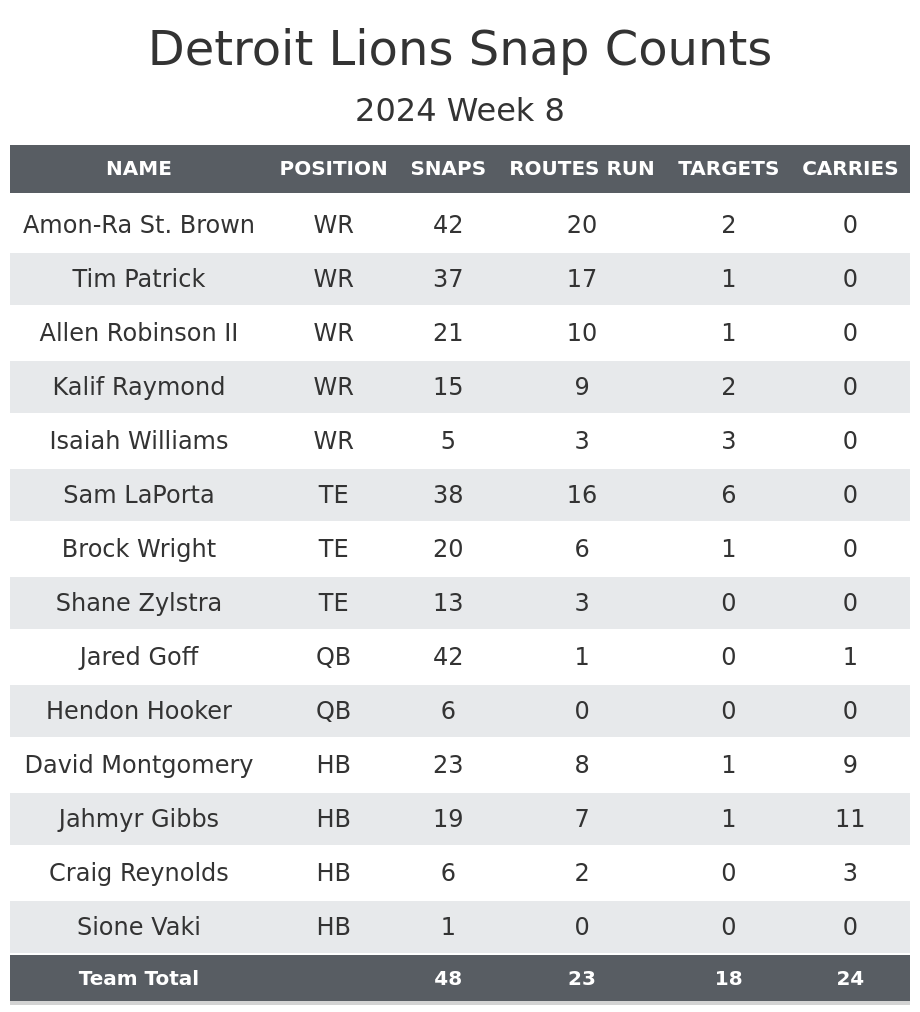
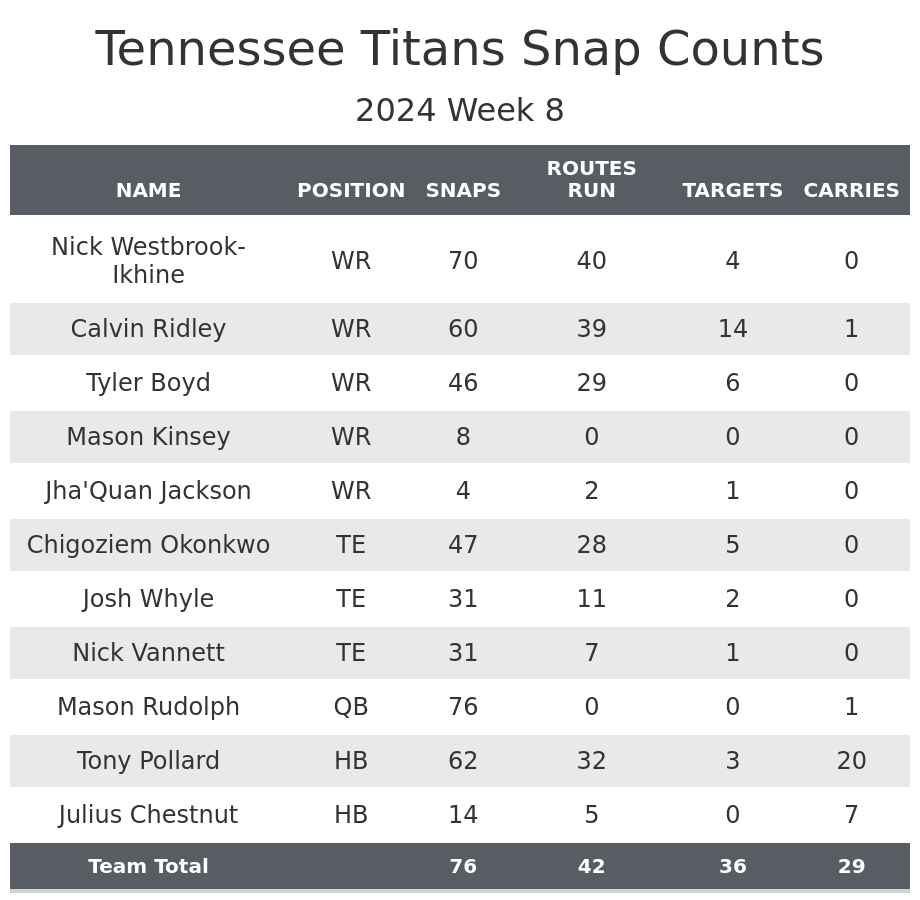
Titans adjust without DeAndre Hopkins: Tennessee traded the future Hall of Fame wide receiver to the Kansas City Chiefs earlier in the week.
The Titans spent most of the season rotating their wide receivers significantly — Calvin Ridley, Hopkins and Treylon Burks all rotated. Burks is on injured reserve, so Ridley rarely left the field. Nick Westbrook-Ikhine went from fifth on the depth chart to start the season to an every-down starter.
Sixth-round rookie Jha’Quan Jackson only played three offensive snaps over the first seven weeks, but he is the new fourth wide receiver, while veteran Mason Kinsey, who had been on the practice squad, was signed to the active roster to be the fifth wide receiver. Kinsey only started playing at the very end of the game.
The Titans’ schedule to start the season was brutal for wide receivers, but it’s one of the easiest schedules over the rest of the season. This means Westbrook-Ikhine could be considered in very deep leagues for the short term. Long term, once Burks is healthy again, he should get a significant opportunity to turn his career around.
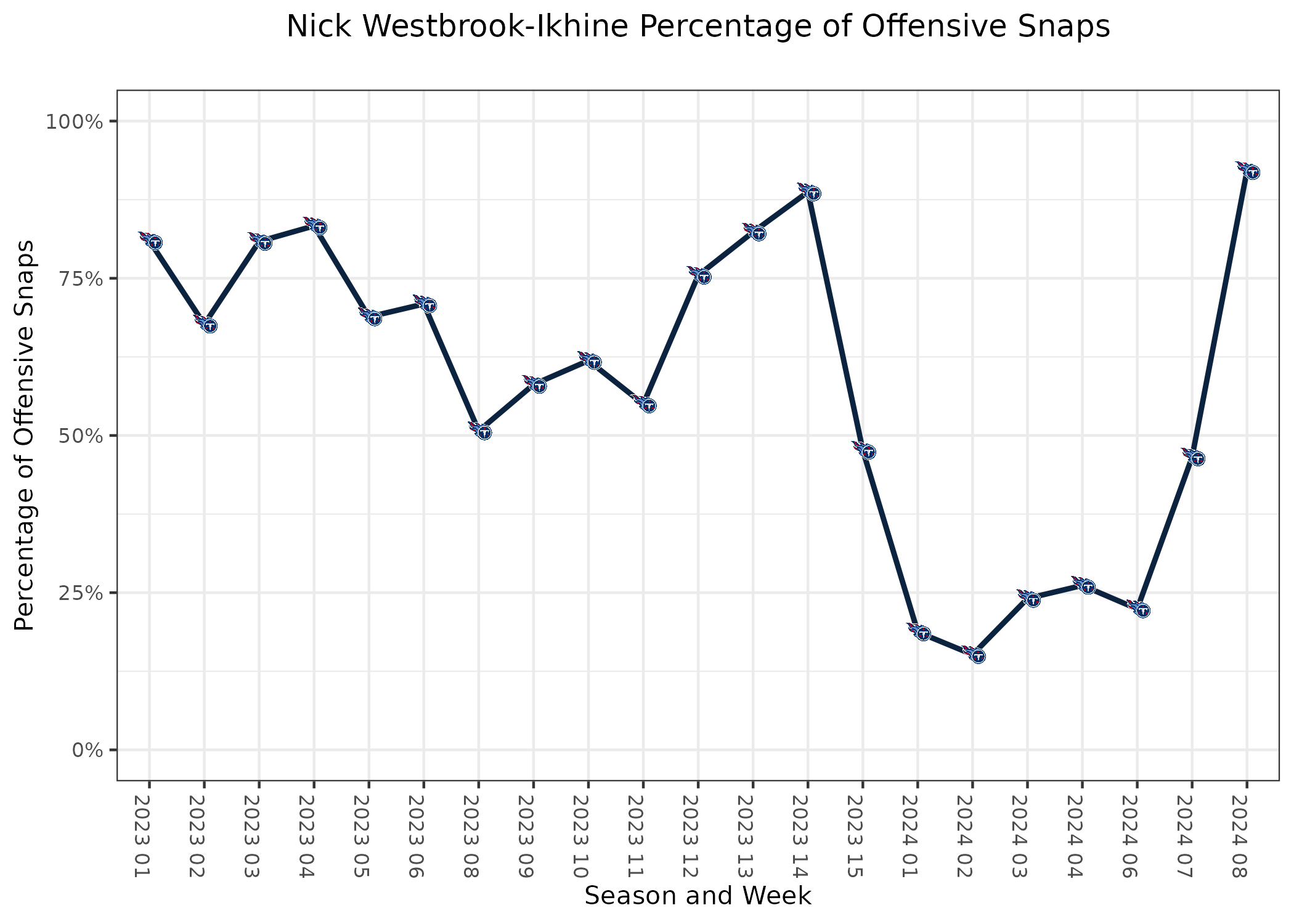
Jameson Williams begins his two-game suspension: Williams is out two games for violating the NFL’s performance-enhancing substances policy.
Amon-Ra St. Brown was the lead wide receiver as usual. Tim Patrick and Kalif Raymond were the only other wide receivers who played significant snaps this season, and there were reports Allen Robinson II would need to step up.
Patrick stepped up into a starting role and was almost always on the field when the Lions were on offense. Robinson played significant snaps in 11 personnel. While Raymond was far behind in total plays, the 5-foot-8 and 180-pound wide receiver is typically only on the field for passing plays, so he wasn’t far behind in routes run.
This barely meant anything for fantasy production in this game, as the Lions started four drives only needing 25 yards or less to score, so they rarely passed the ball. Next week against the Packers, they will need to pass more often, and Patrick is the man most likely to produce among the typical backups.
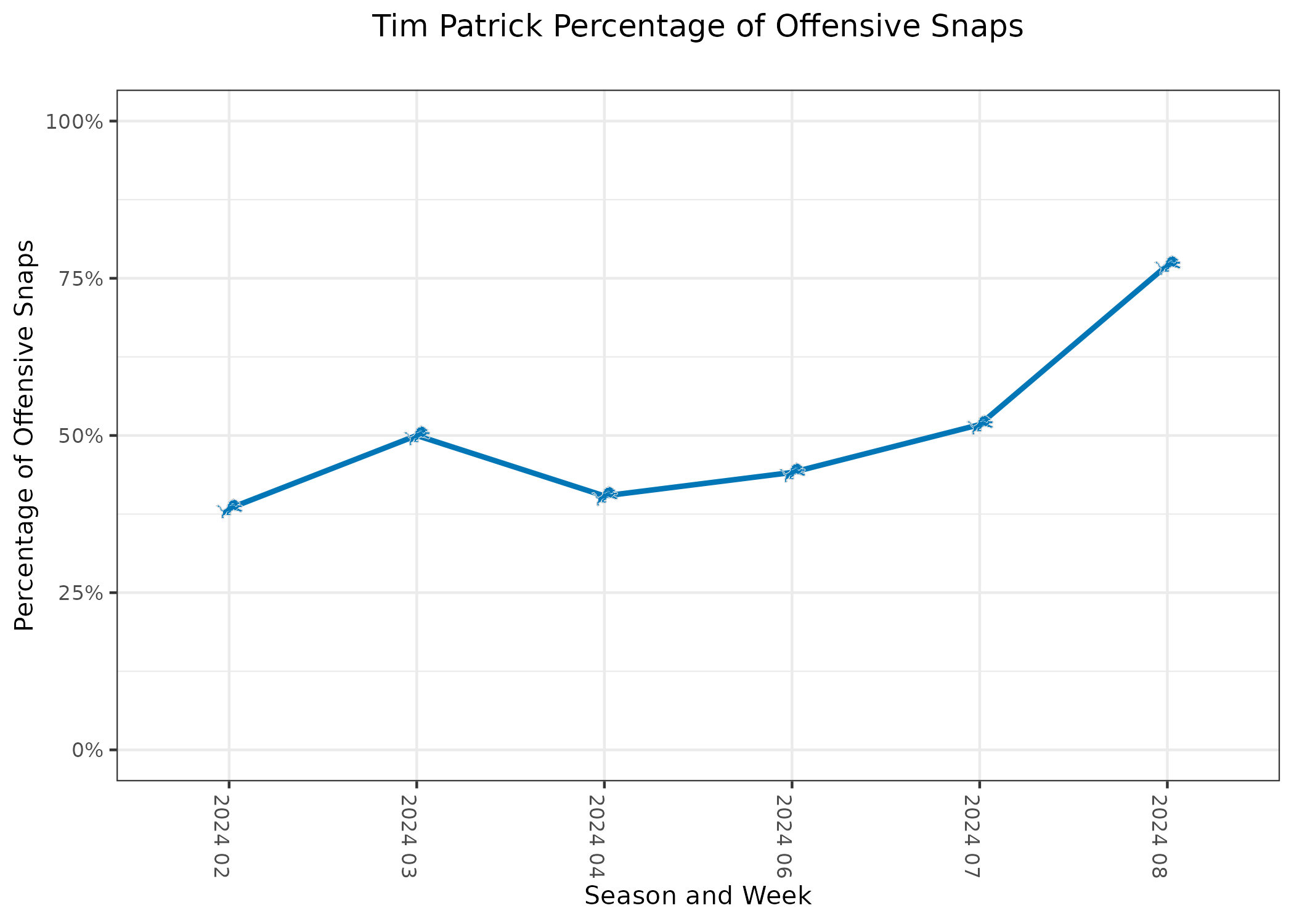
Miscellaneous Notes
- Tyjae Spears missed his second straight game due to a hamstring injury. The Titans again turned to Tony Pollard to be the feature back.
- With the game out of reach in the fourth quarter, the Titans rotated players much more frequently. Notably, Tony Pollard and Calvin Ridley were both playing at least 89% of the team’s offensive snaps over the first three quarters but only half of the snaps in the fourth quarter.
- The Lions similarly didn’t play any starters for their six plays in the fourth quarter, which meant six snaps without David Montgomery, Jahmyr Gibbs, Amon-Ra St. Brown or Sam LaPorta. All four players were in their usual roles for the first three quarters.
Indianapolis Colts @ Houston Texans
- Joe Mixon: 25 carries, 102 yards, 1 touchdown, 4 receptions, 32 yards
- Josh Downs: 4 3 receptions, 109 yards, 1 touchdown, 0 carries, 13 rushing yards
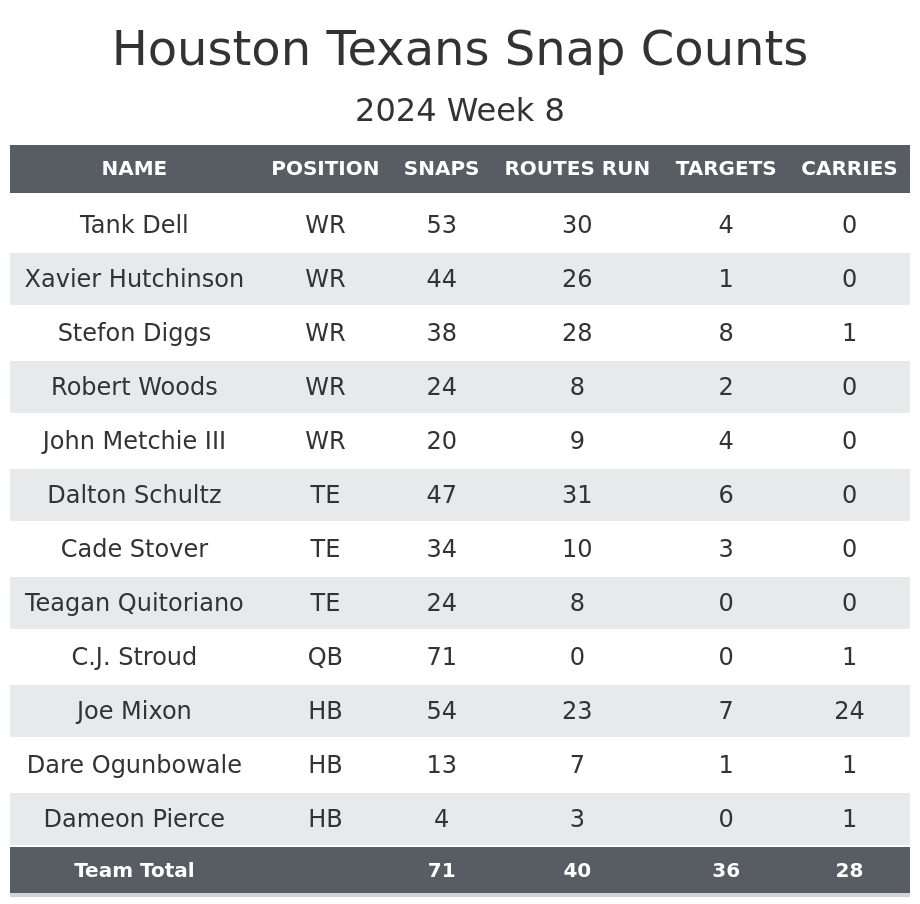
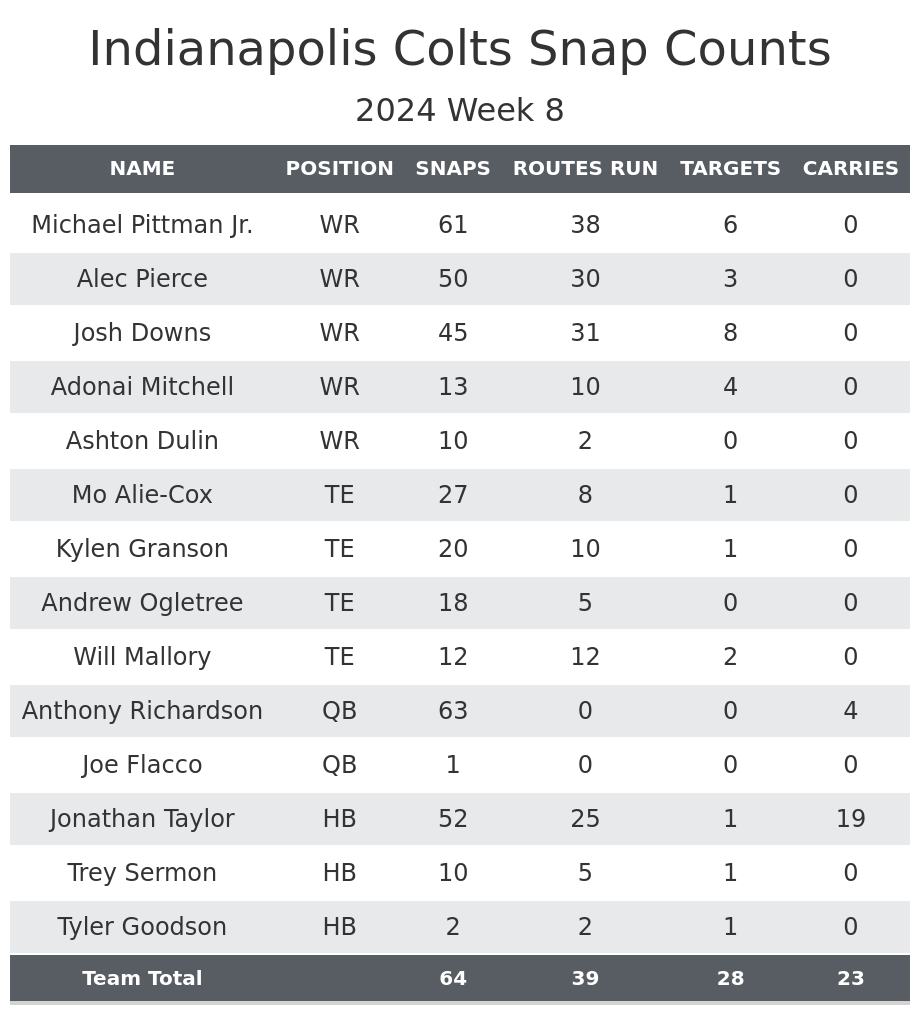
Jonathan Taylor’s big return: The Colts former All-Pro running back looked great in his first game back from injury.
Taylor missed the last three weeks due to an ankle injury. He was a full participant in practice Thursday and Friday, wasn’t given an injury designation, and the Colts released Evan Hull, who will likely return to the practice squad, which were all great indications Taylor would have a major role in this game.
He was back to playing in all of the early-down and short-yardage situations. The only time he was off the field on a first or second down was a second-and-13 early in the game, and two late fourth-quarter snaps.
Taylor was the offense’s primary focus, averaging over five yards per carry. Trey Sermon was the primary passing-down back. Taylor is back to being a must-start each week. Both Sermon and Tyler Goodson can be dropped in most leagues. Considering the two split time when Taylor is out, there are generally better handcuff options available
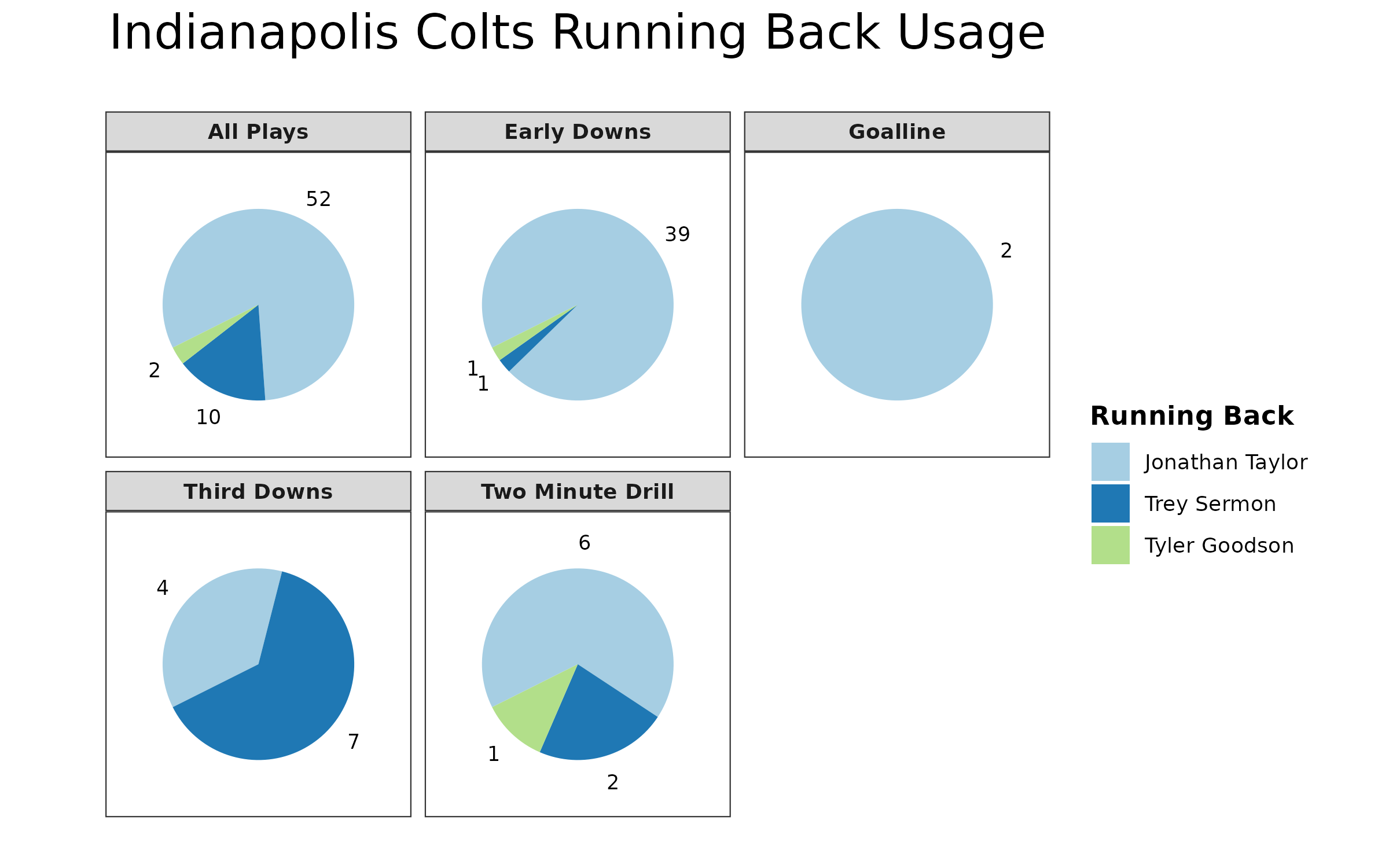
Monitor Stefon Diggs’ health: Diggs suffered a non-contact injury to his knee late in the third quarter.
He was able to walk off the field, but whenever there is a non-contact knee injury, there is concern that it will be significant.
The Texans started the game rotating their wide receivers more frequently than usual, likely due to Robert Woods‘s return, as he missed the last two weeks. Over the first nine drives, Diggs was on the field for 79.4% of Houston’s pass plays, Tank Dell was at 63.5% and Xavier Hutchinson was at 64.7% while Robert Woods and John Metchie III hit 17.6% each.
After the Diggs injury, Hutchinson’s role was unchanged. Dell wasn’t leaving the field as much, playing 100% of Houston’s 11 personnel snaps and six of 11 in 12 personnel. The combination of fewer snaps earlier in the game and more snaps in the fourth quarter left him playing 75% of Houston’s offensive snaps for the first time this season. Metchie was Diggs’ primary replacement in 11 personnel while Woods became the primary wide receiver in 12 personnel.
Nico Collins has missed three games while on injured reserve and is only required to miss one more. If Diggs misses time, this will primarily be good news for Dell. Because the Texans rotate their other wide receivers so much, it’s unlikely one will consistently produce.
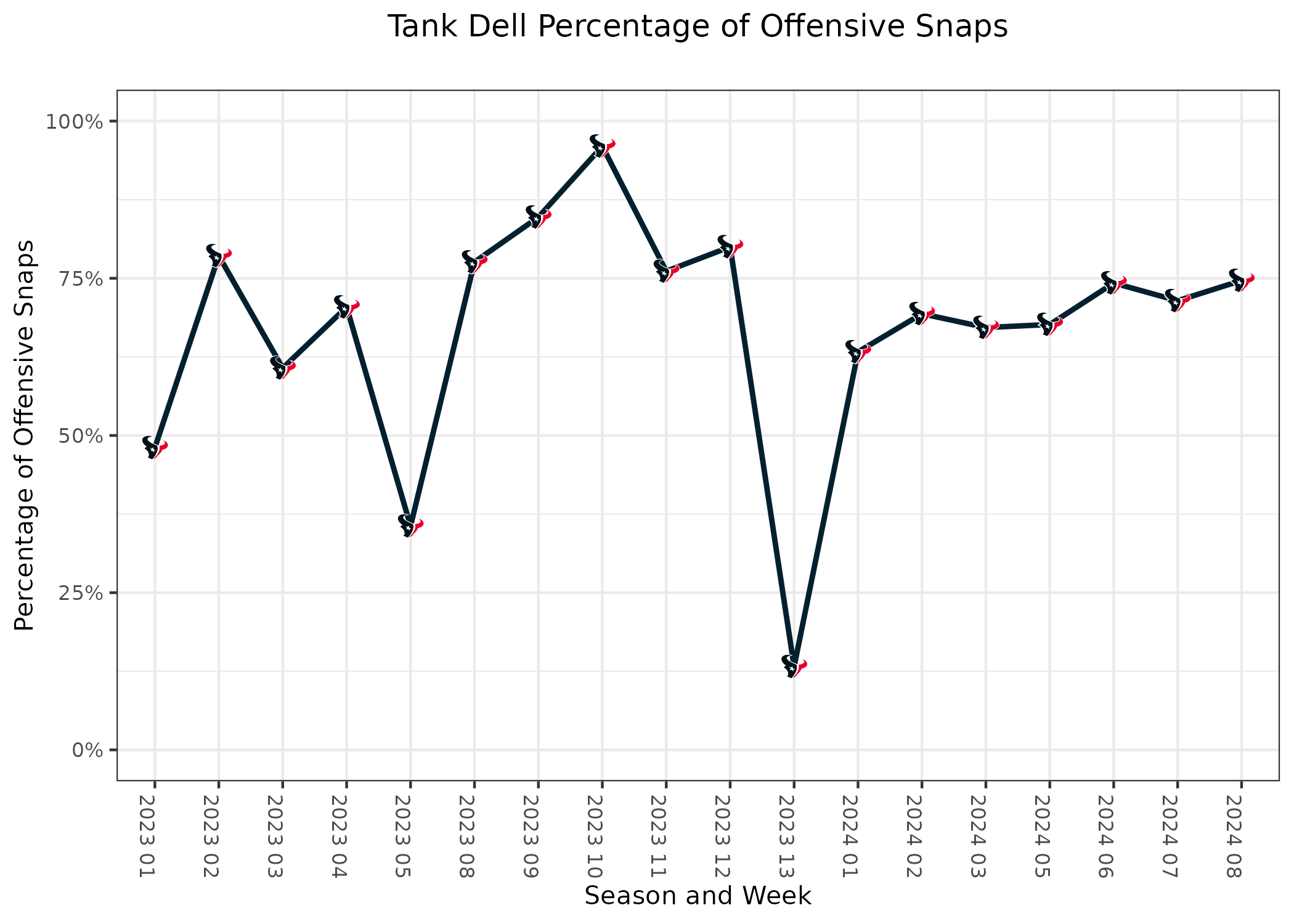
Dalton Schultz’s targets rise, but his snaps decline: Schultz has steadily gone from an every-down tight end to a rotational player.
In 2023, Teagan Quitoriano started the season as the Texans’ clear run-blocking tight end. He suffered a season-ending injury in Week 8, leading Schultz to consistently play over 75% of Houston’s offensive snaps. Quitoriano suffered an injury in the Hall of Fame game, leading the Texans to release him. After some time with the Bears practice squad, the Texans re-signed Quitoriano before Week 6.
Since then, Schultz’s playing time has declined each week. This is almost entirely in 12 personnel, as Schultz has played 95% of Houston’s 11 personnel snaps all season. Last week, Cade Stover played all 26 12-personnel snaps while Schultz played 15 and Quitoriano played 11. This week, Quitoriano’s takeover of 12 personnel snaps continued. Out of 28 plays, Stover played 27, while Quitoriano played 21 and Schultz played eight.
With the wide receiver injuries, Schultz might seem like a more attractive option, but a decrease in routes run will likely mitigate the increase in target share. The Colts allowed the third-most fantasy points to tight ends over the first seven weeks. The Texans’ next four opponents were top-10 at preventing points to tight ends. Schultz should be a sell-high option or can be dropped if no one will trade for him.
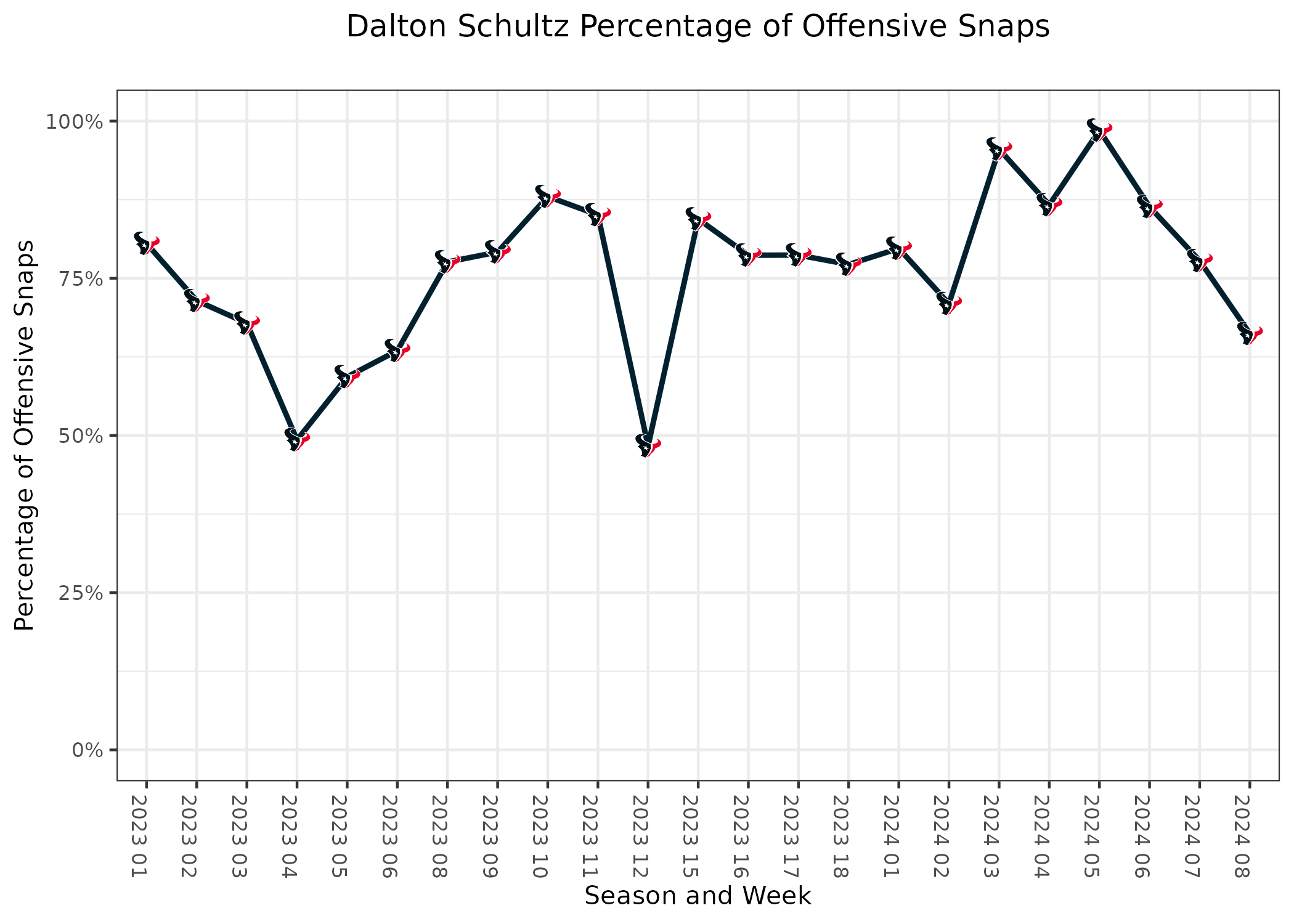
Miscellaneous Notes
- Ignoring the game when Joe Mixon suffered an injury and the one he was limited in his return from injury, he’s averaging 30 touches per game.
- Colts’ rookie wide receiver Adonai Mitchell has seen his playing time decline slightly each week. His targets per route are a ridiculous 46.2% over the last four games and his 2.21 yards per route run are the best among the wide receivers on the team. He caught one of his four targets for nine yards in this game.
- Colts fourth-string tight end Will Mallory led his position in routes and targets.
Green Bay Packers @ Jacksonville Jaguars
- Josh Jacobs: 25 carries, 127 yards, 2 touchdowns, 1 reception, -2 receiving yards
- Tucker Kraft: 3 receptions, 78 yards, 1 touchdown
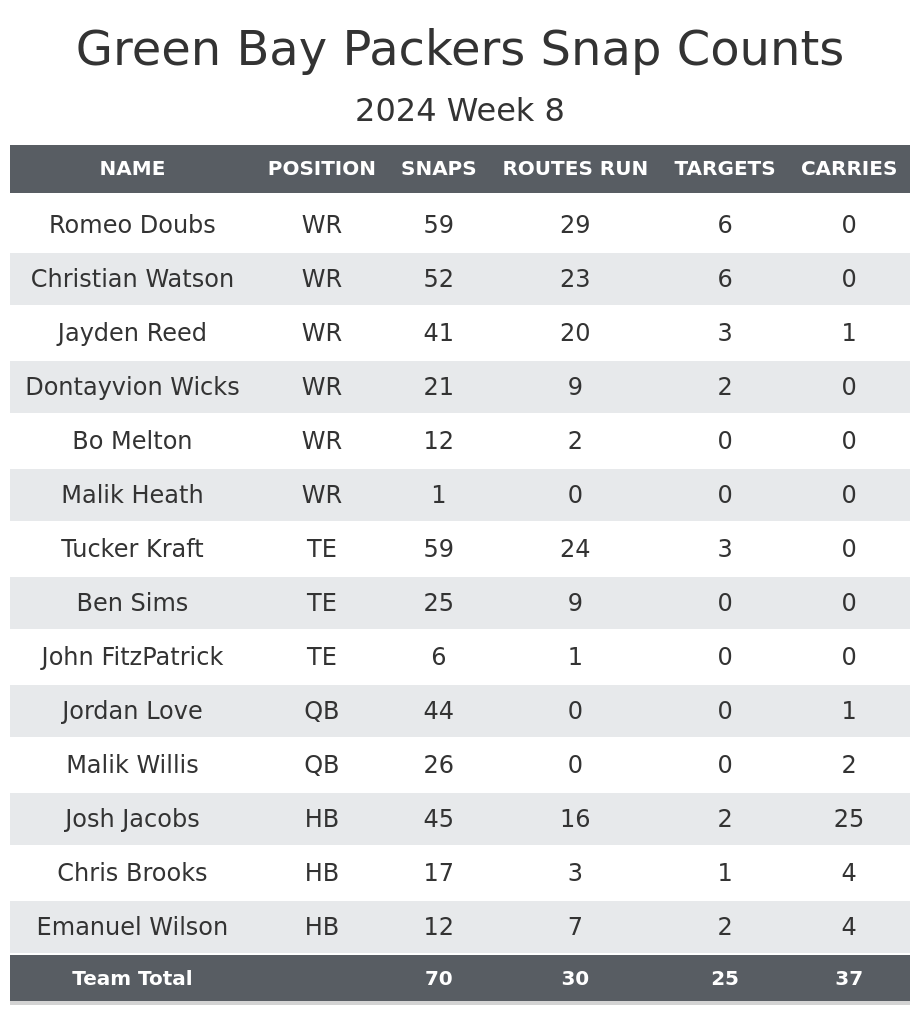
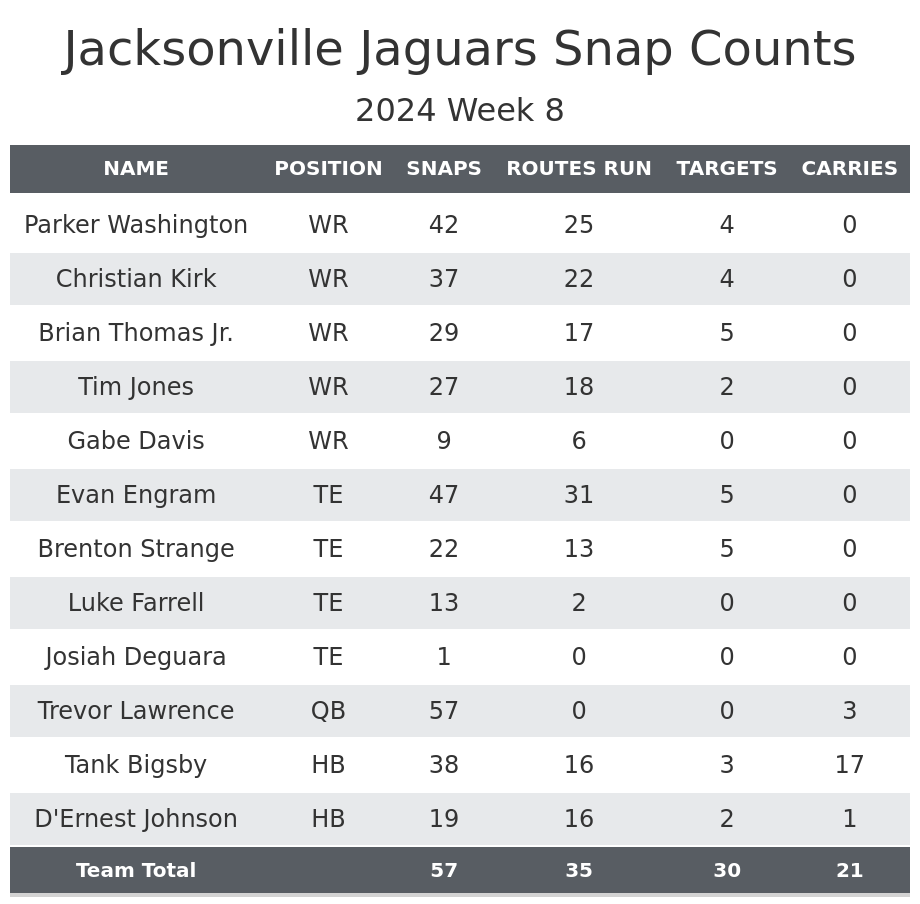
Christian Watson sets season high in snaps: Watson and Dontayvion Wicks were near-even in snaps last week, but Watson dominated the rotation this week.
Throughout the season, Romeo Doubs has been one outside receiver and Jayden Reed has played almost exclusively in three-receiver sets, while Watson and Wicks would rotate for the other outside receiving spot.
This week, it wasn’t as much of a rotation. Watson played 74.2% of Green Bay’s offensive snaps and Wicks played 30%. While Watson has typically been ahead of Wicks, a higher percentage of Wicks’ plays had tended to be pass plays, so the gap in routes wouldn’t be large. This week, that tendency didn’t exist. Watson was the clear leader throughout the game, regardless of personnel grouping or how likely the Packers were to pass the ball.
This led Watson to catch four passes for 39 yards compared to Wicks’ two for 11. This wasn’t quite the same as last season when Watson was healthy before Wicks emerged, but it’s the closest we’ve seen to that all season. A one-game sample is not enough to make any clear conclusions about this wide receiver battle, but if it becomes a trend, Watson will be a safer start, while Wicks could be dropped.
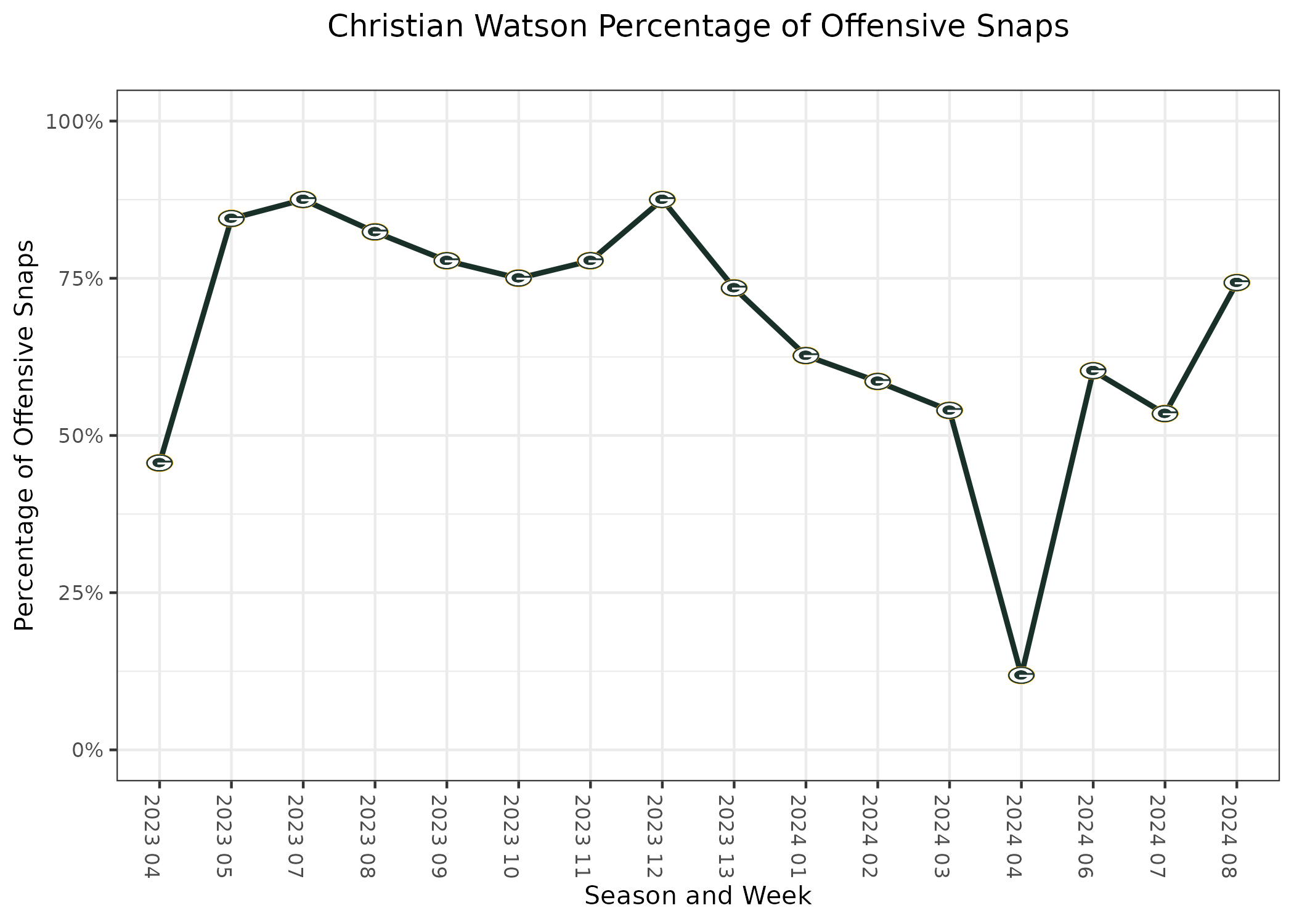
The Jaguars lose all of their wide receivers: Jacksonville finished this game without Gabe Davis, Brian Thomas Jr. or Christian Kirk.
Davis was the only Jaguars wide receiver on the injury report this week due to a knee injury. Davis suffered a shoulder injury early in the second quarter and was ruled questionable but never returned. Once he left, Kirk started playing more consistently in 12 personnel, while Parker Washington stepped up as the second outside wide receiver.
Thomas left the game late in the third quarter due to a chest injury and didn’t return. This led Tim Jones to take over as the other outside wide receiver. Kirk took his last snap early in the fourth quarter due to a shoulder injury. He was spotted in a sling after the game. This left the team with only two healthy wide receivers, so Jacksonville stuck with 12 personnel where both Evan Engram and Brenton Strange were on the field.
Initial reports on Kirk’s injury are that it’s a broken collarbone that will cost him the rest of the season. Kirk was the subject of trade rumors prior to this week, but he will not be traded due to the injury. Washington will have the first chance to play in the slot and is at least worth considering off the waiver wire. He caught three passes for 46 yards in this game.
It’s also worth noting Engram averaged 10.8 fantasy points per game last season with Kirk in the lineup and 15.5 points without him. He similarly was averaging 10.8 points in 2022, and 10.5 points this season. He may see another significant jump in fantasy value with Kirk out.
Miscellaneous Notes
- Travis Etienne missed his second straight game due to a hamstring injury. The Jaguars again turned to Tank Bigsby as the primary early down back, while he and D’Ernest Johnson split passing down duties.
- Packers backup running back Chris Brooks started playing significant snaps in Week 6. This was the first week he played more offensive snaps than Emanuel Wilson., who can be dropped because he’s no longer Josh Jacobs‘ clear handcuff.
Arizona Cardinals @ Miami Dolphins
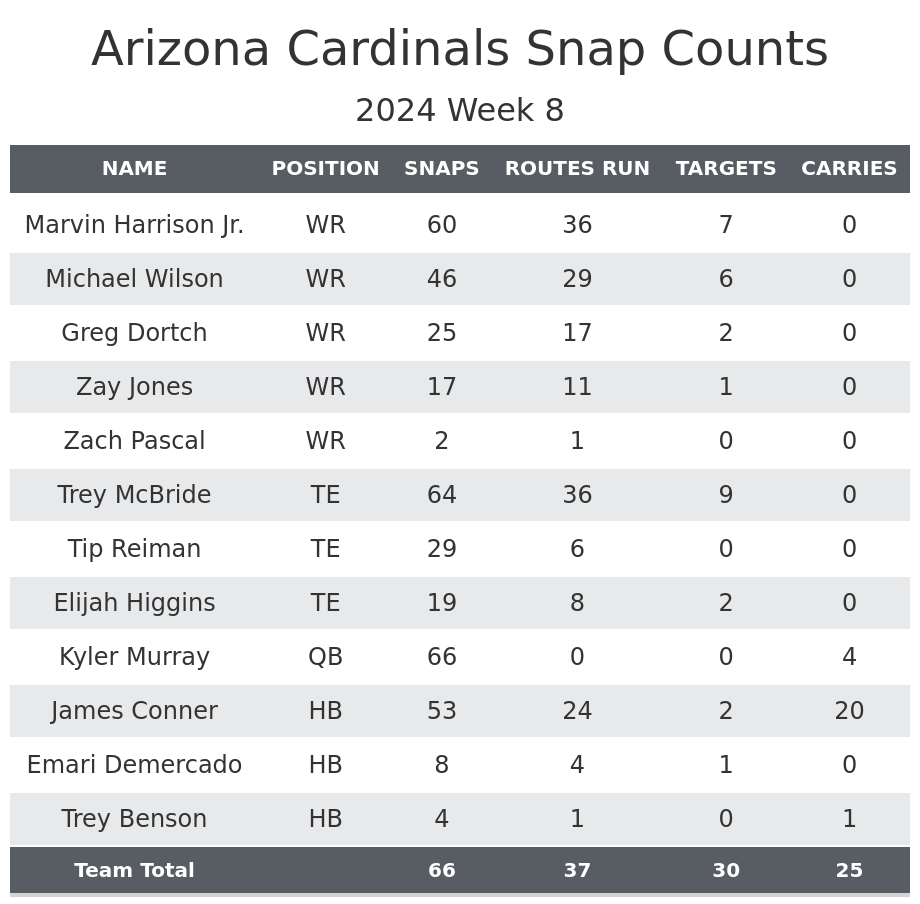
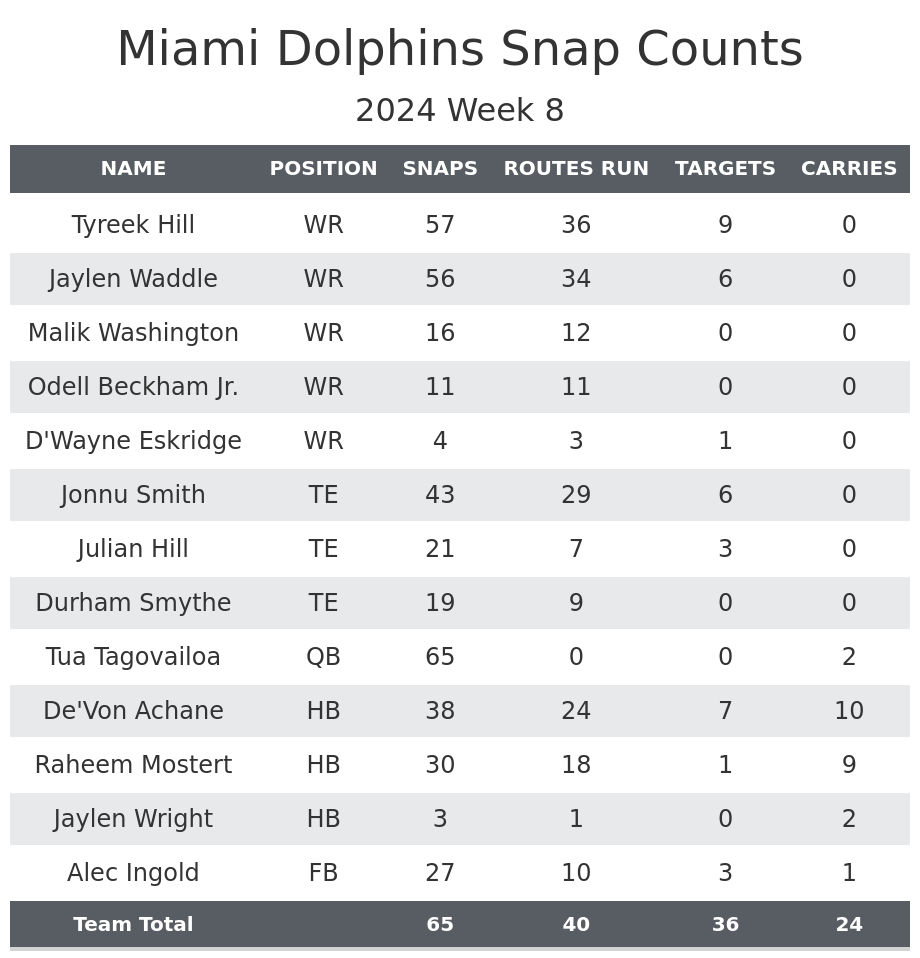
Dolphins adjust without Braxton Berrios: The Dolphins’ third wide receiver had suffered a season-ending ACL tear.
The Dolphins have only used 11 personnel on 34.1% of their snaps this season, which is second-lowest to the Baltimore Ravens, so their third receiver hasn’t mattered as much as most teams. The Dolphins split the 11-personnel usage between Odell Beckham Jr. and Malik Washington. All 11 of Beckham’s snaps came in 11 personnel, while Washington played nine snaps in 11 personnel and also served as the primary backup when Tyreek Hill or Jaylen Waddle needed a break in 12 or 21 personnel.
This means that if there is an injury to Hill or Waddle this season, Washington would be the most likely to be their replacement. In their current roles, neither Washington nor Beckham will play enough to have any kind of consistent fantasy value. Neither received a target this week, and oddly enough, fifth-string wide receiver D’Wayne Eskridge, who recently signed off the practice squad, did have a catch for six yards.
Zay Jones sees a slightly increased role: Jones played his second game with the Cardinals after missing the first six weeks due to suspension and injury.
Last week, Jones debuted with the Cardinals, playing 10 snaps in 11 personnel, mostly taking time away from Greg Dortch. He also played one snap in 13 personnel.
This week, his playing time in 11 personnel dropped to 35% of the Cardinals’ snaps, but he played three snaps in 13 personnel this week. He also played a snap in 12 personnel, unlike Dortch, and the Cardinals ran a play out of 01 personnel, meaning Marvin Harrison Jr., Michael Wilson, Trey McBride, Dortch and Jones were all on the field at once.
While Jones is unlikely to see any fantasy value this season without an injury, the more that Jones plays in 11 personnel, the more Harrison and Wilson will play in the slot. Harrison played 43 snaps in the slot over the first six weeks and 30 in the last two. Ironically, Harrison was playing better in the slot those first six weeks, but in the last two, he’s played better out wide. The Cardinals will likely continue to tinker with how their wide receivers are used to maximize Harrison’s value, both in real life and for fantasy managers.
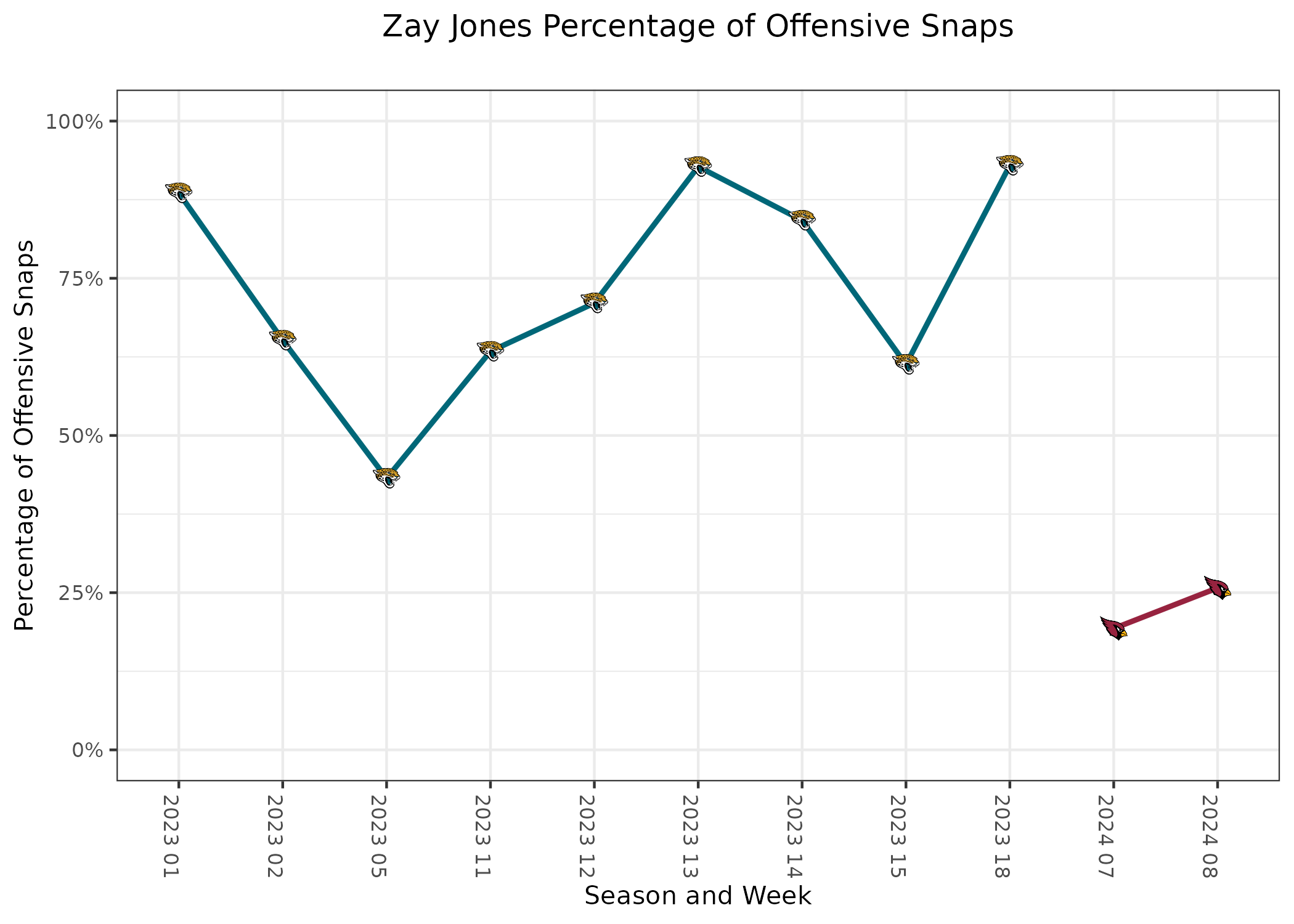
Miscellaneous Notes
- Jaylen Wright is a distant third on Miami’s depth chart at running back, but he ran twice for 18 yards in this game. He averages 5.3 yards per carry this season compared to De’Von Achane‘s 4.4 and Raheem Mostert‘s 3.5. He’s avoided the most tackles in the run game despite having the fewest carries. His playing time may increase this season because he consistently plays well when given an opportunity.
- Trey McBride had his first 100-yard game of the season but has yet to score a touchdown. He ranked fifth among tight ends in fantasy points leading into this week and is the only tight end in the top 13 without a touchdown.
New York Jets @ New England Patriots
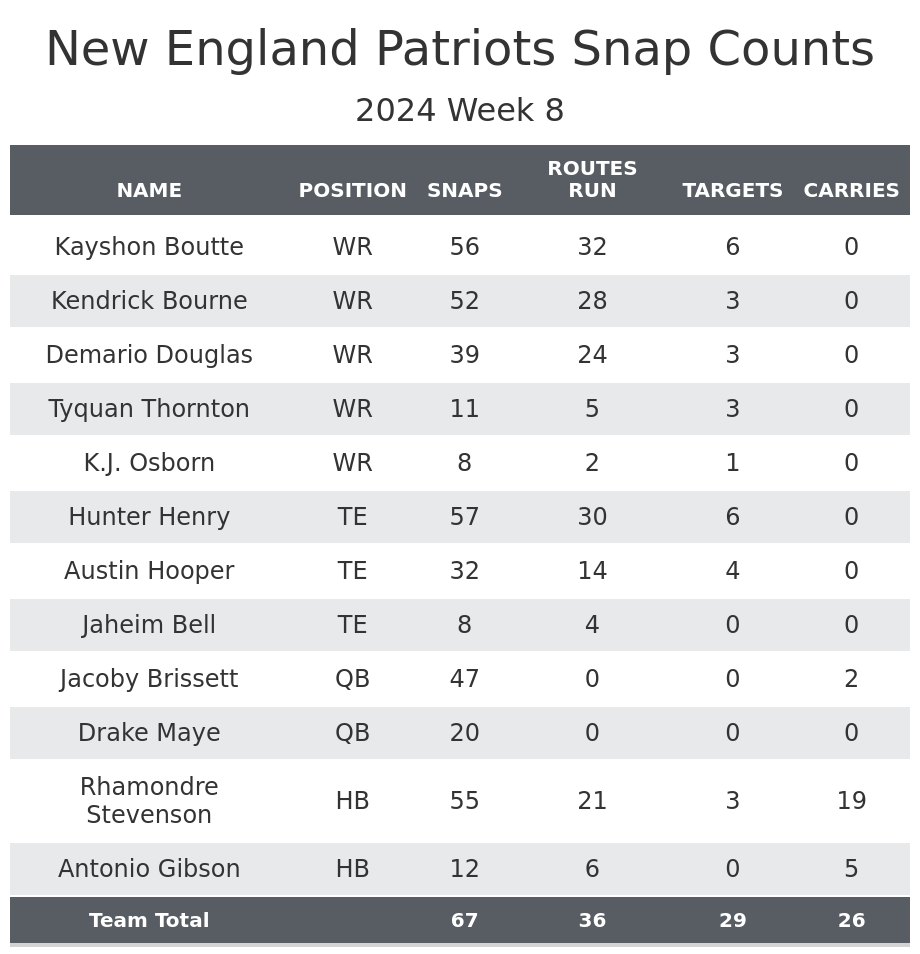
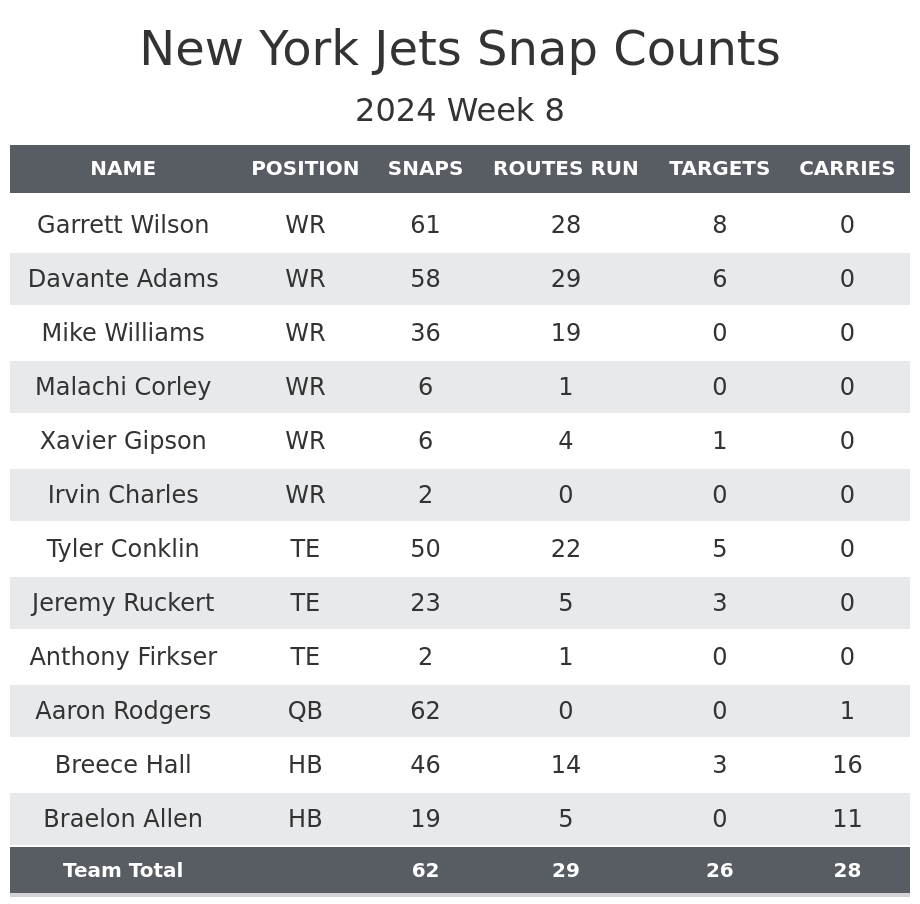
Allen Lazard misses time with a chest injury: The Jets wide receiver was doubtful and ultimately inactive.
Lazard was a starter at the beginning of the season but saw a notable decrease in playing time last week due to the Davante Adams addition. Both Garrett Wilson and Adams will rarely leave the field, which leaves Lazard in a rotation for 11 personnel snaps.
This week without Lazard, the Jets simply turned to Mike Williams as the primary third wide receiver. He rotated a little bit with Xavier Gipson, who happened to score a one-yard touchdown with his only target. Third-round rookie Malachi Corley, who had been a healthy inactive this last month, was active and played more in this game than in the past.
Lazard had been the primary slot receiver this season but more plays without him have meant more opportunities for Adams and Wilson in the slot. Adams was the primary slot receiver for this game, but Wilson caught two of his three passes for 61 yards out of the slot. Even when Lazard is back, it will be interesting to see how much Lazard continues playing in the slot when others are playing well out of that position.
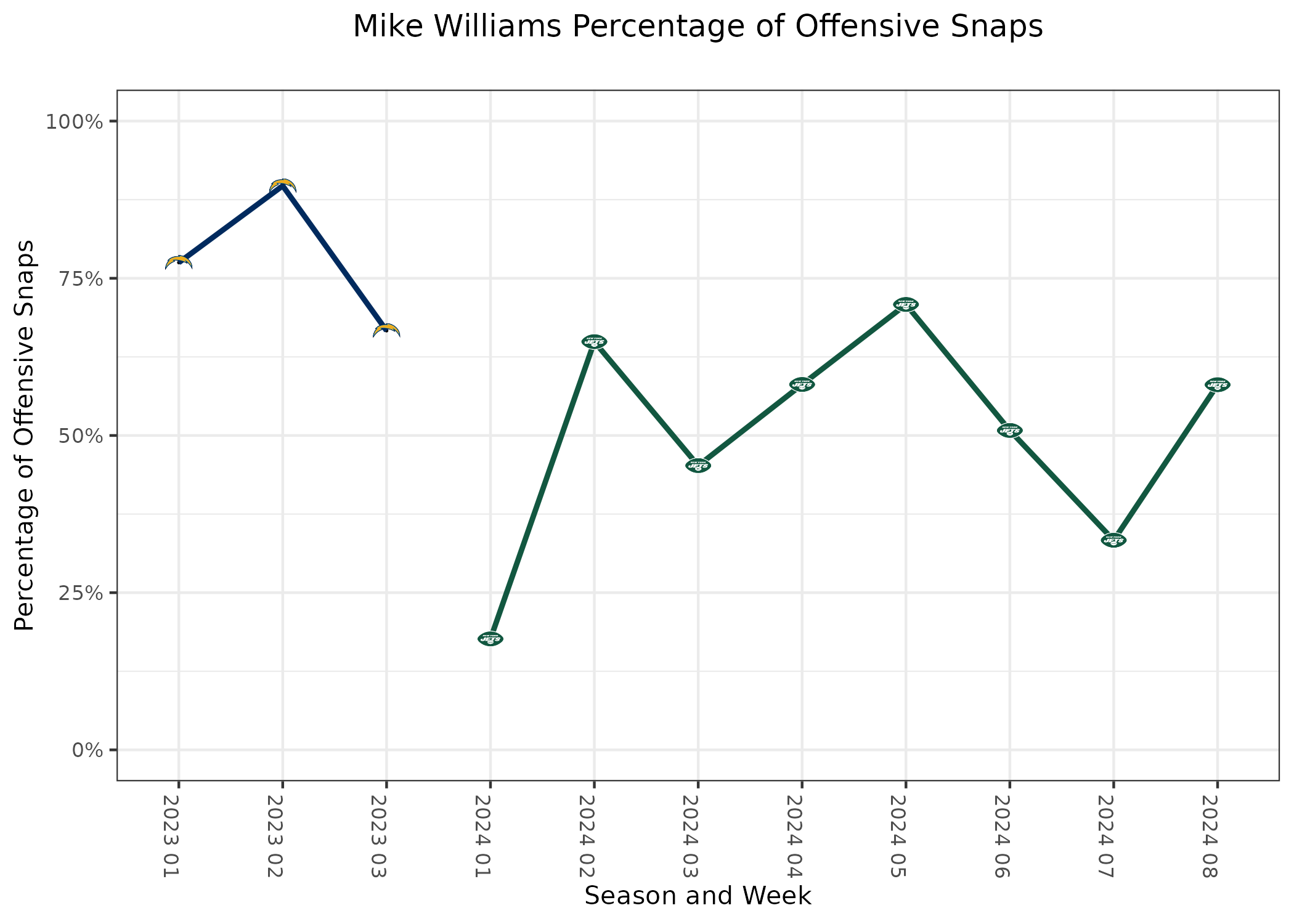
Rhamondre Stevenson dominates snaps: Stevenson played over 75% of New England’s offensive snaps for just the third time in the last two seasons.
Stevenson had hovered around 50% of the Patriots’ offensive snaps this season. While part of that was due to a foot injury he suffered in Week 5, he had also been losing playing time at the end of September for fumbling.
This week, his playing time reached new heights. In the first half, he played in 23 of a possible 26 snaps, which is far better than anything we’ve seen the last two weeks. Even in Week 1 when he last played over 75% of Patriots’ offensive snaps, he only played in 23 of 33 in the first half.
Antonio Gibson was starting to play more in the third quarter, but he proceeded to fumble. While he didn’t return to the lineup that drive or the following drive, he ended up playing seven snaps in the fourth quarter, which is when he received most of his carries.
While Stevenson wasn’t particularly efficient this game, he received plenty of volume to along with two touchdowns. His schedule generally gets easier as we inch closer to the fantasy playoffs, so he could help someone make the playoffs or earn a bye. If doesn’t find the end zone next week, he should be a buy-low option.
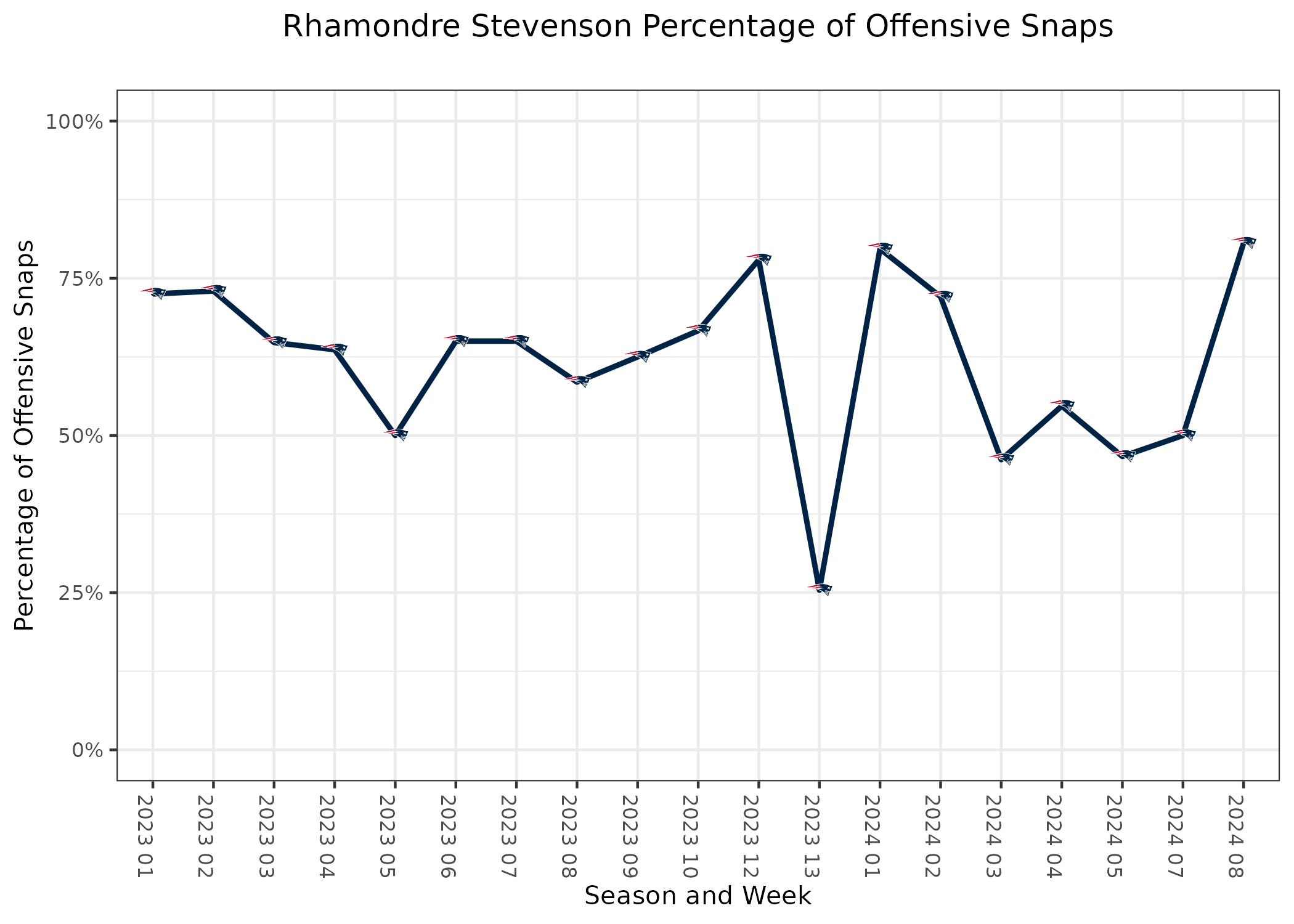
Patriots adjust without Ja’Lynn Polk: The Patriots rookie wide receiver suffered a concussion late last week and missed this game.
The Patriots’ wide receiver rotation seemed to have settled in recent weeks. Kayshon Boutte, Polk and Kendrick Bourne rotated in the two wide receiver spots while Demario Douglas took the slot snaps in three-receiver sets. K.J. Osborn was part of the rotation early in the year, but he’s primarily Douglas’ backup now, while Tyquan Thornton had been inactive.
This week, there was a lot less rotating than usual. Boutte and Bourne were the two outside receivers, while Douglas played in the slot. Osborn’s role was a mix of Douglas’s backup and the backup on the outside. Thornton was active this week and was constantly targeted when on the field. He caught two passes for 20 yards, which meant he had the best performance among the wide receivers for most of the day.
Boutte is consistently the wide receiver running the most routes. He was quiet for most of the day, but thanks to two receptions in the last 90 seconds, he ended the day with three receptions for 46 yards, leading the team in receiving yards. If this passing game can start performing at some point this season, Boutte is the most likely outside wide receiver to produce.
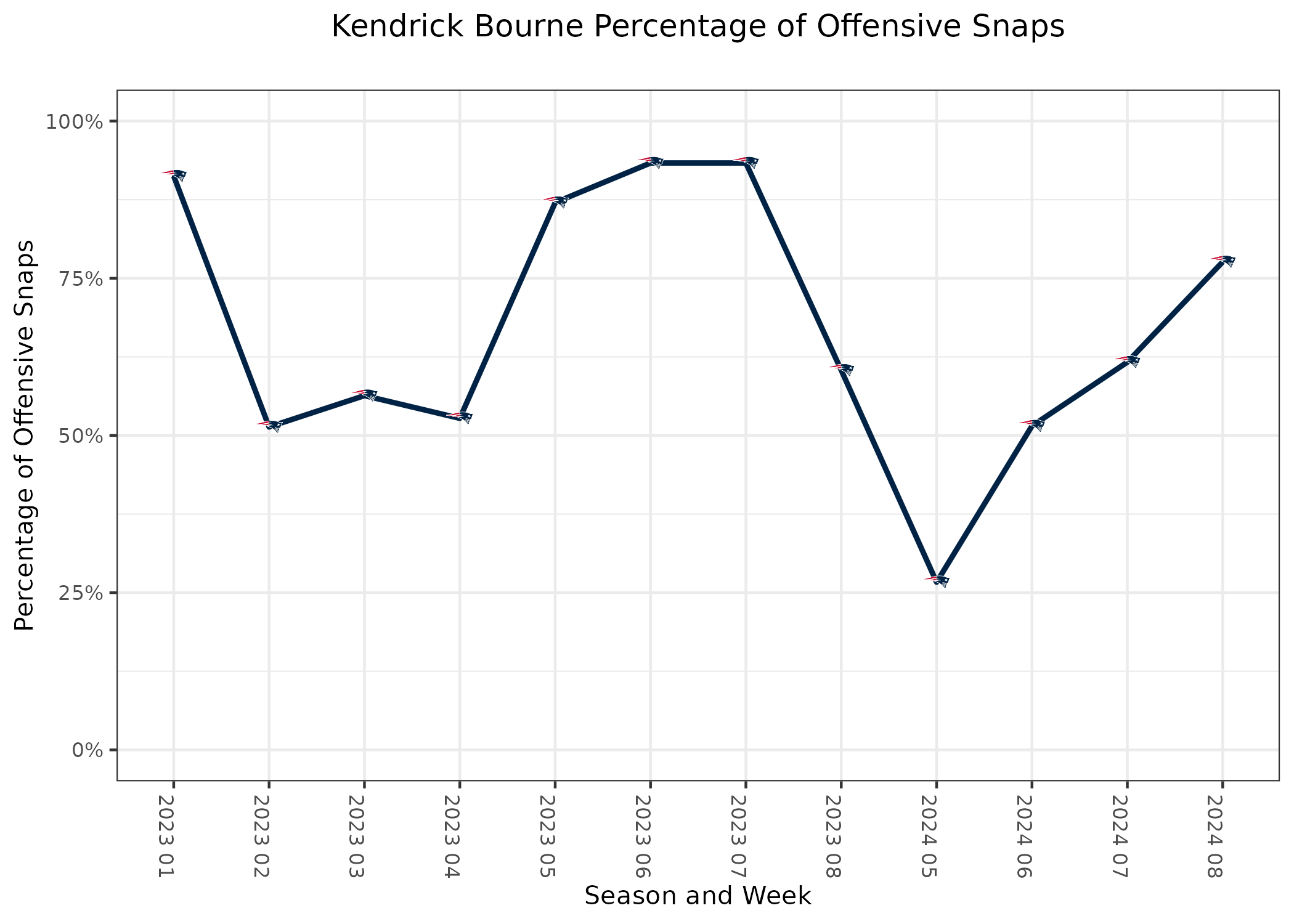
Miscellaneous Notes
- Jets rookie running back Braelon Allen saw his playing time decrease once the team made a change at head coach and offensive play-caller. After running at least five times in the four previous games, he only ran the ball five times over the last two weeks combined. His playing time was much more like September, allowing him to reach double-digit carries. He’s currently one of the best handcuff options among running backs.
Atlanta Falcons @ Tampa Bay Buccaneers
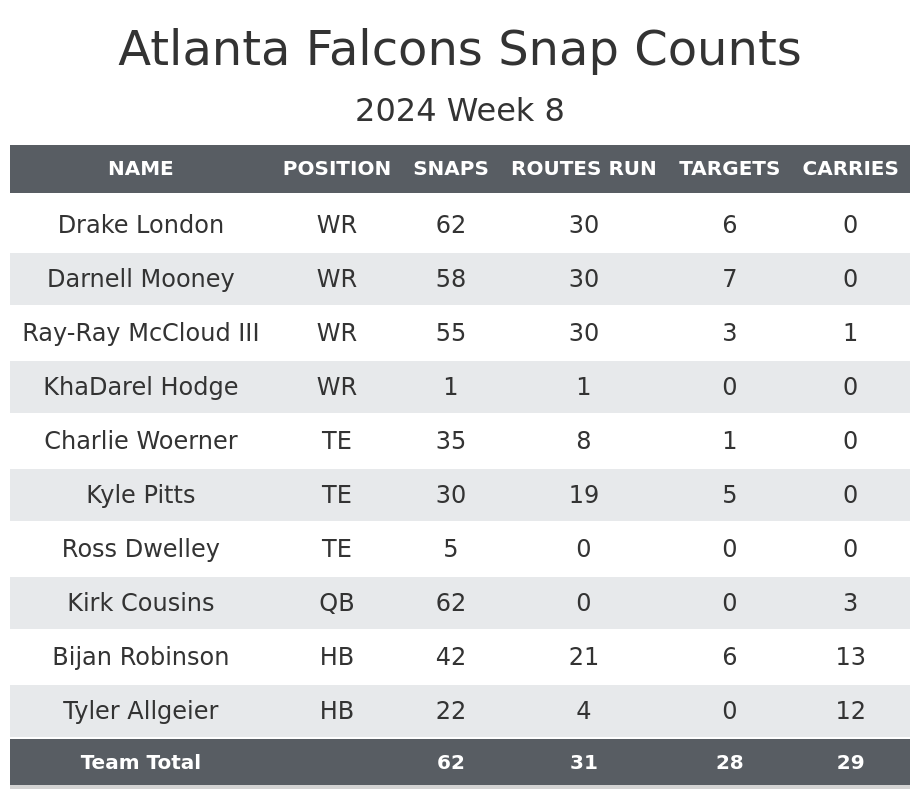
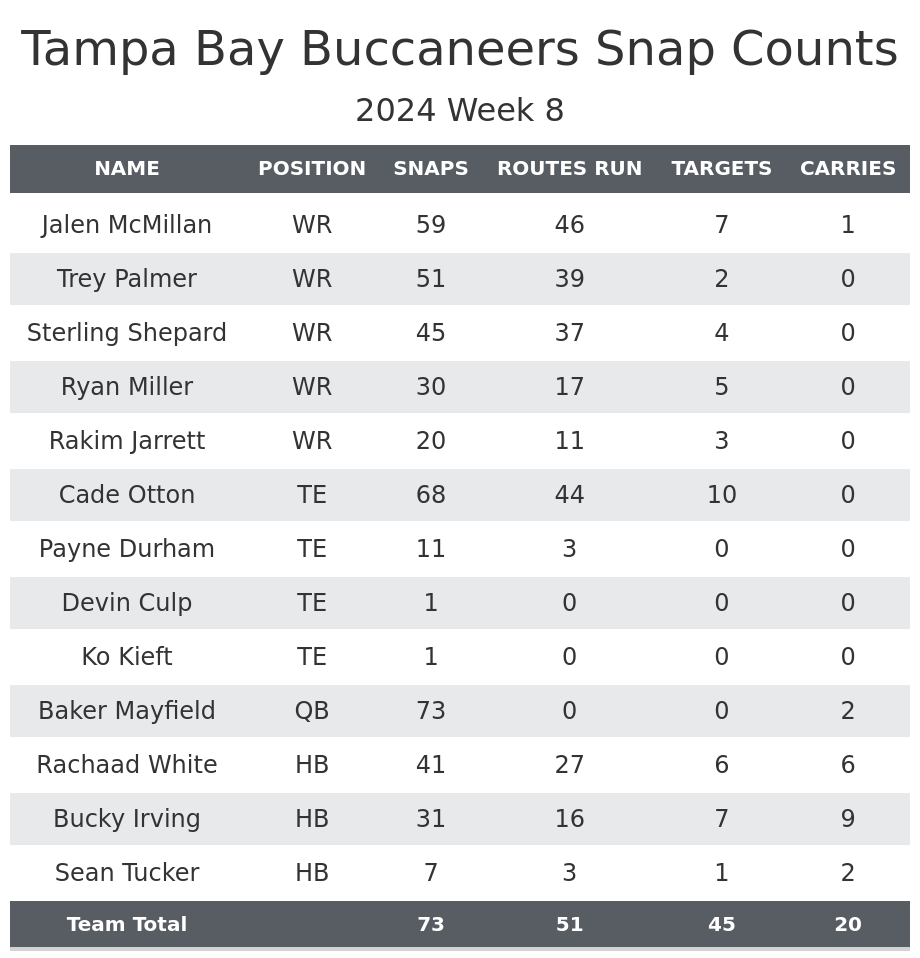
Buccaneers adapt without Mike Evans and Chris Godwin: The Buccaneers will be without Godwin for the rest of the season, while Evans will be out a few weeks due to a hamstring injury.
Trey Palmer replaced Mike Evans as the Buccaneers’ X receiver. He was the primary backup X throughout the season and took over for Evans once he left last week due to injury. Palmer was rotated out a little more often than Evans. His backup was Rakim Jarrett, an undrafted player who played 10 games for them last season but missed the second half of last season due to injury and landed on injured reserve this season due to an undisclosed injury. Jarrett made a few nice plays and led the wide receivers in receiving yards. He may take more time from Palmer next week.
Sterling Shepard was Chris Godwin‘s replacement. Godwin had played 61% of his snaps in the slot this season, 27% on the outside off the line of scrimmage, and 12% on the outside on the line of scrimmage. In this game, Shepard played 61%, 30% and 9% in those situations. Jalen McMillan was considered by many to be Godwin’s replacement, but his alignment distribution in this game was very similar to his previous games this season — only a slight increase in slot snaps.
Ryan Miller was another undrafted player from last season who was signed off the practice squad and was Shepard and McMillan’s primary backup. Shepard was dealing with an injury in the third quarter of the game, so Miller played a particularly high amount of snaps, but Shepard’s snap rate returned to normal in the fourth quarter.
It’s always possible that the Buccaneers change their slot receiver, particularly with a Week 11 bye coming up in a few weeks, but for now, we shouldn’t expect a huge increase in production for McMillan based on his role. He could still see an increase in production simply from less competition for targets.
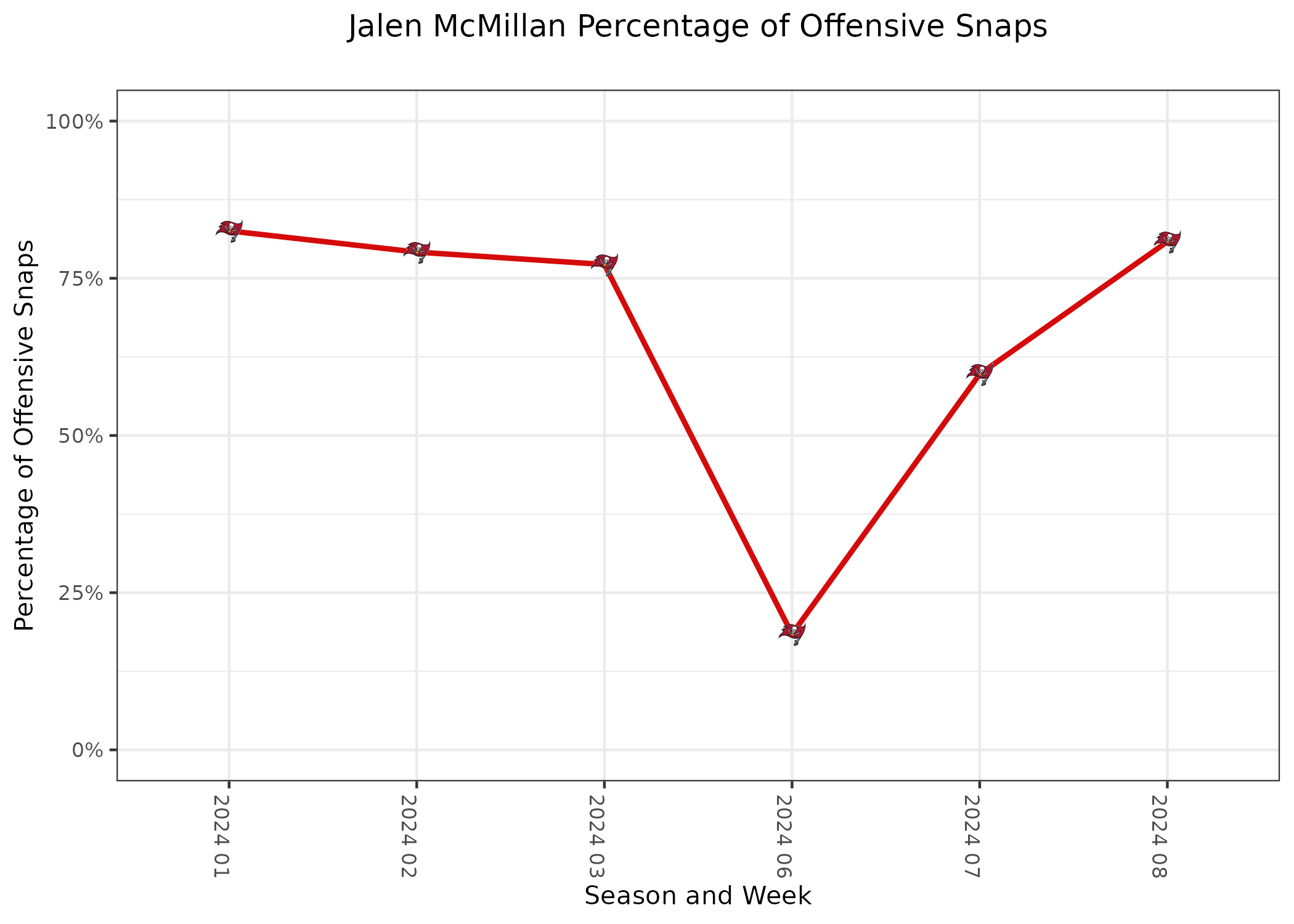
Buccaneers largely revert to a two-man backfield: Bucky Irving was the clear early-down back and Rachaad White was the passing-down back.
Irving was questionable for this game due to a toe injury, but he still led the team in carries at nine and rushing yards at 44. Sean Tucker played very well two weeks ago in White’s absence and saw significant time last week but only ran the ball twice and caught one pass in his limited snaps this week. It is probably fine to cut Tucker in most leagues after how little he played Sunday.
Irving’s toe injury likely limited him in passing situations, allowing White to play every third-and-medium or -long and all of the snaps in the two-minute drill. White luckily scored an 18-yard receiving touchdown to redeem his fantasy value, but otherwise, he would have scored around 10 PPR points, which has become the new normal for him.
White did play well in the run game, averaging 4.8 yards per carry on his six carries. White has looked better than ever as a rusher once they started limiting his snaps. We can expect this to remain a frustrating backfield for fantasy purposes as long as both running backs are playing well, but the team is not giving them the ball enough.
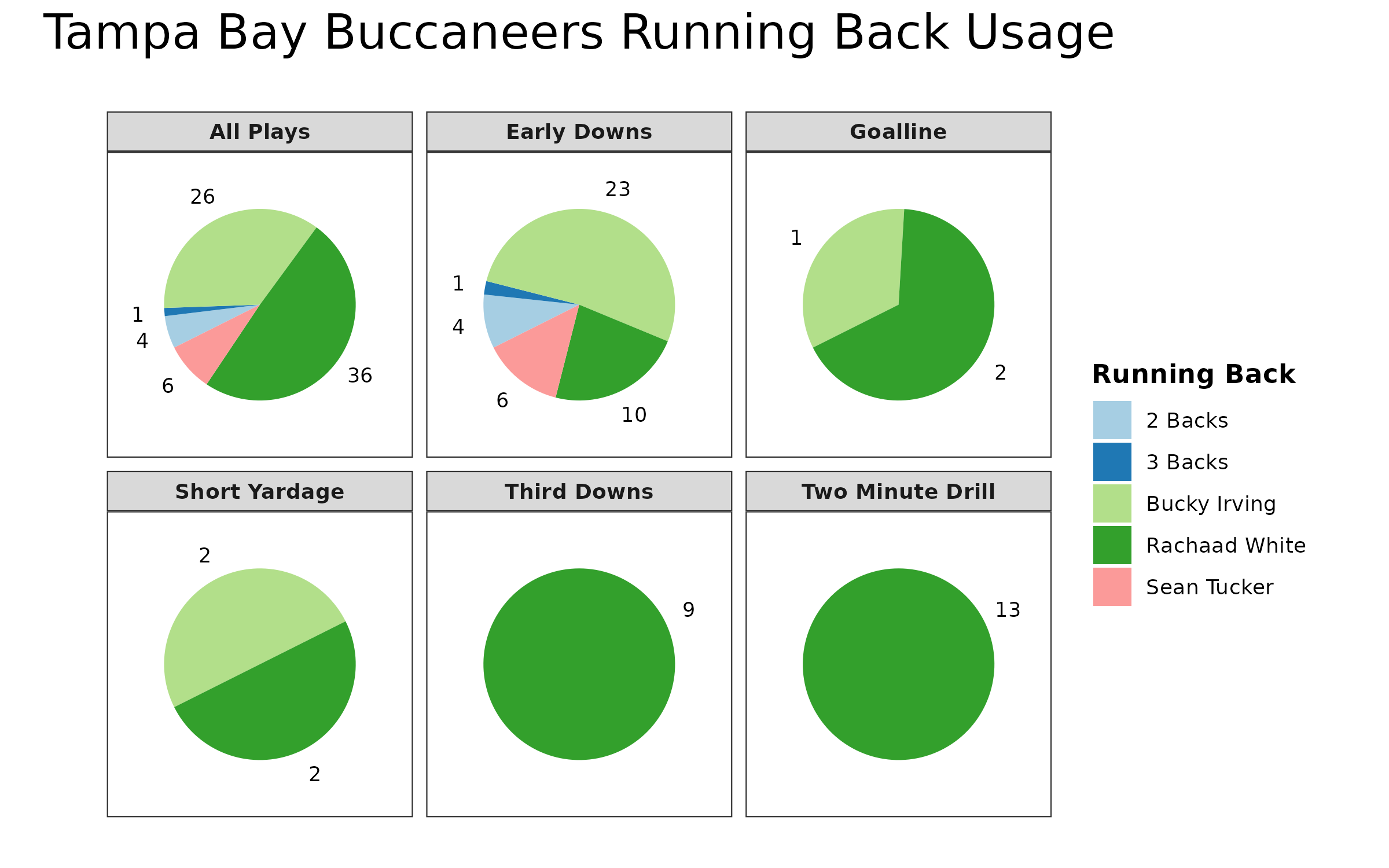
Charlie Woerner leads Falcons tight ends in snaps: Kyle Pitts missed significant playing time in the second half of the game.
The Falcons use 11 personnel on over 90% of their snaps, which is by far the most for any team. This means that on the vast majority of plays, only Pitts or Woerner is on the field. Generally, if Pitts is on the field, the Falcons are more likely to pass and if Woerner is on, they are more likely to run.
In the first half of this game, Pitts played in 66% of Atlanta’s offensive snaps, which was pretty normal for him. That included being on the field for 17 of the 21 pass plays. He was targeted on five of 14 routes, leading to his four receptions for 91 yards. This kind of split has generally been fine for his fantasy value, and it was excellent for his value in this game.
In the second half, Woerner played 25 snaps to Pitts’ 11 out of a possible 33 plays. Pitts’ snaps were spread out throughout the half. He was only on the field for five of the possible 11 pass plays and didn’t receive a target.
It’s at least possible Pitts was dealing with some kind of injury, but it seemed like the Falcons largely wanted to stick with the run game. They similarly ran the ball on over 60% of their snaps in the second half two weeks ago, and Pitts played 20 of 36 snaps in that half. This might only be a concern if the Falcons have clear wins, but they have several favorable matchups over the rest of the season.
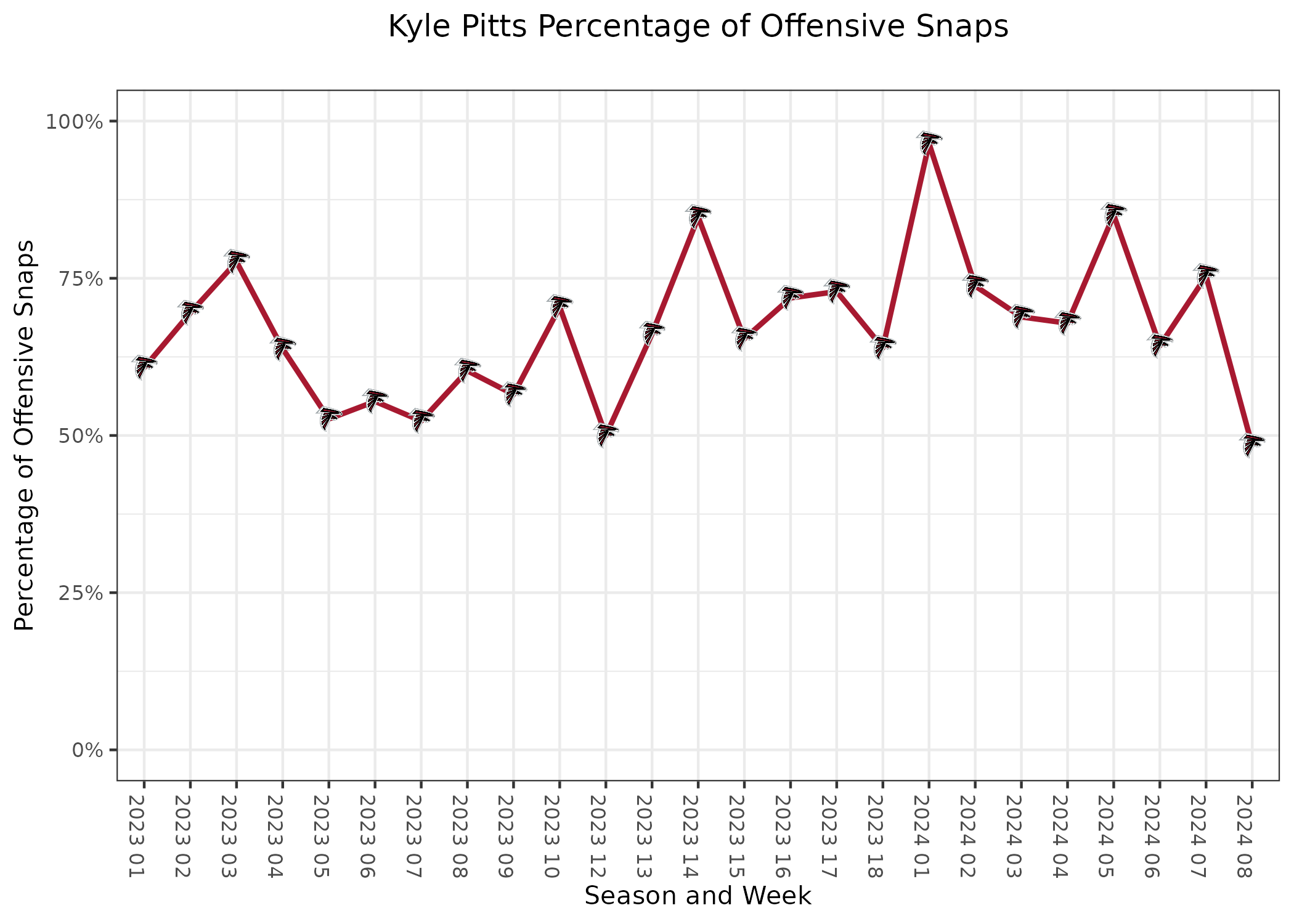
Miscellaneous Notes
- Similar to Kyle Pitts, Bijan Robinson tends to play a higher percentage of his team’s offensive snaps when the Falcons are losing and rotates out more when they are winning. Those trends continued this week, and if anything, they were more in Robinson’s favor than usual.
- Cade Otton is averaging 10.8 PPR points per game this season, which is good enough to be a top-10 fantasy tight end in any season, not just in a season where tight ends aren’t performing as well.
New Orleans Saints @ Los Angeles Chargers
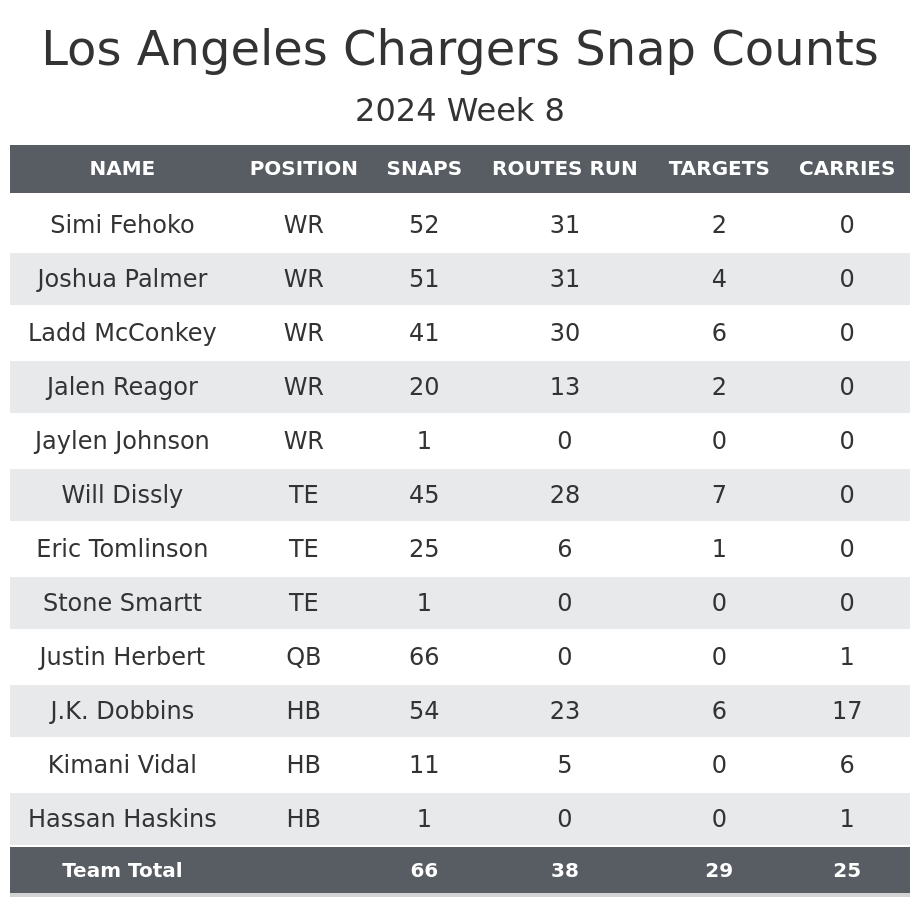
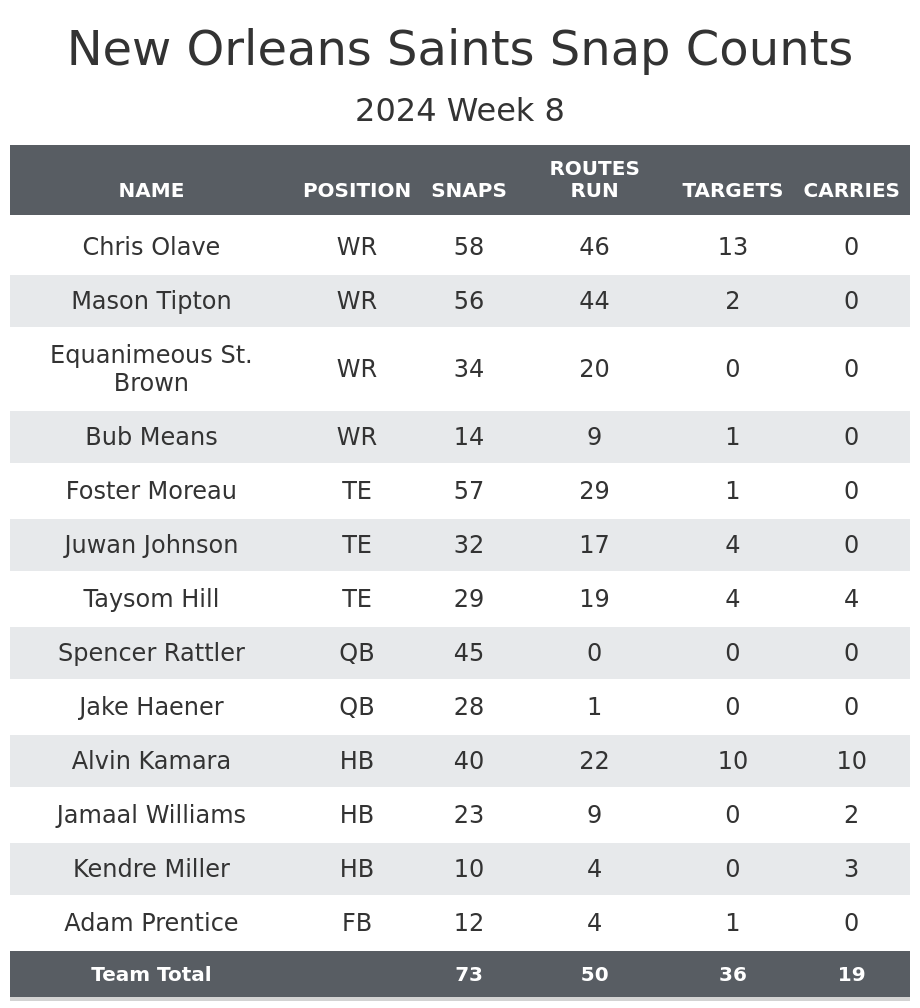
Monitor Kendre Miller’s health: The Saints’ second-year running back suffered a hamstring injury in the third quarter and didn’t return.
Miller made his season debut last week and seemed to already emerge as the second running back option over Jamaal Williams. In the first half, that also appeared to be true, as Miller played six snaps to Williams’ three. Miller also ran twice while Williams didn’t receive a carry.
Williams took over as the primary backup after Miller’s injury. Considering the game script, the Saints decided to use Williams for most of the fourth quarter for his pass blocking. Miller would have been one of the top waiver targets as a handcuff, but his inability to stay healthy will probably leave him getting dropped from more leagues than he’s added in.
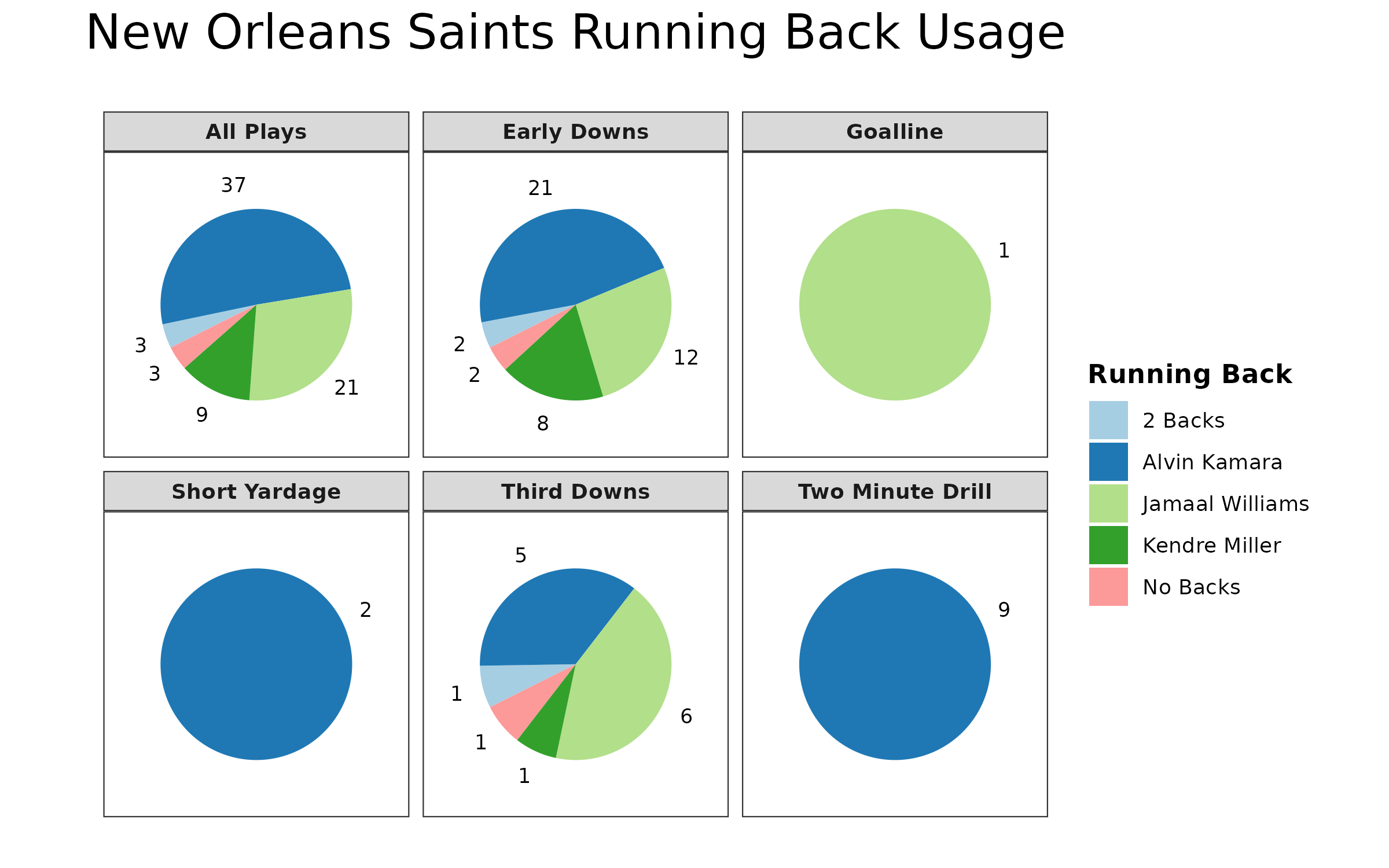
Chris Olave returns to the Saints: Olave missed most of the last two weeks due to a concussion.
Olave has been the Saints’ X receiver all season. This week, his playing time returned to normal. He’s been up and down all season — four games with at least 80 receiving yards and three games with 15 or fewer, although one of those three games was the game he suffered his concussion. With Rashid Shaheed on injured reserve, ideally, Olave will be more consistent going forward.
While Bub Means led the Saints wide receivers in targets over the last two weeks, he’s also an X receiver. With Olave back, Means returned to a backup role. Mason Tipton remained the Z receiver, while Equanimeous St. Brown took over in the slot with Cedrick Wilson dealing with a hip injury. Wilson will likely overtake St. Brown once he’s back. The team also signed Marquez Valdes-Scantling this past week, and he will likely cut into Tipton’s playing time.
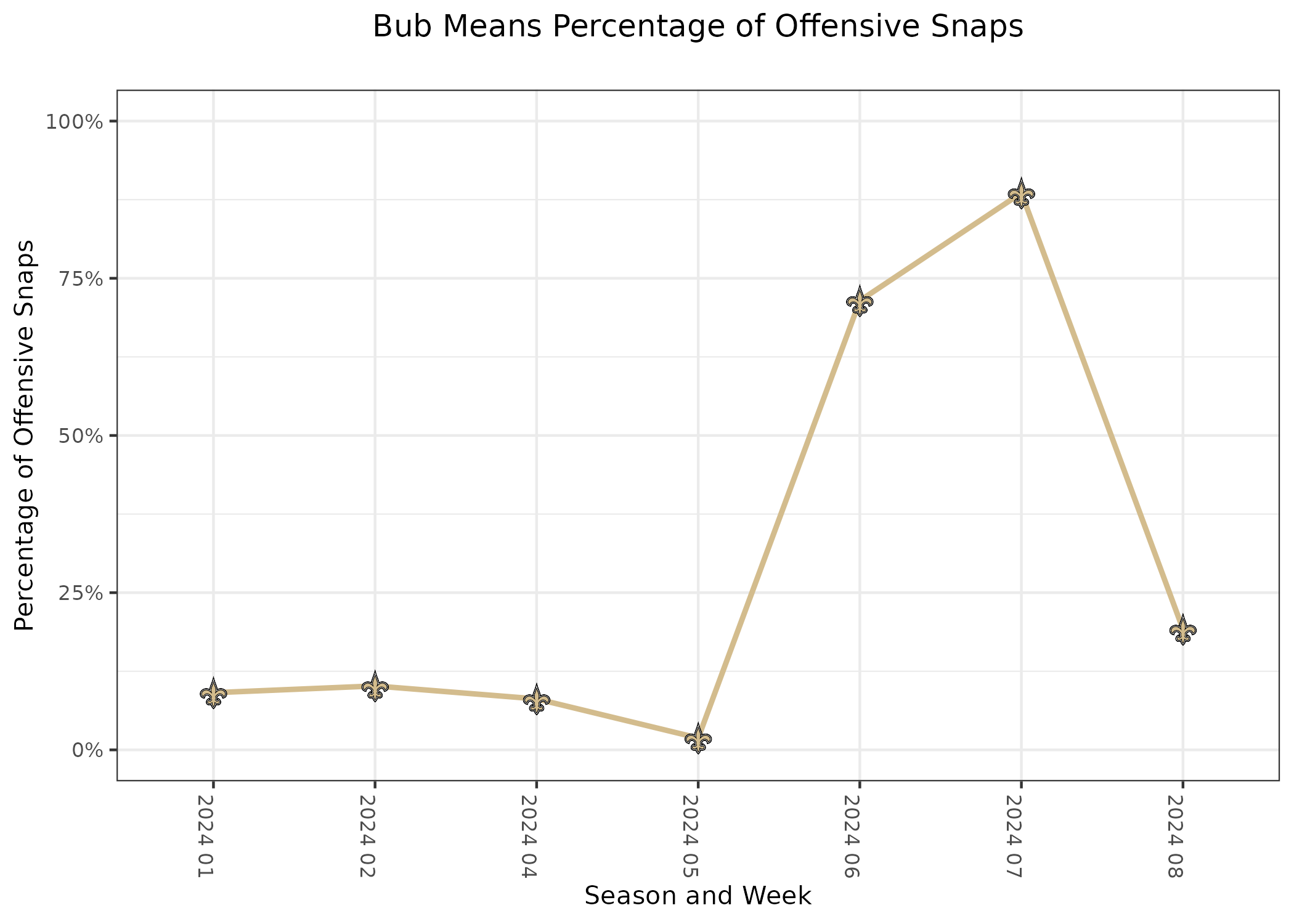
Taysom Hill returns: Hill had missed the last three weeks due to a rib injury.
Hill was a full participant in practice on Thursday and Friday, which made it clear Hill would have a decent role in this game. He played two snaps at quarterback, three at running back, two at tight end, 14 in the slot and eight out wide. He completed a pass, ran four times for 20 yards and caught two passes for 21 yards.
Hill played 44% of New Orleans’ offensive snaps over the first three quarters but only 28% in the fourth quarter while the Saints were throwing to catch up. Presumably, if the game was closer, he would have played more in the fourth quarter. Once he’s healthier, there is also a chance he plays more. He only exceeded 44% of the Saints’ offensive snaps four times last year, so he is generally playing more this season in neutral situations whenever he’s healthy.
The injury to Kendre Miller also opens the door for Hill to run the ball more going forward. Hill was limited to six PPR points in this game, but his floor should be higher once Derek Carr is back, and his potential for huge games is larger than the vast majority of tight ends. He should be the top waiver target at tight end.
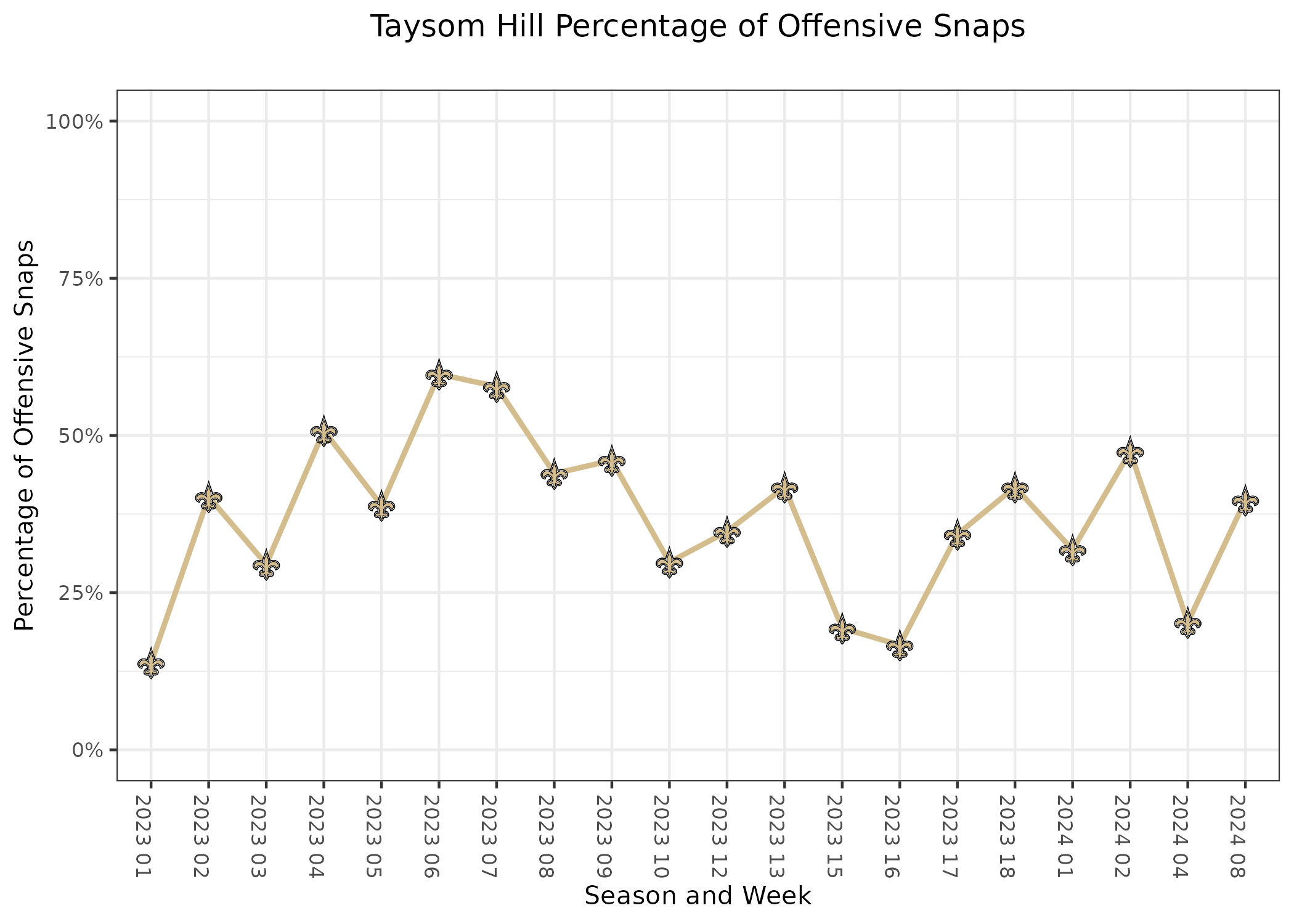
Monitor Juwan Johnson’s health: Johnson left the game in the fourth quarter, was evaluated for a concussion and didn’t return.
Johnson has spent this season as a rotational player with Foster Moreau. Johnson ran more routes and Moreau stayed in to block. That remained true for most of this game until Johnson’s head injury. Once he left, Moreau became an every-down tight end.
If Johnson ends up missing a game, Moreau could be a fine waiver-wire target for anyone who needs a tight end for Week 9. The Saints play the Carolina Panthers, who have allowed the fifth-most fantasy points to tight ends over the first seven weeks and just allowed four catches for 85 yards and a touchdown to Adam Trautman this week.
Chargers again down several receivers: The Los Angeles’ passing game was much more successful this week than last without four potential receiving options.
For the second straight week, the Chargers didn’t have wide receivers Quentin Johnston (ankle), Derius Davis (hamstring) or Hayden Hurst (groin). It also seemed like D.J. Chark could be activated from injured reserve. He was questionable and has been practicing in some capacity for two weeks, but he was not activated yesterday.
This left Simi Fehoko replacing Johnston as one of the lead outside wide receivers while Will Dissly took over as the receiving tight end. While the Chargers rarely used McConkey in two receiver sets, he had by far his best game of the season with a season-high six receptions and nearly 50 yards more than his previous career high in yards. He also doubled his career receiving touchdowns. Hopefully, this will lead to more targets going forward.
Dissly was also highly targeted, leading to five receptions for 41 yards. Dissly has been a significantly more impactful receiver than Hurst this season, so it wouldn’t be surprising if Dissly remains the receiving tight end even when Hurst returns.
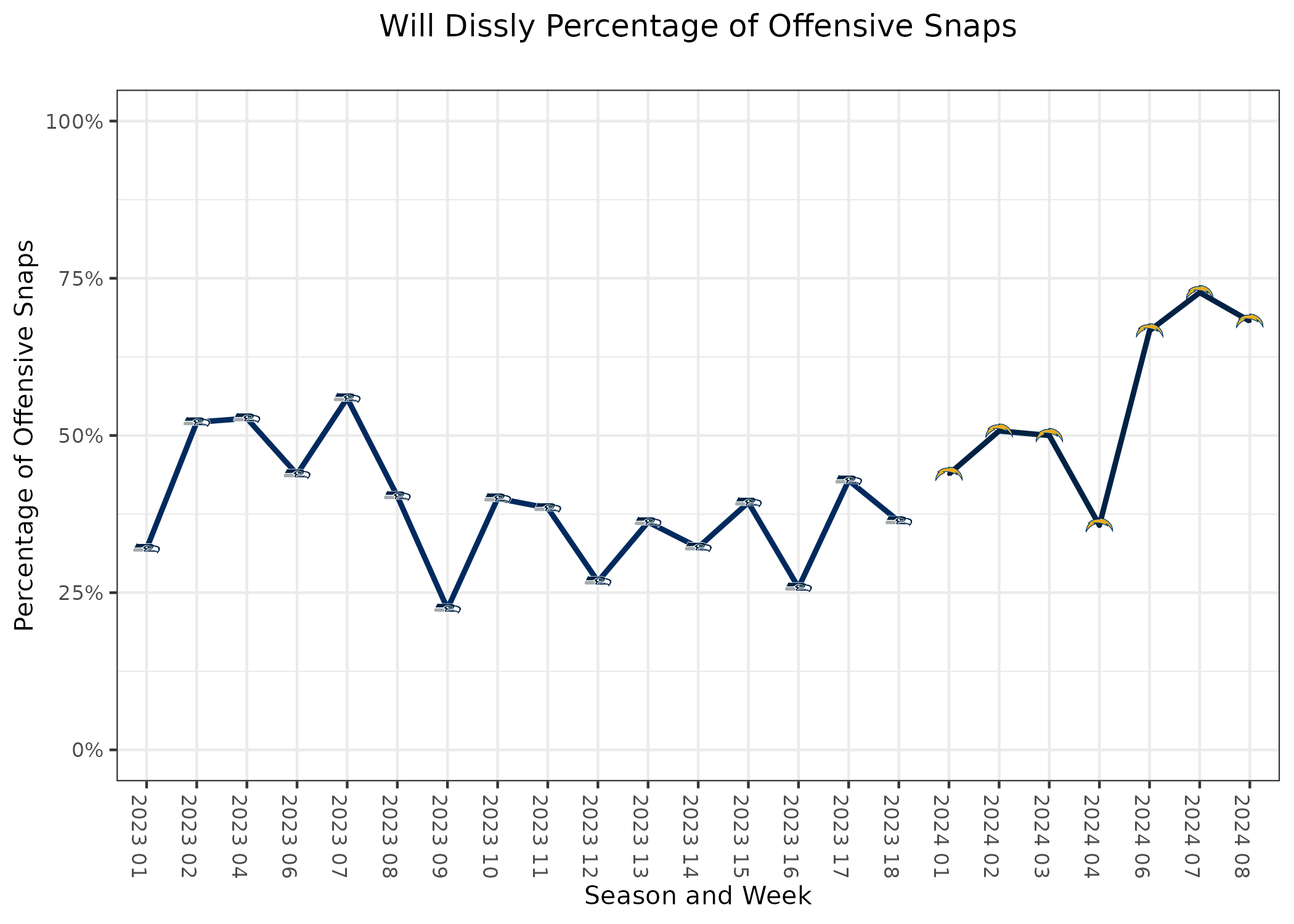
Miscellaneous Notes
- The Saints released running back Jordan Mims. While he had seen notable playing time early in the season, Kendre Miller‘s return meant Mims was inactive last week. Taysom Hill’s return this week may have also contributed to the Saints not needing four running backs on the roster.
- Chargers rookie running back Kimani Vidal ran the ball a career-high six times in this game, but he wasn’t rotated in as much as the last two games. Considering he hasn’t broken a run for more than seven yards, it seems unlikely he gets a much larger role shortly.
Buffalo Bills @ Seattle Seahawks
- James Cook: 17 carries, 111 yards, 2 touchdowns, 3 receptions, 22 receiving yards
- Khalil Shakir: 9 receptions, 107 yards
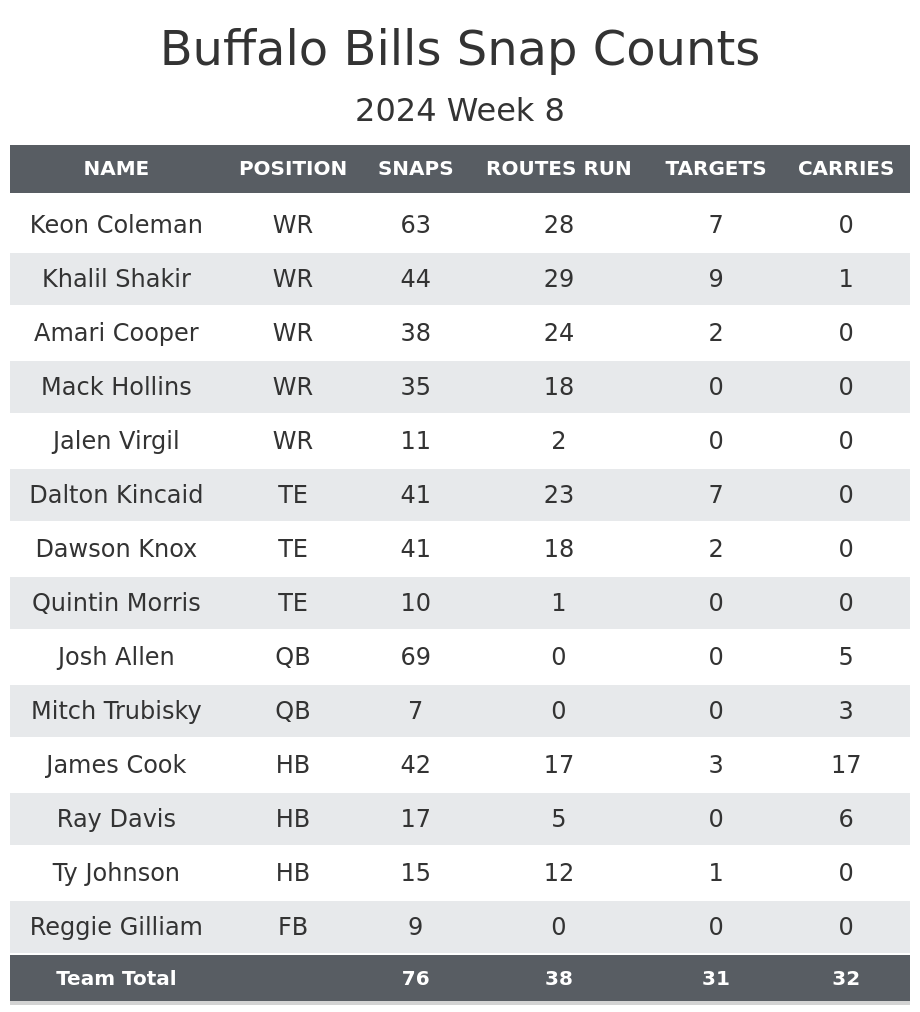
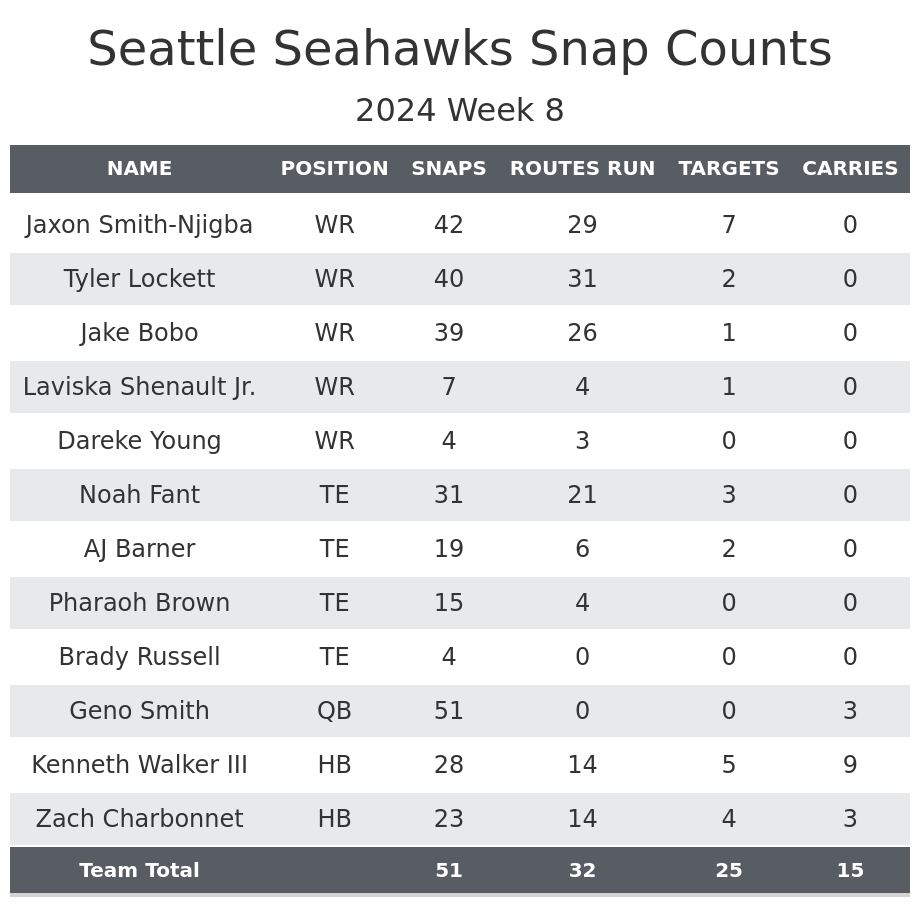
Amari Cooper only sees a slight increase in snaps: Cooper was consistently third among the wide receivers in snaps regardless of the game script.
Last week, Cooper basically took Marquez Valdes-Scantling‘s role as the Bills’ third outside wide receiver, rotating in for both Keon Coleman and Mack Hollins, but with a much higher target share. This week, both Cooper and Coleman played more snaps, all coming at Mack Hollins‘ expense. Cooper was rotated out a little more in the fourth quarter in the blowout but only played 56% of the team’s offensive snaps in the first three quarters, which is a notable decrease from his previous teams.
It’s certainly possible Cooper continues to see his playing time improve, but considering Coleman is also playing well, it’s also possible Cooper remains in more of a rotation. He will probably remain a frustrating player for fantasy football purposes, as the Bills have several good players and only so many of them can have a good week.
The Bills didn’t have Curtis Samuel this week due to injury, which is partially why Khalil Shakir also played more snaps than usual. He remained primarily an 11 personnel-only player. Jalen Virgil was the fifth wide receiver for this game, but most of his playing time came in the fourth quarter due to the blowout.
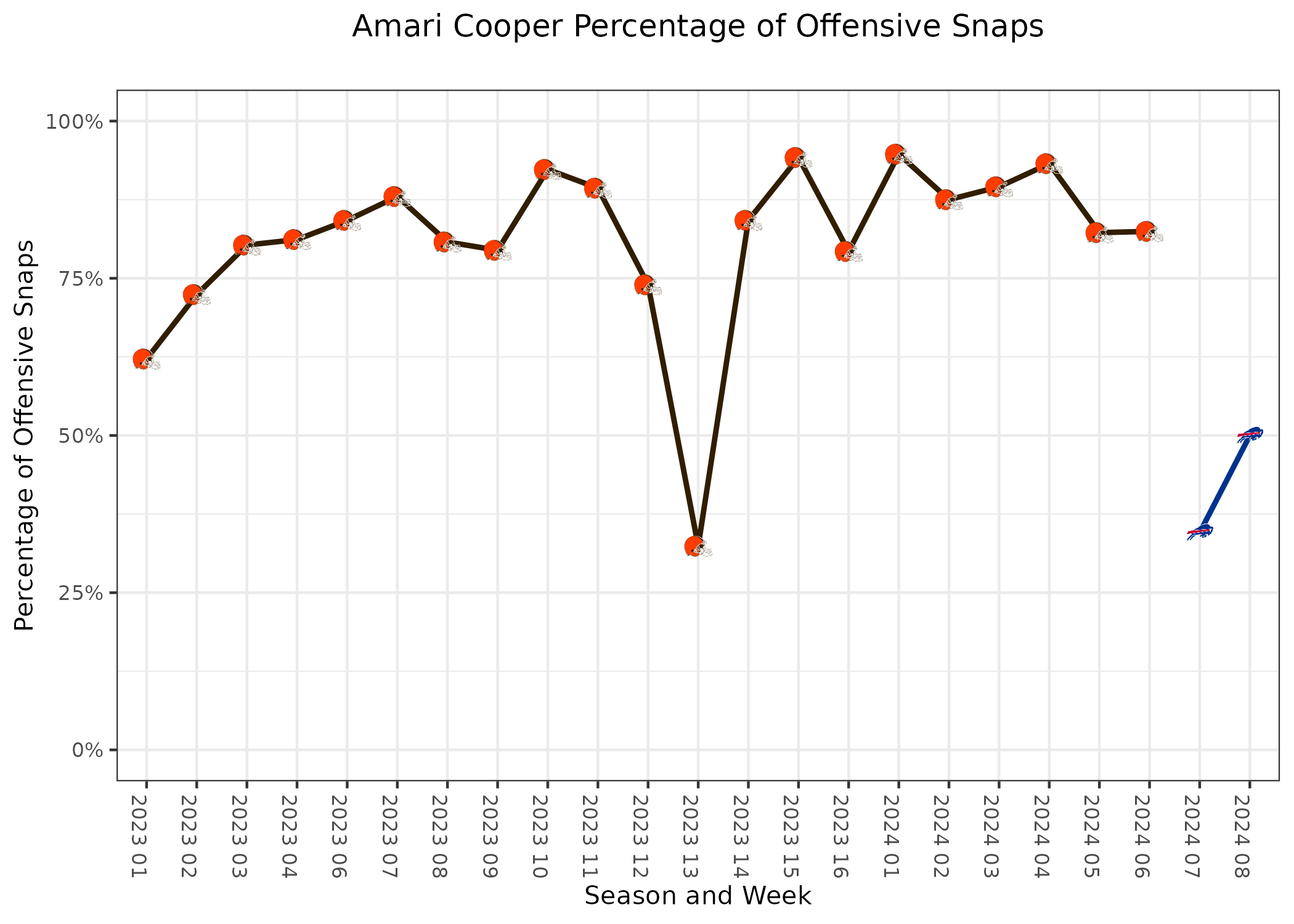
Seahawks struggle without D.K. Metcalf: The Seahawks lead wide receiver missed this week due to a knee injury.
As expected, Jake Bobo replaced Metcalf in the lineup. Bobo not only joined for 11 personnel but received more snaps than Tyler Lockett in 12 personnel. Metcalf consistently received at least six targets per game and caught at least three passes, but Bobo was only targeted once, catching a 15-yard pass.
The team mostly adapted with more targets than usual to their running backs and more targets to Jaxon Smith-Njigba. The sophomore wide receiver caught six passes for 69 yards. The Seahawks have their bye week in Week 10, so the Seahawks may rest Metcalf in Week 9, giving him two more weeks to recover before returning in Week 11.
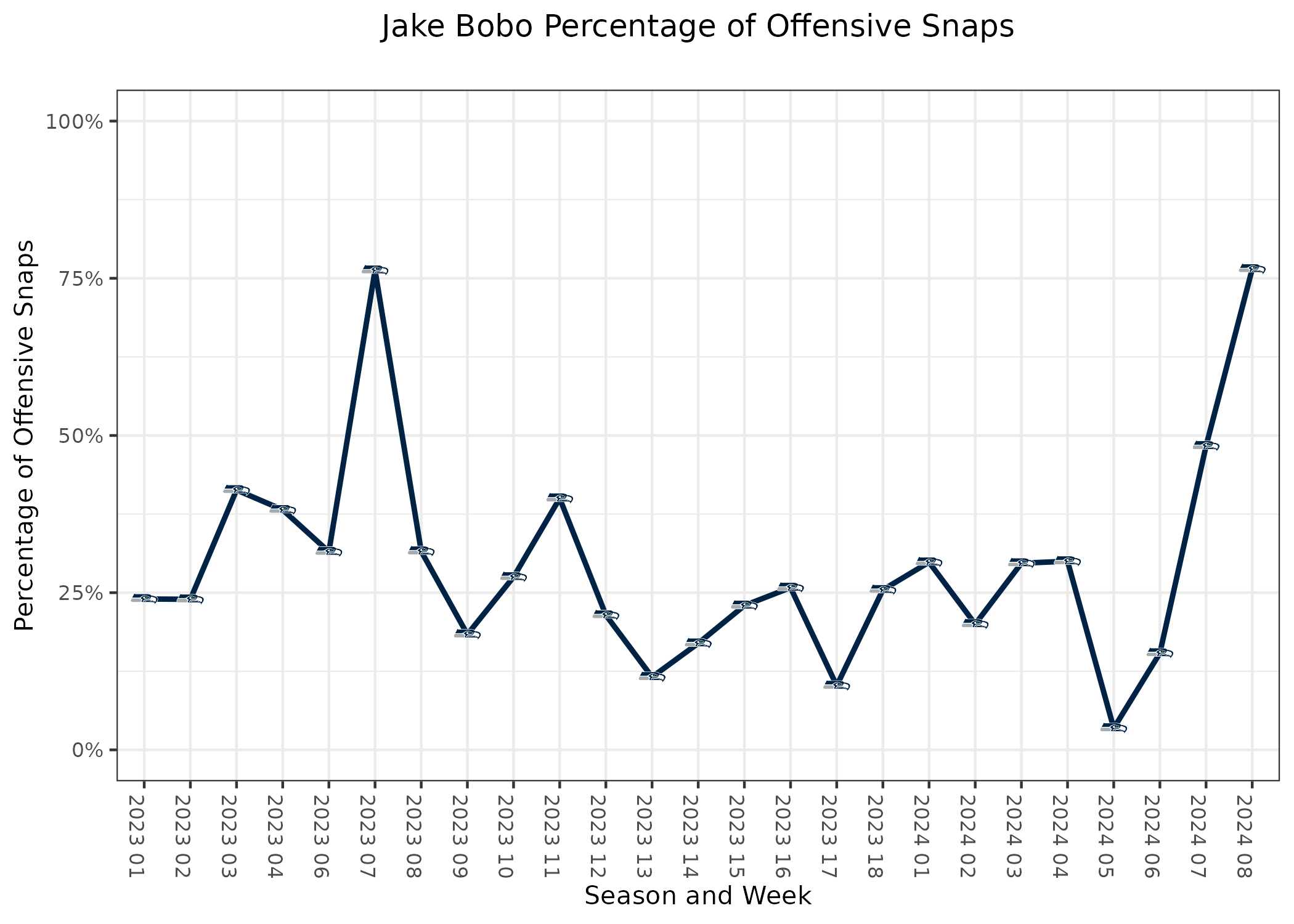
Miscellaneous Notes
- While Kenneth Walker III’s snap rate was much lower than usual, it was because the Seahawks ran 16 plays in two-minute drills, and Zach Charbonnet took all of those snaps. Walker was still the overwhelming leader in normal early-down snaps in addition to goal-line and short-yardage situations. His fantasy value should return to normal in more competitive games.
- Dalton Kincaid’s snap rate was lower than usual, but he’s generally played more when the Bills are playing from behind and less when they are winning. When accounting for the game script, if anything, he played more than usual.
Carolina Panthers @ Denver Broncos
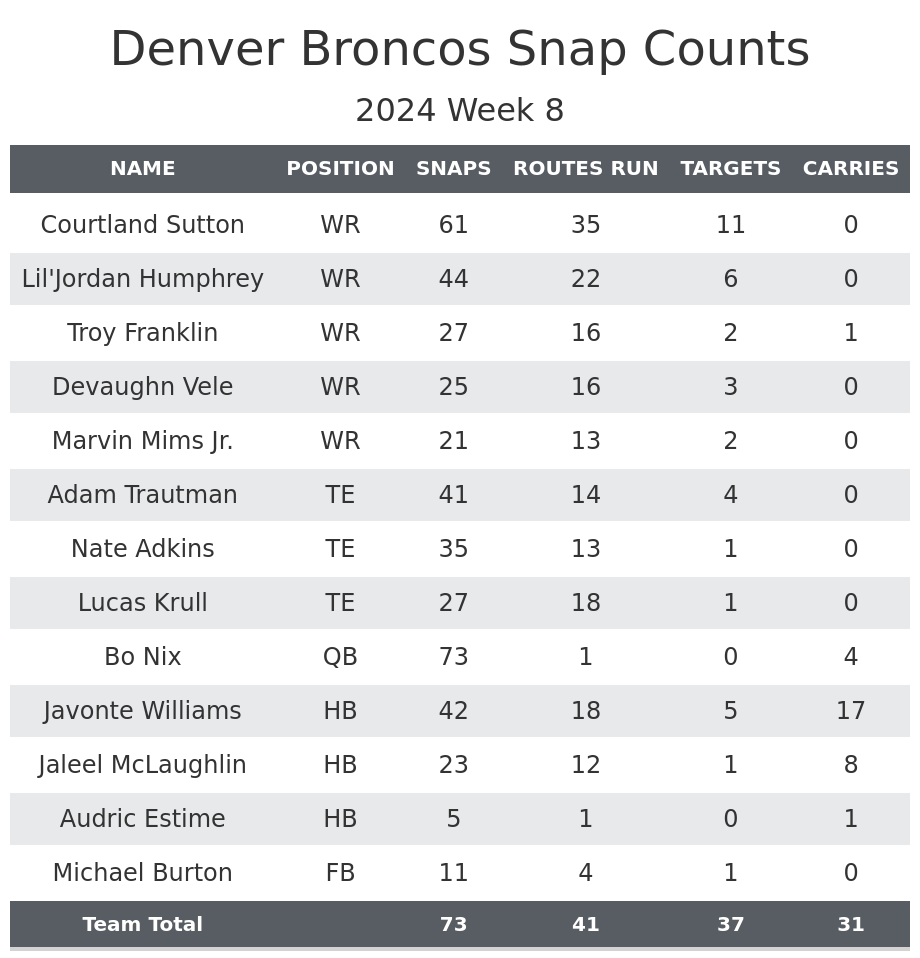
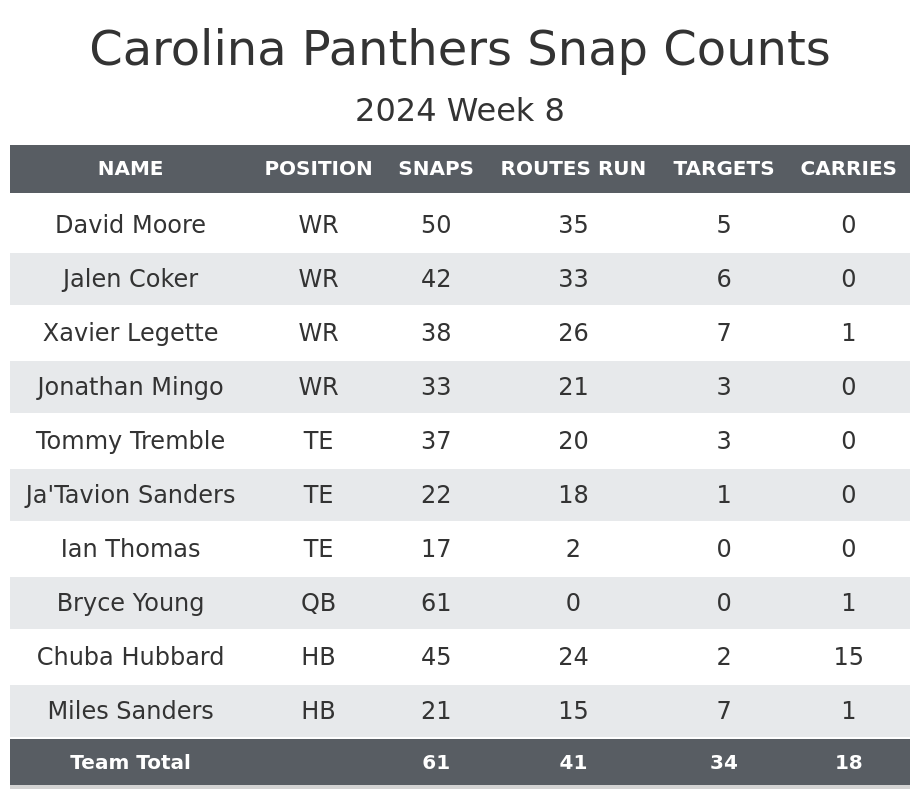
Panthers dig deep down the wide receiver depth chart: Diontae Johnson missed this game due to a rib injury and is one of the top wide receiver options on the trade market.
Adam Thielen returned to practice this week as some potential reinforcement, but he wasn’t activated to the 53-man roster. This left the Panthers with a four-man rotation. David Moore led with the wide receiver room in snaps and routes. Moore has the most experience in Dave Canales’ offense, spending 2017-2020 with him with the Seattle Seahawks and 2023 with the Tampa Bay Buccaneers. Jalen Coker played the second-most snaps and led the team in receiving yards at 78 while scoring a touchdown.
This was not a great sign for Xavier Legette and Jonathan Mingo, who the Panthers invested high draft picks in the last two seasons. Legette led the team in targets, but he played less than he had in recent weeks, when we expected more snaps from him. Mingo’s time with the Panthers could be coming to an end. Over the last three weeks, he’s caught one pass for one yard.
Legette and Coker are both players worth considering off the waiver wire, especially if the Panthers clean house by trading both Johnson and Thielen.
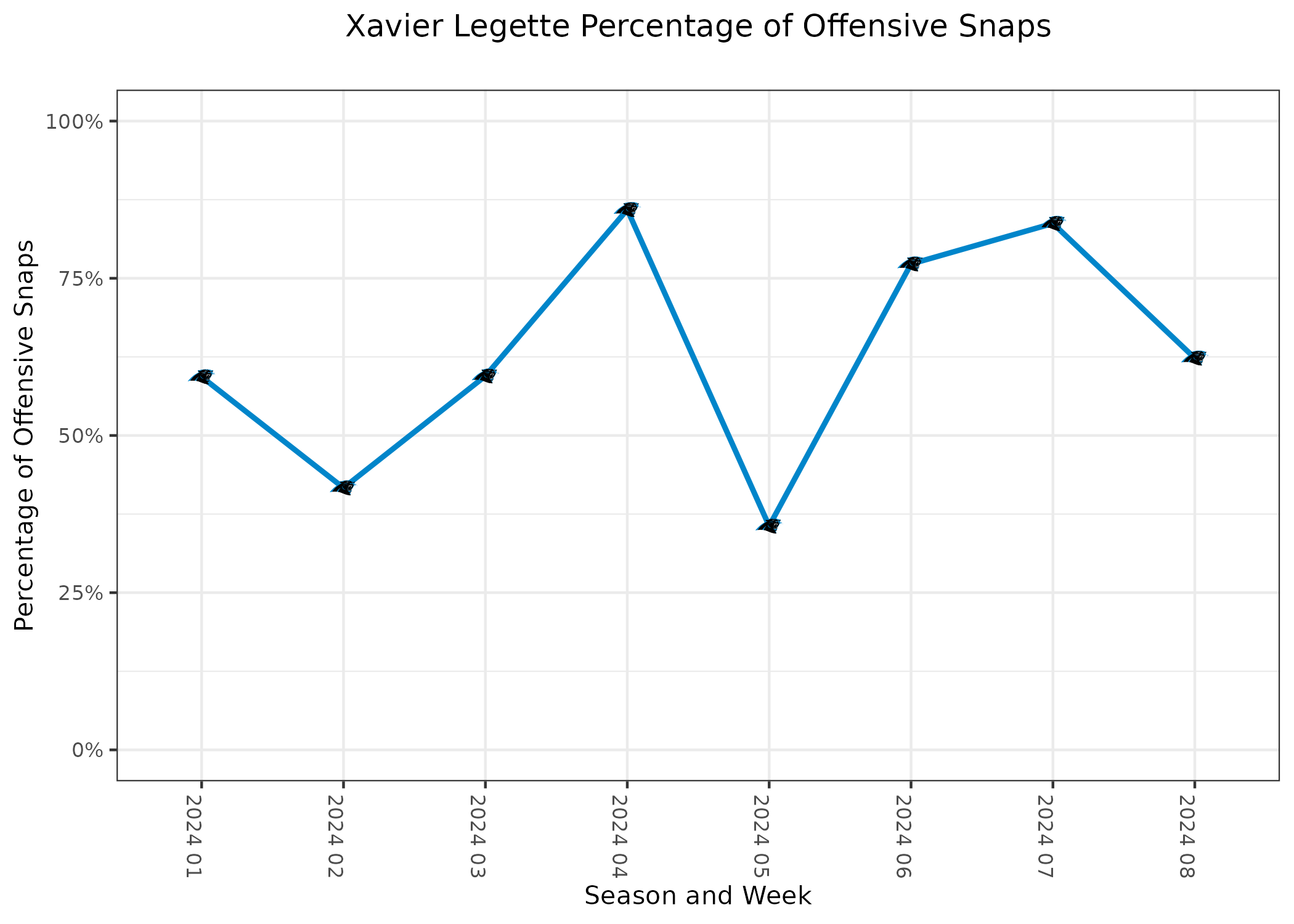
The Panthers reach full strength at tight end: For the first time all season, Carolina had all three of its tight ends
Tommy Tremble and Ian Thomas were both injured throughout the preseason. Thomas didn’t make his season debut until Week 6, but Tommy Tremble missed both Weeks 6 and 7 due to a back injury. That meant this game was the first time in three months we had any strong sense of how the Panthers’ tight ends would rotate.
In 11 personnel, the Panthers rotated Ja’Tavion Sanders and Tremble. Sanders played 20 snaps to Tremble’s 18. In 12 personnel, Tremble and Thomas played 14 of the possible 15 snaps together. Sanders replaced Thomas for the 15th snap. All three players received limited snaps in 21 personnel.
While Sanders has shown some sparks as a receiver in the last two weeks, this rotation will make it impossible for him to have any fantasy value. For anyone who picked him up as a speculative add, he can likely be dropped.
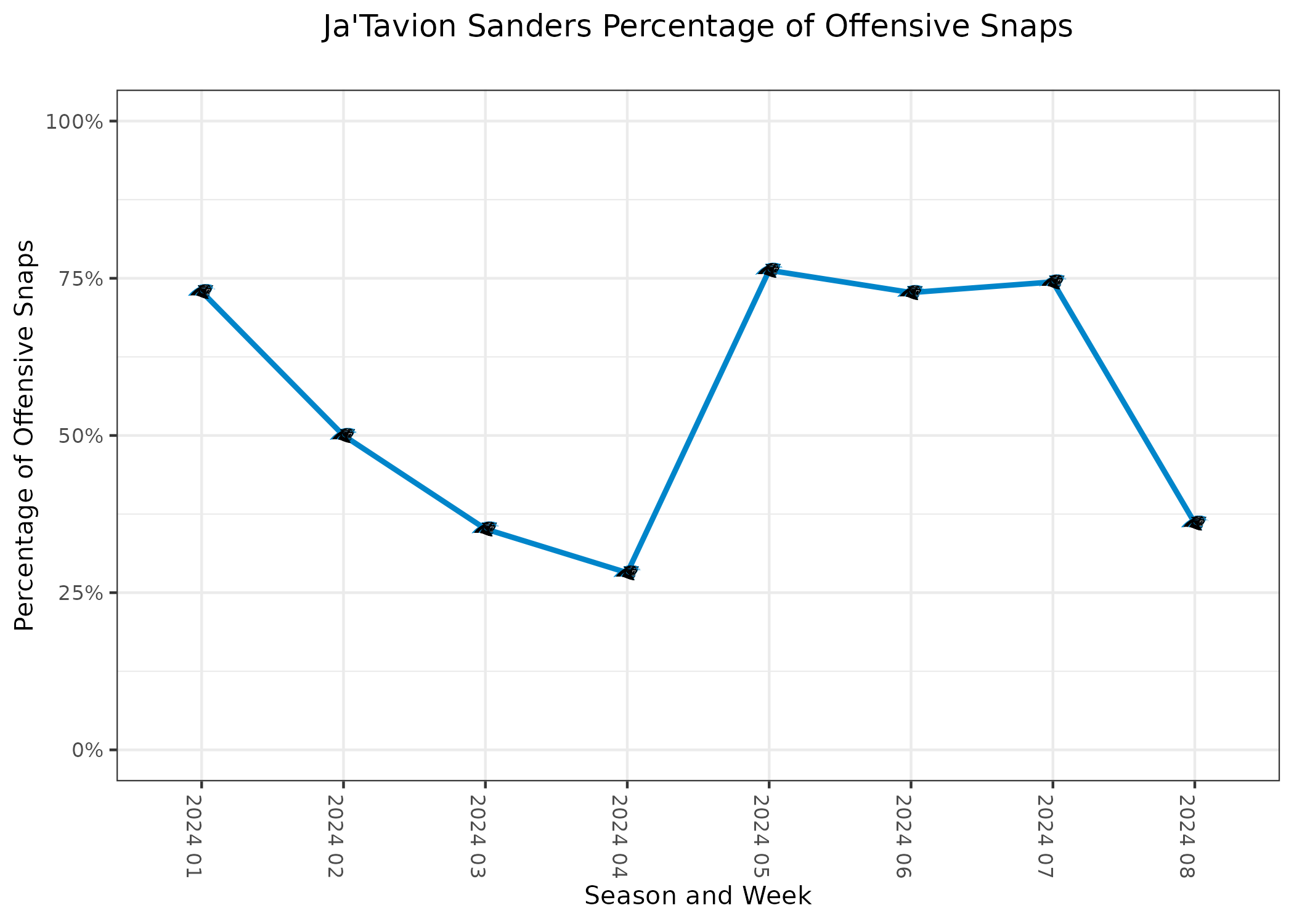
Broncos wide receiver room continues to change: Lil’Jordan Humphrey re-emerged as the No. 2 wide receiver.
Over the last two weeks, the Broncos have been in a pattern of Courtland Sutton and Humphrey playing in two-receiver sets for run situations, while Sutton, Troy Franklin and Devaughn Vele play in three-receiver sets and Marvin Mims Jr. occasionally mixes in.
This week, the Broncos started with Sutton and Humphrey as the primary wide receivers, while Mims was the clear third wide receiver. The other three quarters started to look a little more like the last two weeks, but we generally saw more of Humphrey and Mims and less of Franklin and Vele in this game. That was disappointing, considering Franklin and Vele are rookies who were playing relatively well and seemed like they should see more opportunities, if anything.
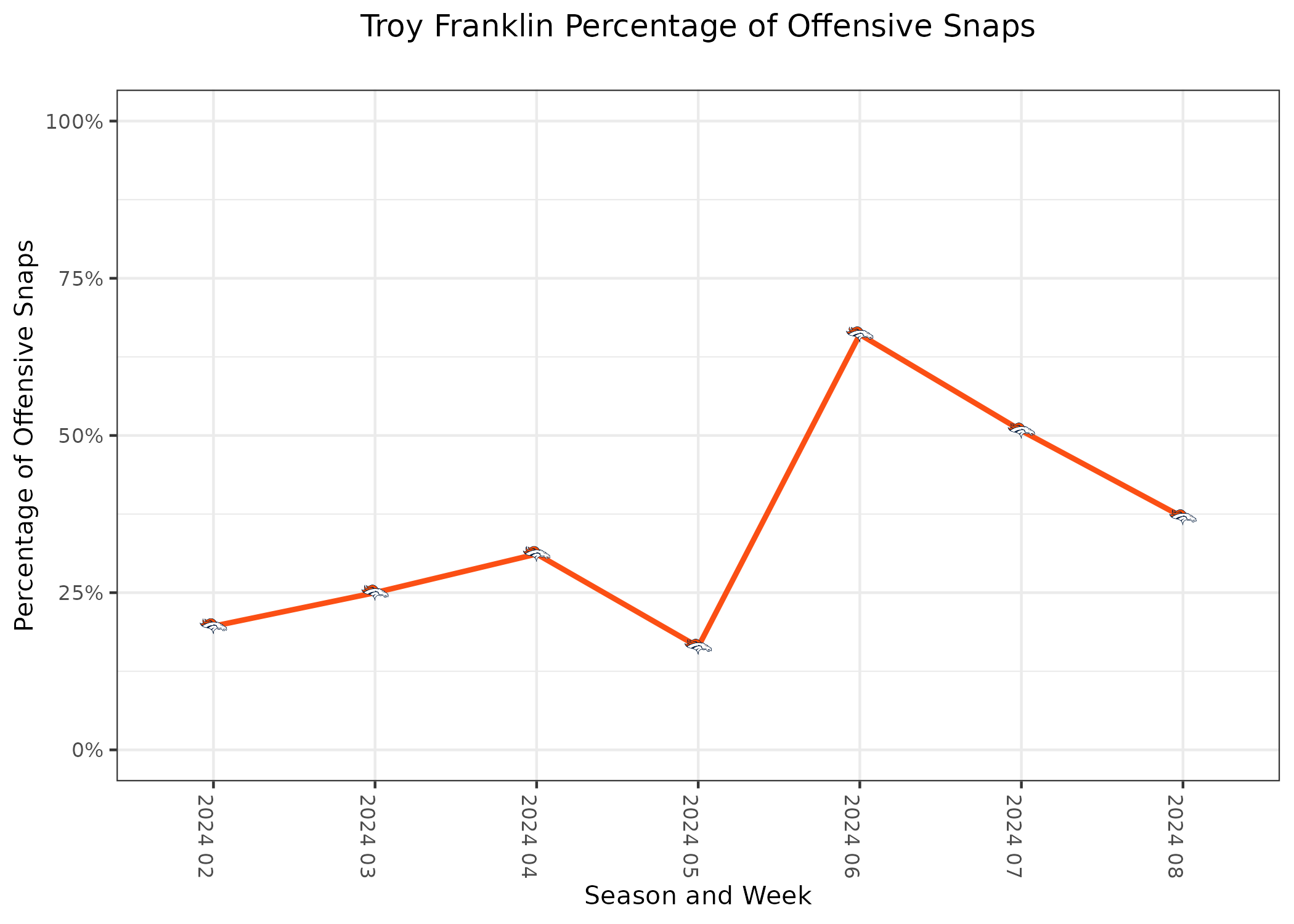
Miscellaneous Notes
- Panthers rookie running back Jonathon Brooks has practiced on a limited basis the last two weeks, but he hasn’t been activated to the 53-man roster yet. The Panthers have one more week before they have to activate him, or he will be out for the season.
- Broncos tight end Adam Trautman had the best game of his NFL career, but his role in the offense is the same as it’s been for the last two seasons. He’s a rotational player who plays a lot more in run situations than pass situations and only runs a handful of routes each week. His 81 routes this season are 47th-most for tight ends this season, despite the Broncos not having their bye week yet and Trautman being healthy for every game.
Kansas City Chiefs @ Las Vegas Raiders
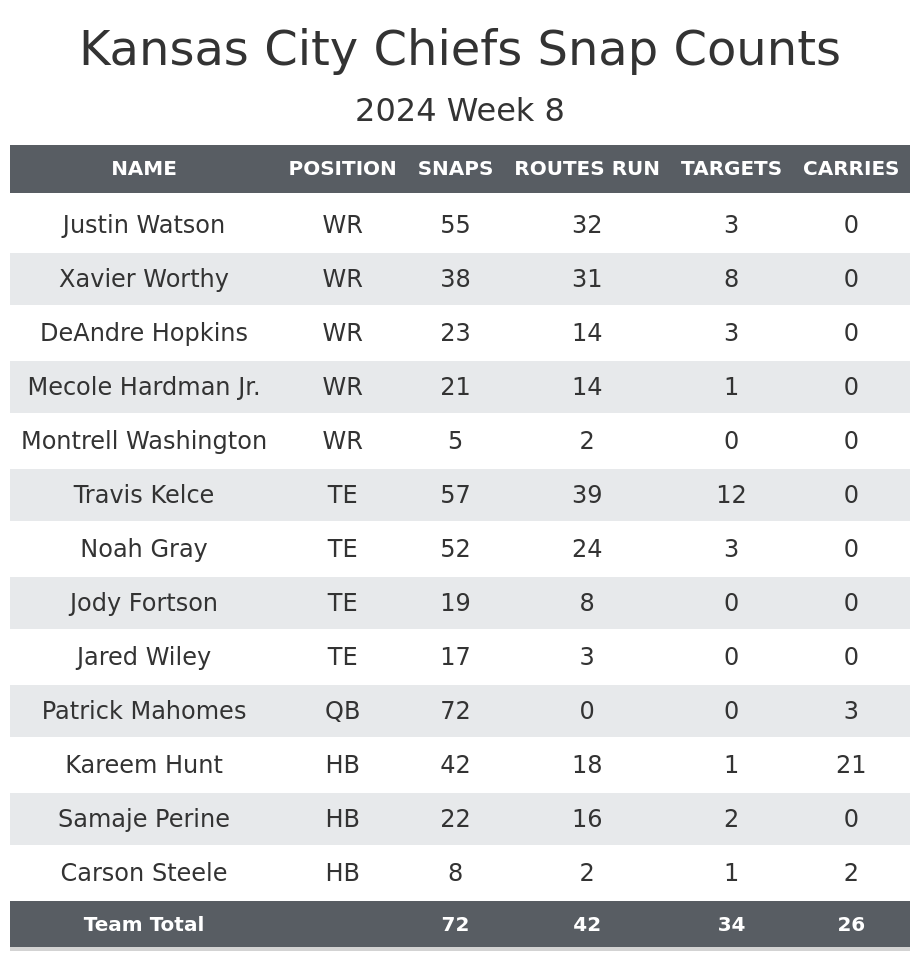
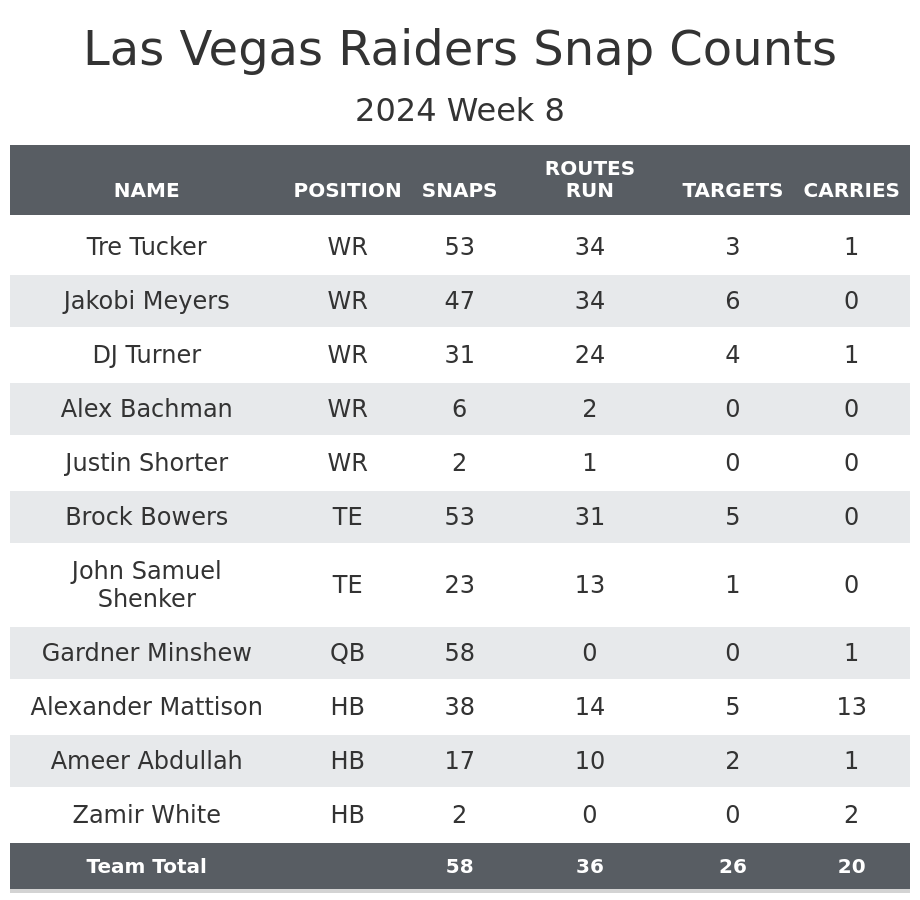
DeAndre Hopkins makes his Chiefs debut: Hopkins was traded to the Chiefs from the Tennessee Titans earlier in the week.
The Chiefs had a clear need at wide receiver with Rashee Rice out for the season and Hollywood Brown likely out for the year. Particularly this week, there was an additional need with JuJu Smith-Schuster out due to a hamstring injury. Skyy Moore recently started a stint on injured reserve.
Hopkins was primarily a rotational player in 12 personnel, playing 12 of a possible 25 snaps. In 11 personnel, the Chiefs typically used Justin Watson, Xavier Worthy and Mecole Hardman Jr. Hopkins only played eight of a possible 20 snaps from that group.
Hardman took the Rice/Smith-Schuster role as a primary slot receiver. Hopkins only played two snaps from the slot. Hopkins typically lines up on the line of scrimmage, but if anything, Watson was more the X receiver in this game. Worthy continued lining up all over the place like usual.
We can expect Hopkins to see more playing time in future weeks, and it will likely come at the expense of Watson and Worthy. Smith-Schuster should take the slot role back once he’s healthy, which could be very valuable for fantasy purposes. It might be hard for Hopkins to have as much fantasy value as many envision if he remains in a rotation and only plays on the outside. He caught two passes for 29 yards.
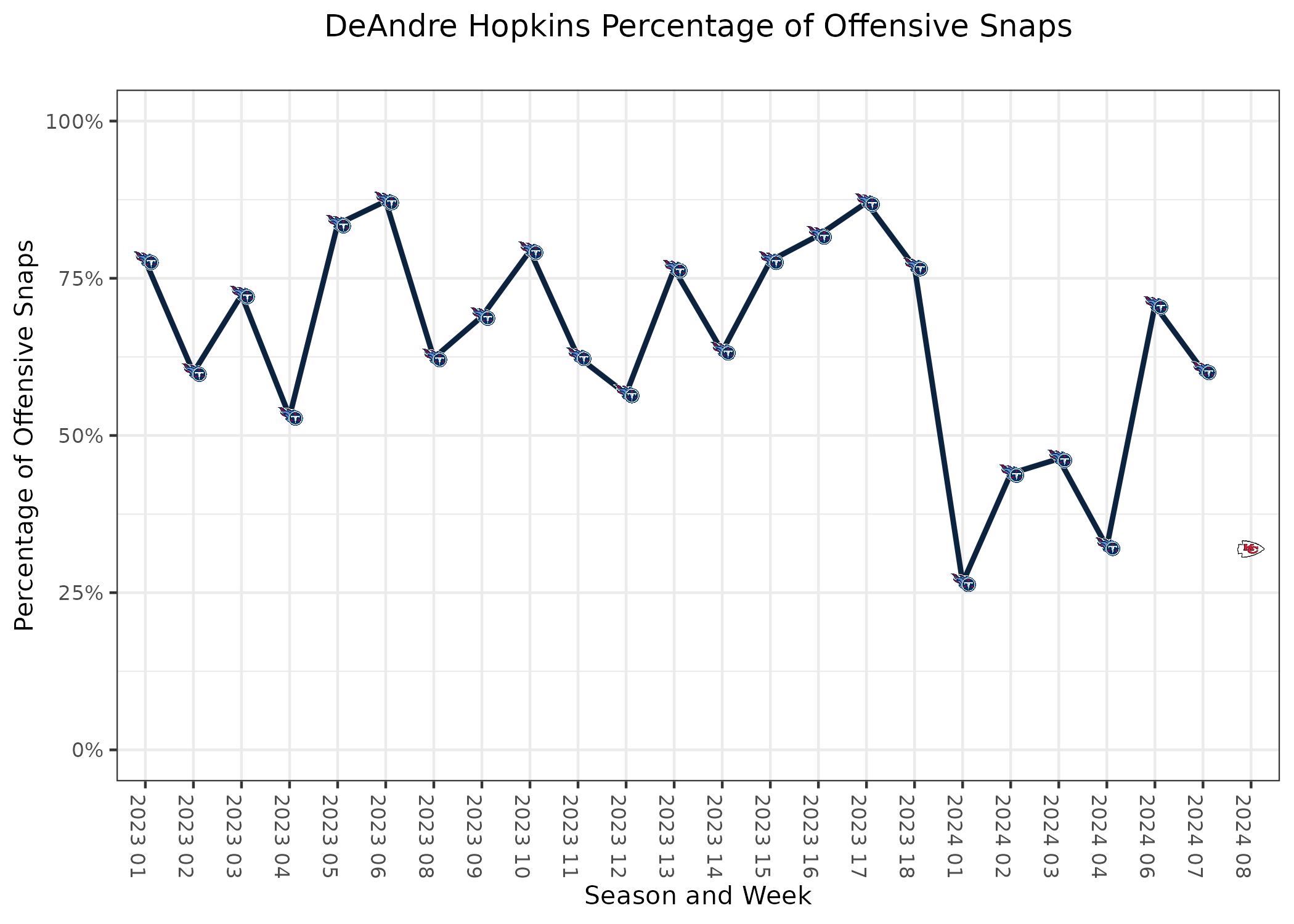
Jakobi Meyers returns: Meyers missed the last two games due to an abdominal injury.
Meyers is now the top wide receiver on the Raiders’ depth chart after Davante Adams‘ departure. He led the team in targets with six, and he caught each one.
His playing time was more limited than usual. He was playing in at least 92% of his team’s offensive snaps consistently. The vast majority of plays he missed were run plays, so that didn’t impact his fantasy production, and it’s likely he will play more once he’s closer to 100%.
Tre Tucker remained one of the starting receivers, while D.J. Turner returned to the third receiver spot. It’s unlikely any of the Raiders receivers will have consistent fantasy value, outside of Meyers and Brock Bowers.
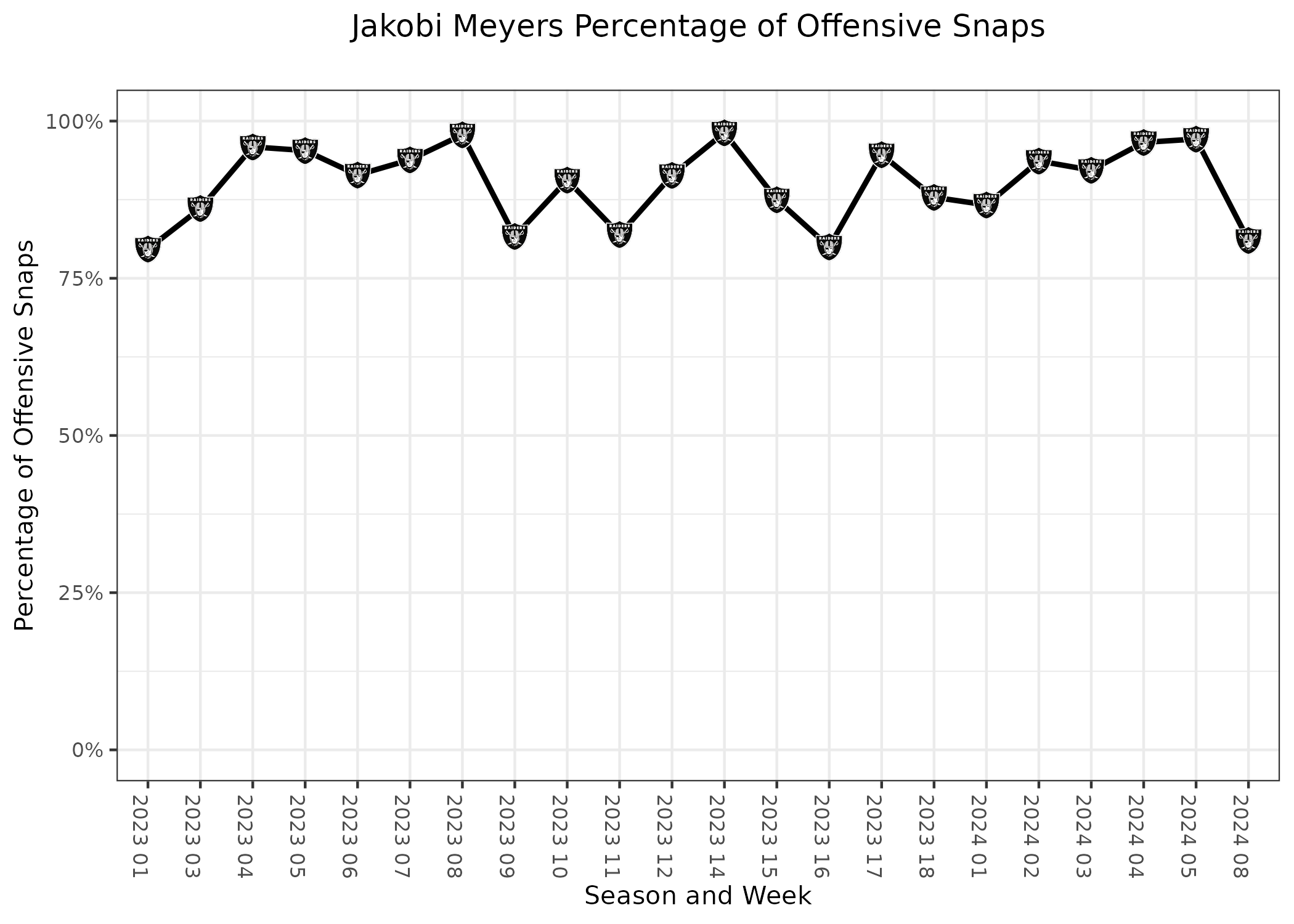
Miscellaneous Notes
- Zamir White did not appear on the injury report this week but was still limited to two offensive snaps. While it’s possible he gains more playing time next week after Alexander Mattison averaged 1.1 yards per carry, it’s also possible the Raiders stick with Mattison, give Ameer Abdullah or Dylan Laube a shot, or make a trade.
- Clyde Edwards-Helaire didn’t appear on the injury report this week but was again inactive. He may remain a healthy inactive going forward, especially with Isiah Pacheco potentially returning in the next month.
Chicago Bears @ Washington Commanders
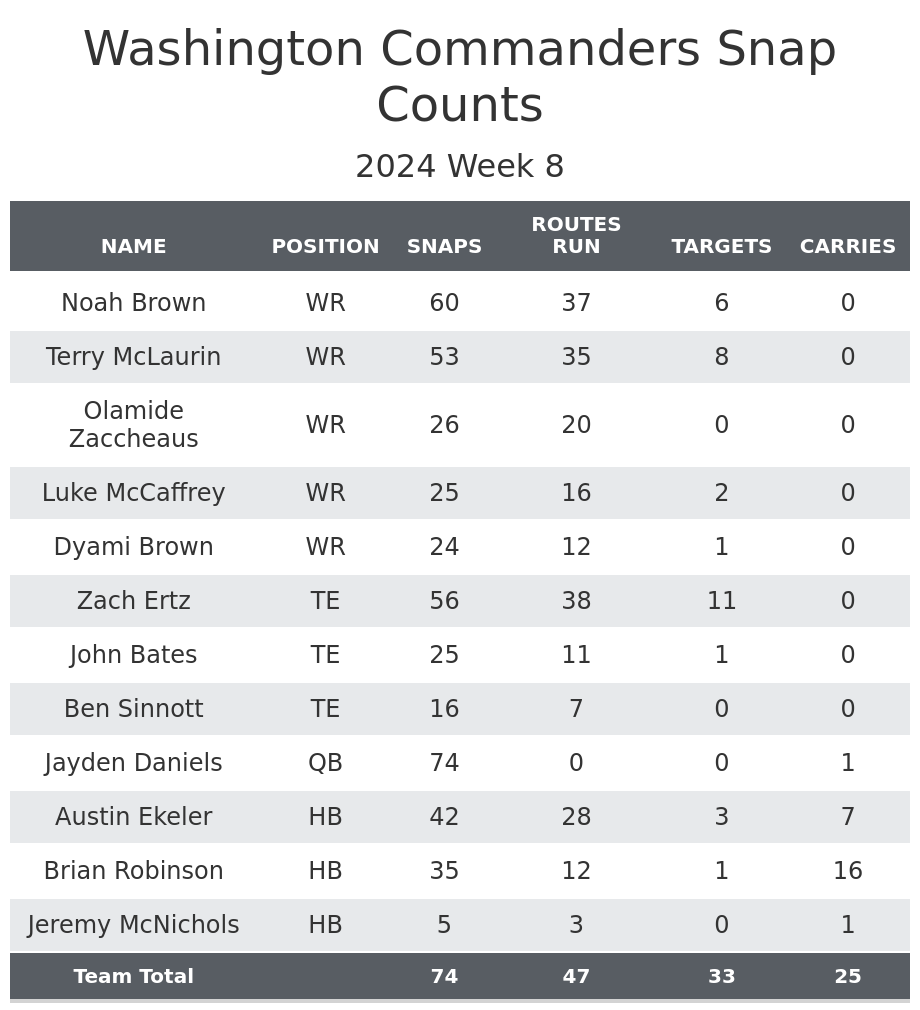
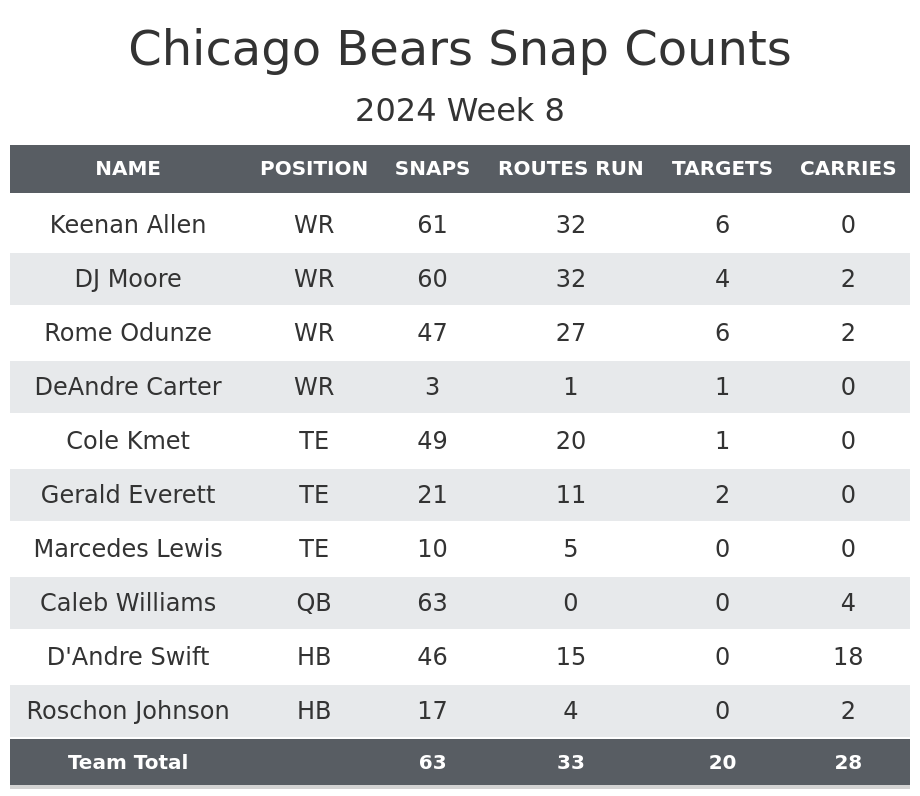
Cole Kmet rotates out more than usual: Kmet only ran a route on 60% of the Bears’ pass plays.
Kmet started the season as the second tight end in the passing game. Gerald Everett played 24 11 personnel snaps in Week 1 to Kmet’s 12. The Bears made a significant change for Week 2, as Kmet played 69% of the Bears’ 11 personnel snaps over Weeks 2-3. That jumped to 80% from Weeks 4-6.
This week, that fell back down to 70%. Most tight ends who play 70% of 11 personnel snaps play even more than 70% of their team’s pass plays because the player with 30% is usually more of a run-blocking tight end. In this case, Everett is specifically a receiving tight end.
Luckily, because Everett is a receiving tight end, Kmet is constantly on the field in 12 and 13 personnel. Kmet has two weeks as an elite fantasy tight end and five weeks outside of the top-16 fantasy tight ends. It was already hard to trust Kmet despite his high fantasy total on the season, and if this trend continues, it will be even harder to trust him.
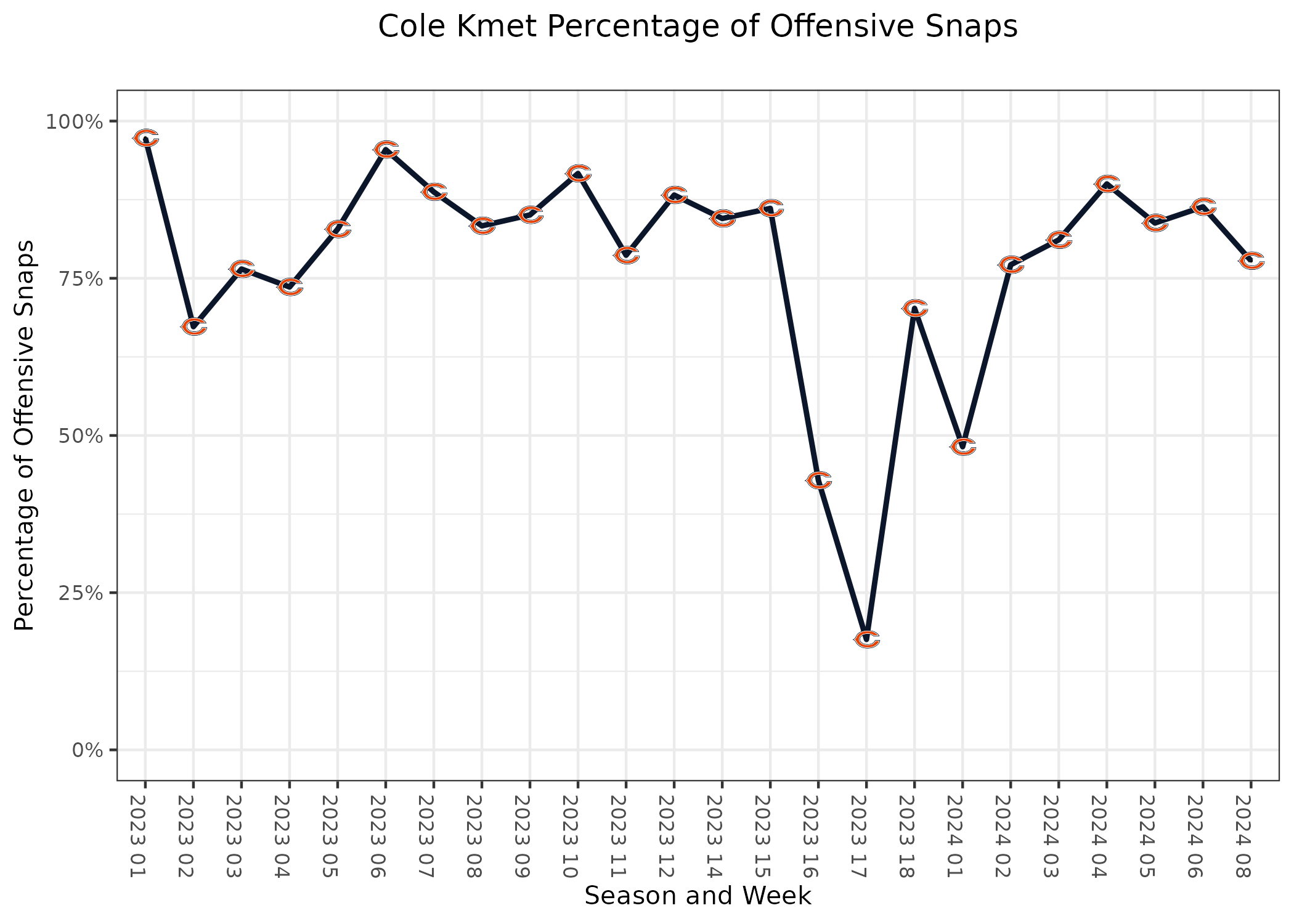
Brian Robinson returns to normal: Robinson didn’t appear on the injury report this week, allowing him to see a normal role in the offense.
Robinson missed significant playing time in Weeks 5 and 7 in addition to all of Week 6 due to a knee injury. This limited his carries, but his fantasy production remained fine because he scored three touchdowns over those three weeks.
This week, he was back to playing a clear majority of Washington’s early-down and short-yardage snaps. Austin Ekeler ended up leading the team in snaps, but that was largely because the Commanders found themselves in more passing situations than usual.
Robinson ran 16 times for 65 yards which was a fine performance. Once Jayden Daniels is closer to 100%, Robinson should be back to scoring more touchdowns. If anything, Robinson should be a buy-low option.
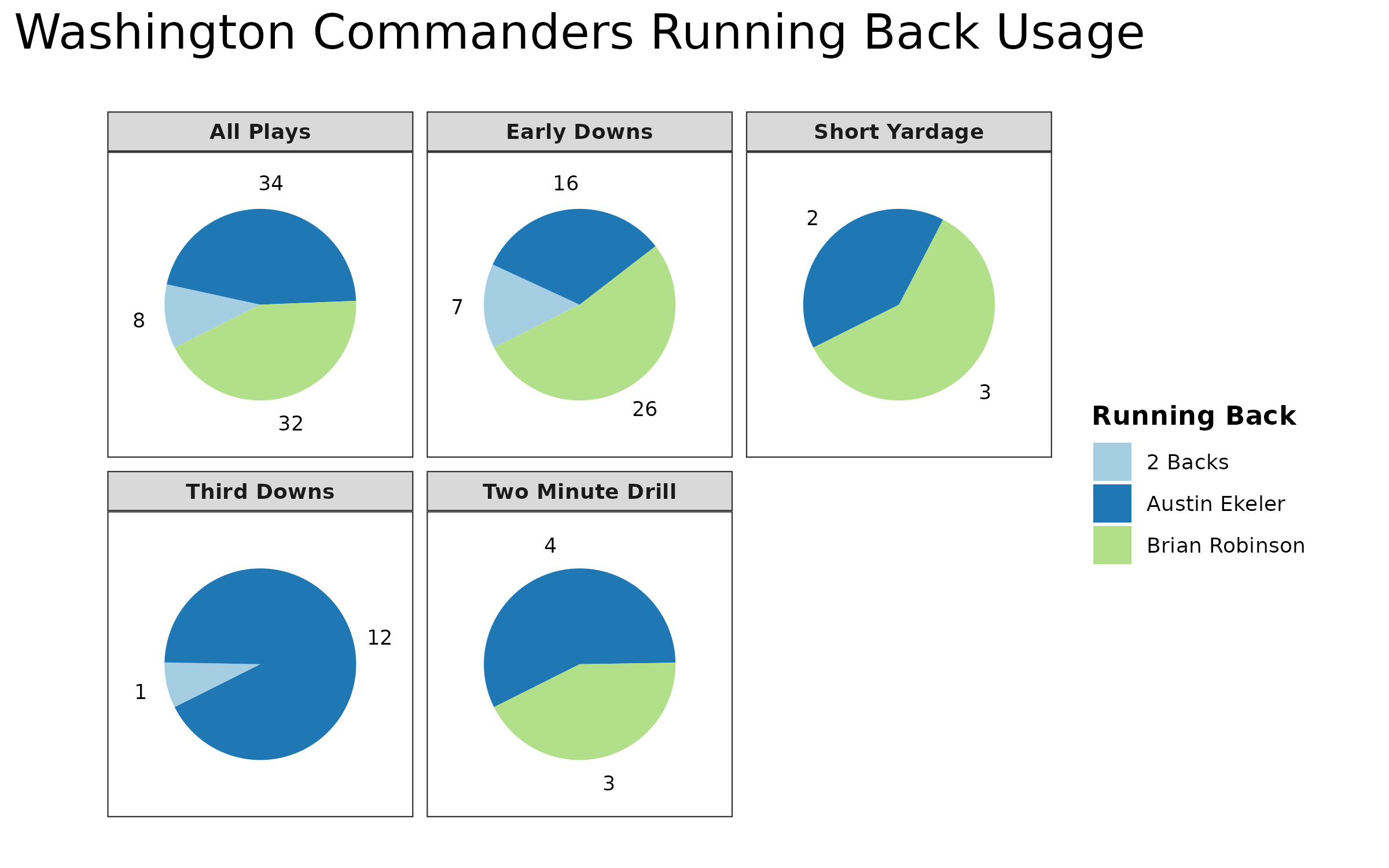
Miscellaneous Notes
- Travis Homer was activated for injured reserve for this game. He did not play an offensive snap but did lead Khalil Herbert to be a healthy inactive. There are very few teams that would consider trading for a running back right now unless there is a serious injury next week. Herbert seems to be the running back who is most likely to be traded if any do.
- Terry McLaurin has gained at least 90 receiving yards in four of his last six games. He only gained 90-plus receiving yards twice last season.
Dallas Cowboys @ San Francisco 49ers
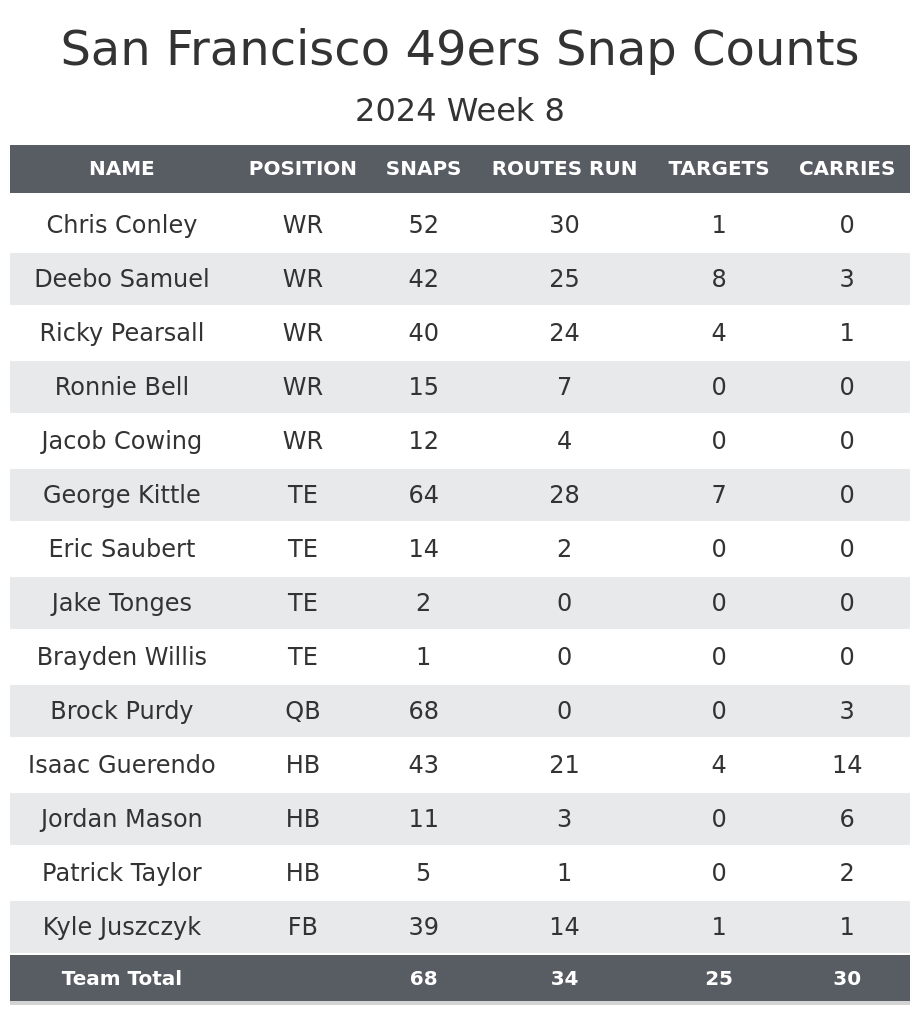
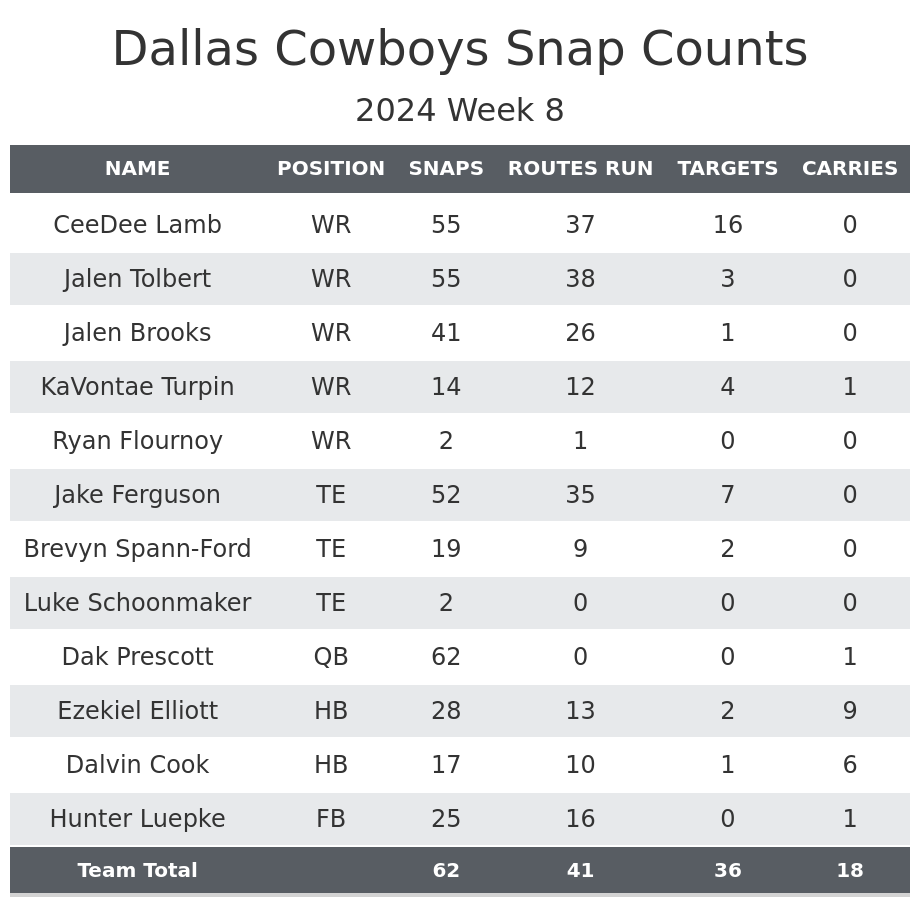
Ezekiel Elliott leads Cowboys backfield: Rico Dowdle was a surprise inactive, allowing Dalvin Cook to make his Cowboys debut.
Late last week, reports indicated that Dalvin Cook would be promoted from the practice squad to join the Cowboys’ running back rotation as the third option. However, just hours before kickoff, it was revealed that Rico Dowdle would be inactive due to an illness.
The Cowboys maintained their typical two-back rotation by drive, with Hunter Luepke handling passing situations. Usually, Dowdle leads the rotation, with Ezekiel Elliott joining on the second drive, but this week, Elliott took Dowdle’s role, and Cook stepped into Elliott’s usual spot.
Earlier this season, Deuce Vaughn occasionally took a few snaps during extended drives, which may provide some insight into how Cook would have been used had Dowdle been active. However, it remains uncertain until we see all three backs in action.
Ezekiel Elliott was steady, averaging 3.8 yards per carry, while Cook managed just 2.0 yards per carry. Without a noticeable impact from Cook, he may simply return to the practice squad. With the trade deadline approaching, the Cowboys are likely candidates to pursue another running back. For now, it’s reasonable to leave Cook on the waiver wire, and unless Dowdle’s illness proves more serious than expected, Elliott can stay on waivers as well.
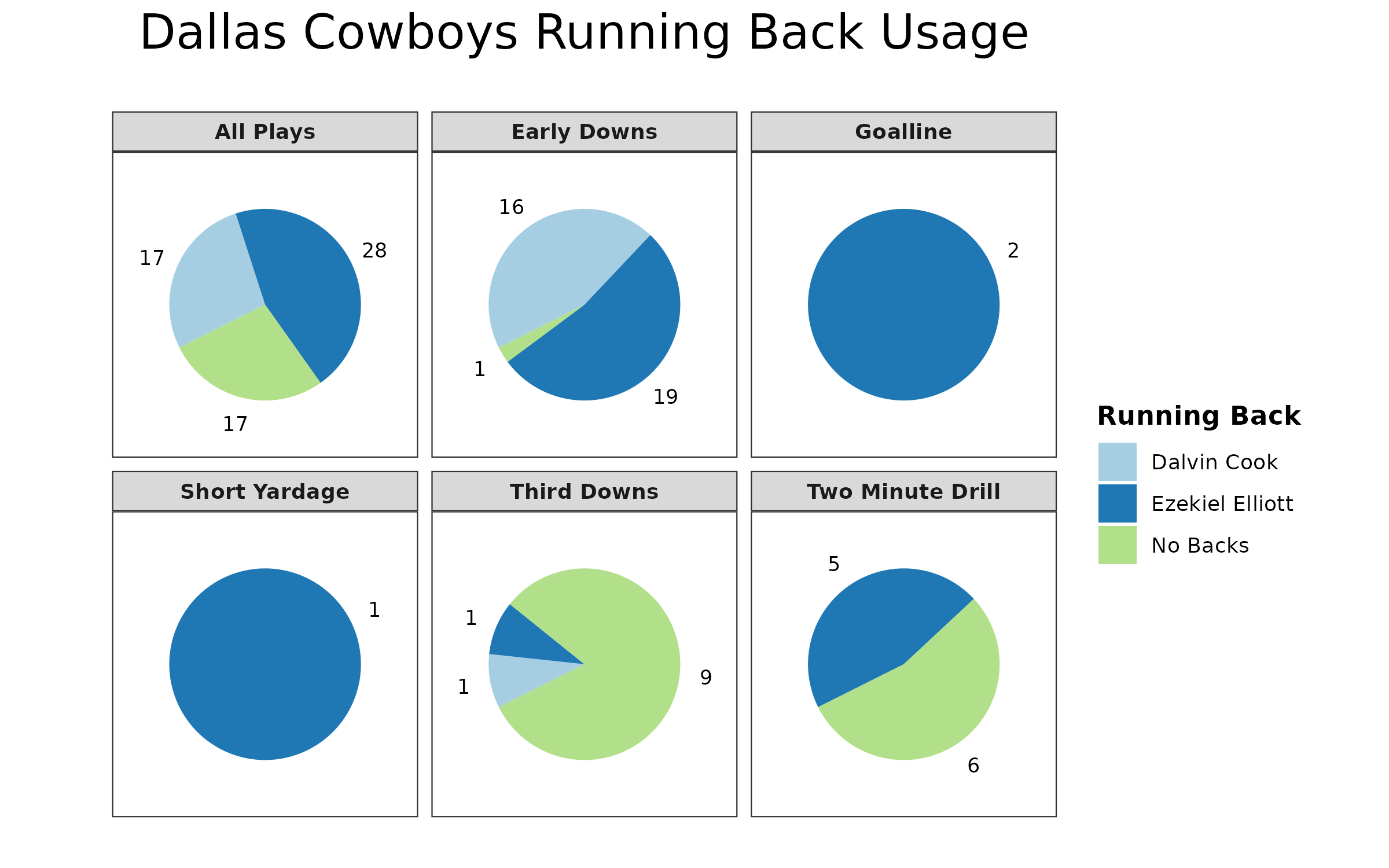
Monitor Jordan Mason’s health: Mason left the game in the second quarter because of a shoulder injury.
Mason exited last week’s game early with a shoulder injury. After limited practices on Wednesday and Thursday, he fully participated on Friday and was cleared to play without an injury designation. He took snaps on the first drive, but Isaac Guerendo assumed most of the workload on the second drive. Mason returned briefly on the third drive but didn’t play after that.
For the remainder of the game, Guerendo took the majority of snaps, only giving way to Kyle Juszczyk on some third downs. Guerendo performed well in Mason’s absence, while Patrick Taylor saw action only in the final six minutes when the 49ers led by 10 points.
Guerendo would normally be a high-priority waiver-wire target after such a performance, but he’s unlikely to start soon. The 49ers’ upcoming bye week allows Mason additional recovery time, and Christian McCaffrey is expected to return post-bye. Guerendo would only see a start if both backs are unavailable.
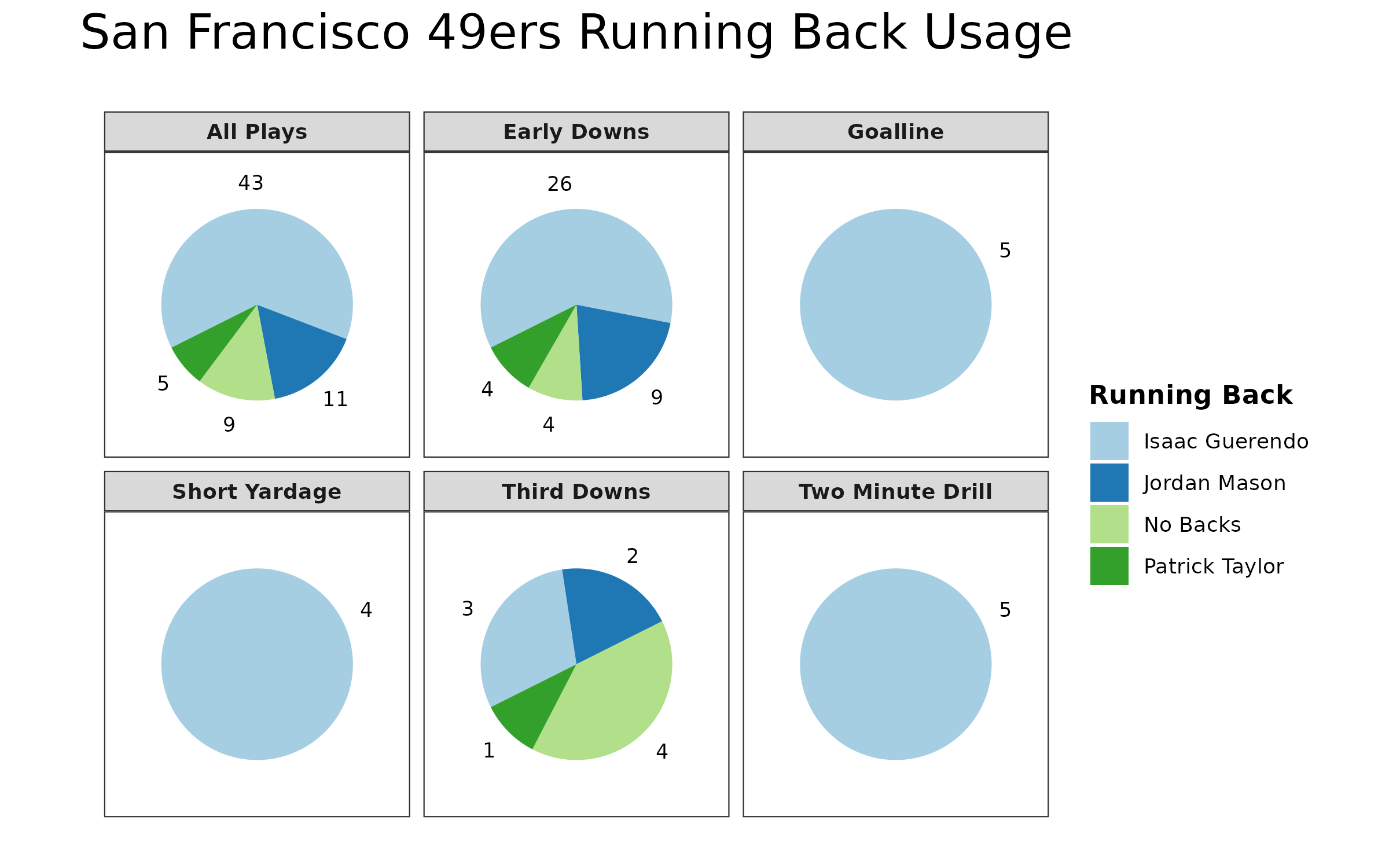
49ers adjust to life without Brandon Aiyuk: The 49ers’ star wide receiver is out for the season
The 49ers were also without slot receiver Jauan Jennings, who is nursing a hip injury.
The 49ers filled Brandon Aiyuk and Jauan Jennings’ roles by slotting Chris Conley into Aiyuk’s position and rookie Ricky Pearsall into Jennings’. This arrangement worked smoothly, as the offense leaned on the run game, with most targets going to George Kittle and Deebo Samuel. Pearsall had an impressive second game, recording four catches for 38 yards and breaking out for a 39-yard run.
Although Samuel was reportedly dealing with illness, a wrist injury, and later a rib issue, he saw his usual workload until late in the game, when he left for the medical tent. With the 49ers running the ball to close out the game, Pearsall took over as the second outside receiver.
Looking ahead, the 49ers’ receiver rotation could shift once Jennings returns. Ideally, Samuel, Jennings, and Pearsall would become the top three wideouts, but neither Samuel nor Pearsall has taken on an increased role as the X receiver. Jennings might see more X snaps in three-receiver sets, or Conley could continue in a prominent role, limiting the fantasy potential for both Jennings and Pearsall if they’re competing for slot snaps. Should Samuel’s rib injury prove serious, Conley, Jennings, and Pearsall would become the primary receivers.
Despite the uncertainty around playing time, Pearsall is still a worthwhile waiver add. As a high draft pick performing well early on, he could earn more opportunities as the season progresses.
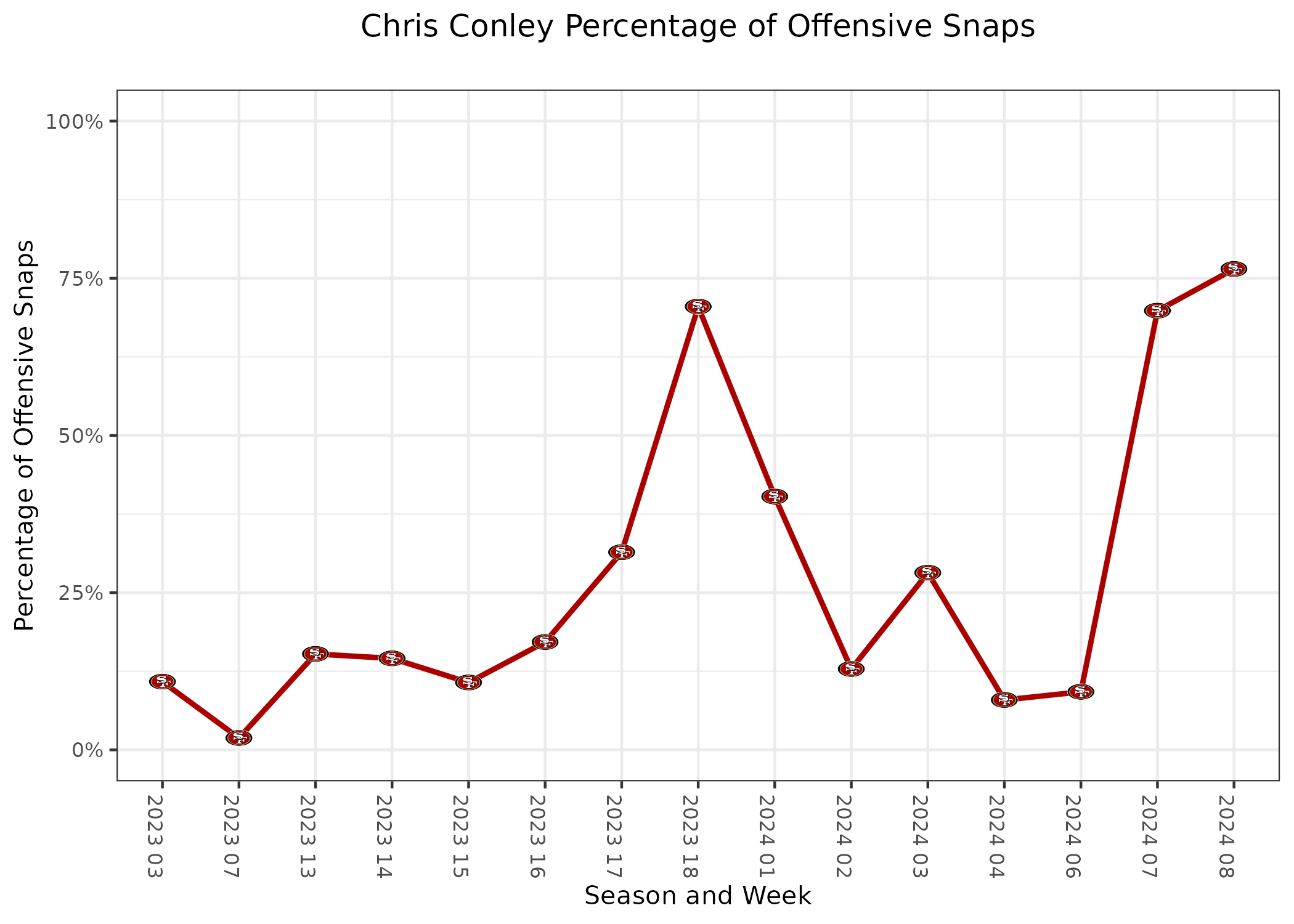
Miscellaneous Notes
- George Kittle was questionable for this game with a foot injury, but that did not impact his playing time or production. He’s been the best fantasy football tight end this season.
- Jake Ferguson caught six passes for 23 yards and finally played over 80% of offensive snaps, similar to his standard at the end of last year.
Table Notes
- Snaps include plays called back due to penalties, including offensive holding or defensive pass interference. The other three stats have these plays removed.
- Targets may differ from official NFL sources. The most likely discrepancy would be from a clear thrown-away pass, where the NFL may give the target to the nearest receiver, while this data will not.
- Carries are only on designed plays. Quarterback scrambles won’t count for the total number of carries in the game.
Related
NFL star intends to make shock return to football after…
By JAKE FENNER Published: 14:06 GMT, 8 March 2025 | Updated: 14:06 GMT, 8 March 2025 After
New York Jets Launch Year Three of NFL Girls Flag…
The New York Jets are delighted to announce the return of its highly successful Jets NFL Girls Flag league in London ahead of International Women's Day.
MOCK DRAFT WATCH: Interior OL emerges as top pick for…
Trevor Sikkema, Pro Football Focus: James Pearce Jr., Edge, Tennessee Why: Pearce had an incredibly impressive combine showing in the speed drills,
Shedeur Sanders places blame on media, says perceived drop in…
Former Colorado quarterback Shedeur Sanders opted out of throwing passes at last week's NFL Scouting Combine. He did, however, travel to Indianapolis and condu










